

Prince George Welcomes
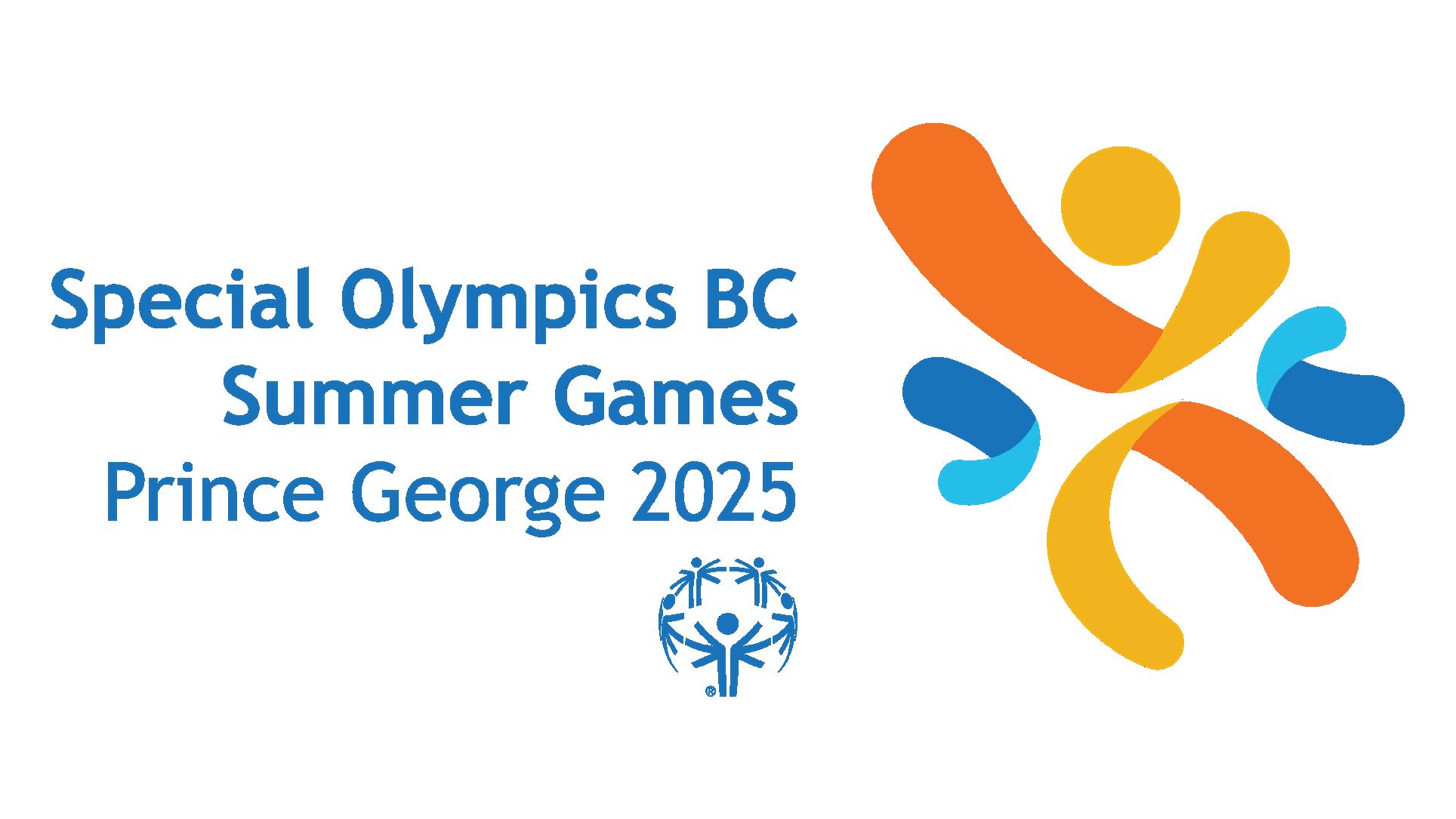
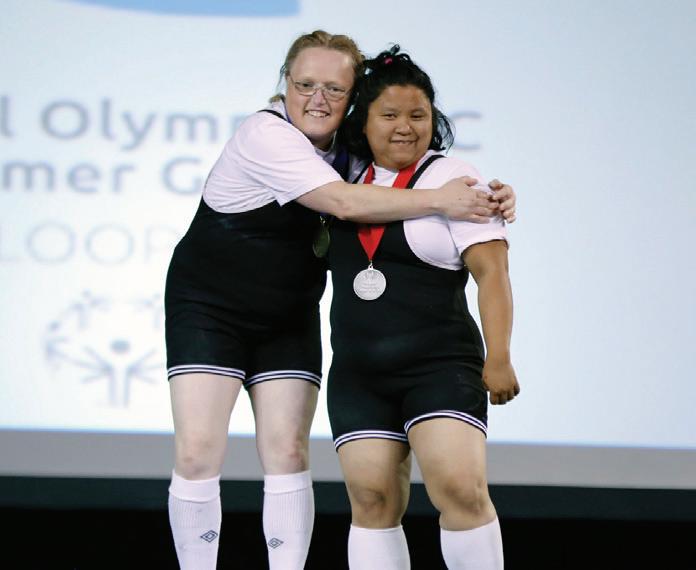
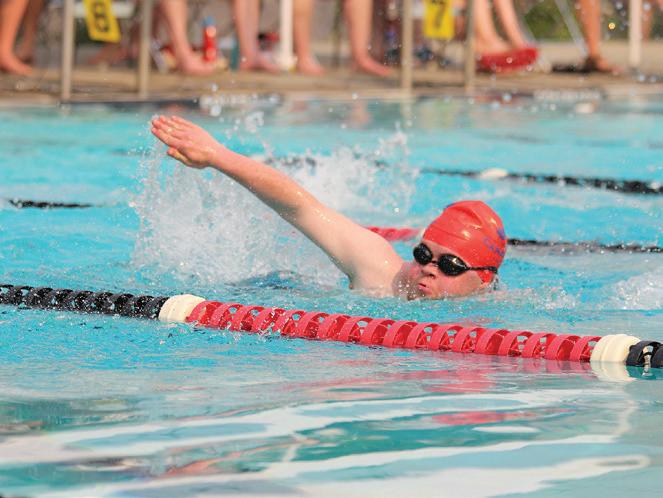
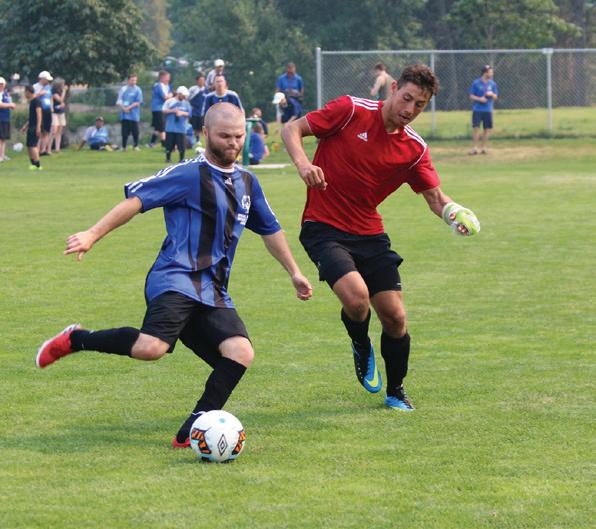
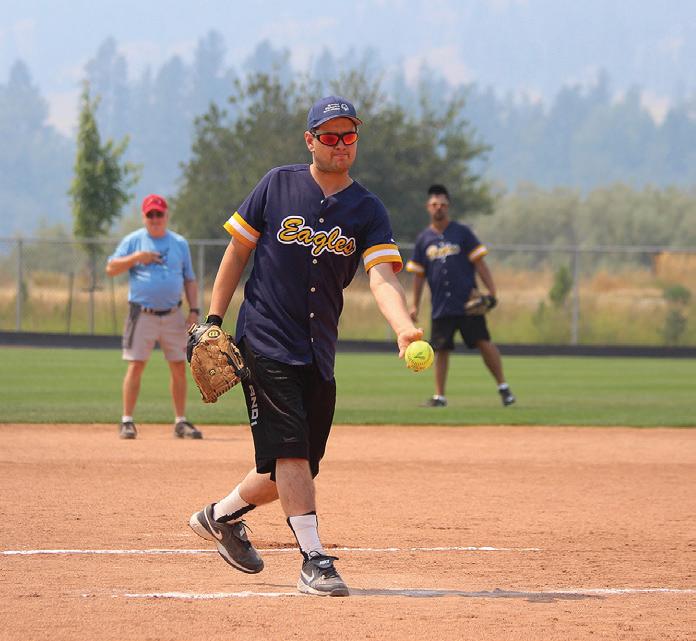
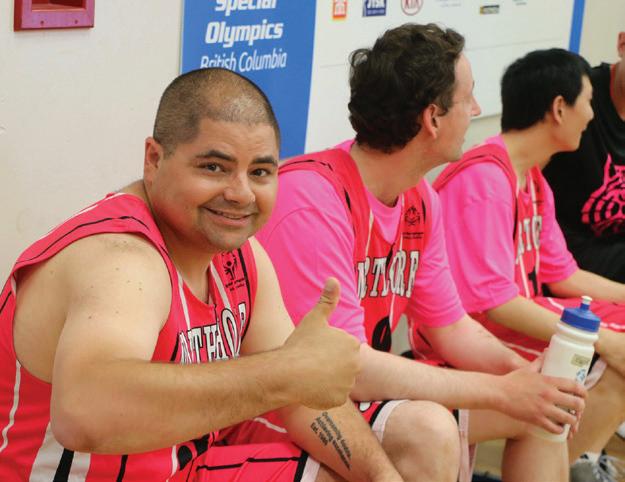
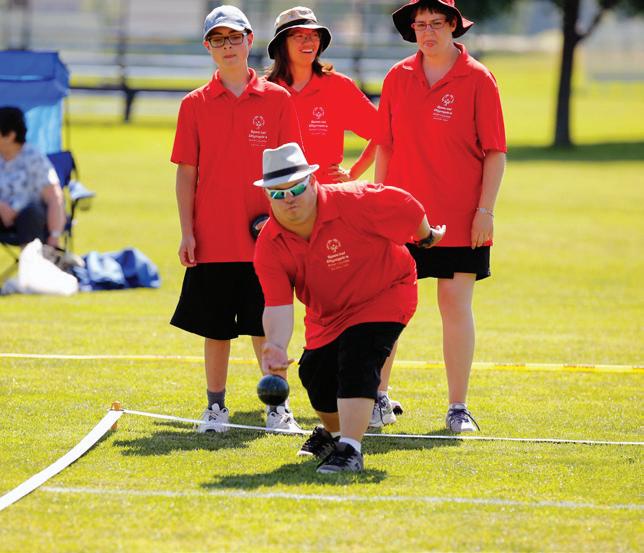
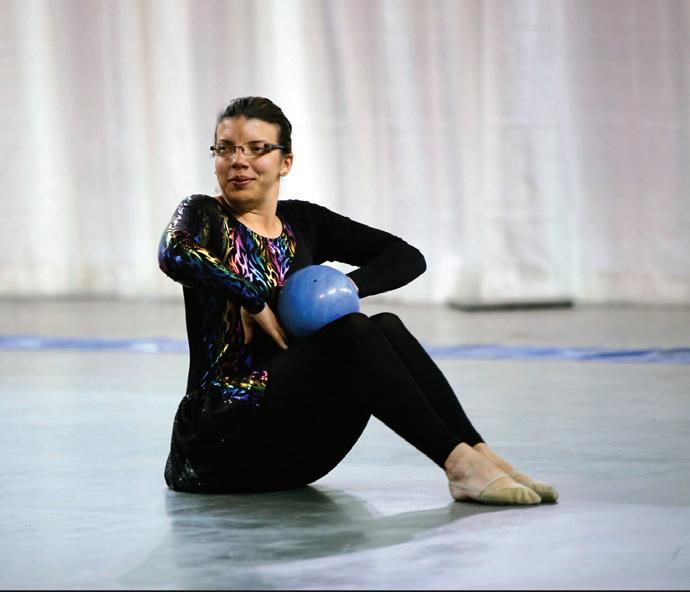
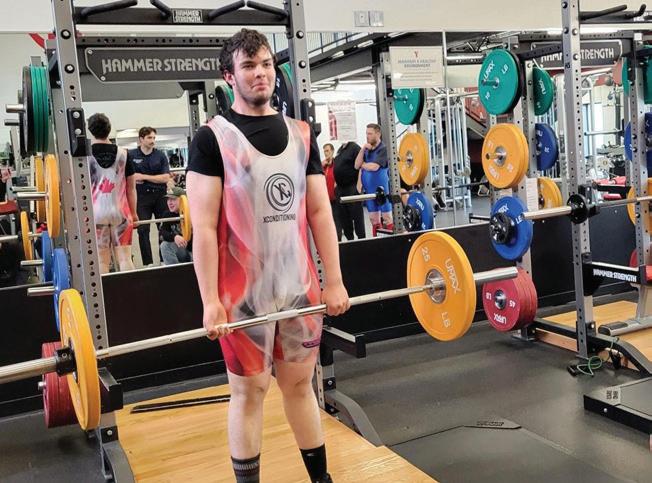
July 10-12
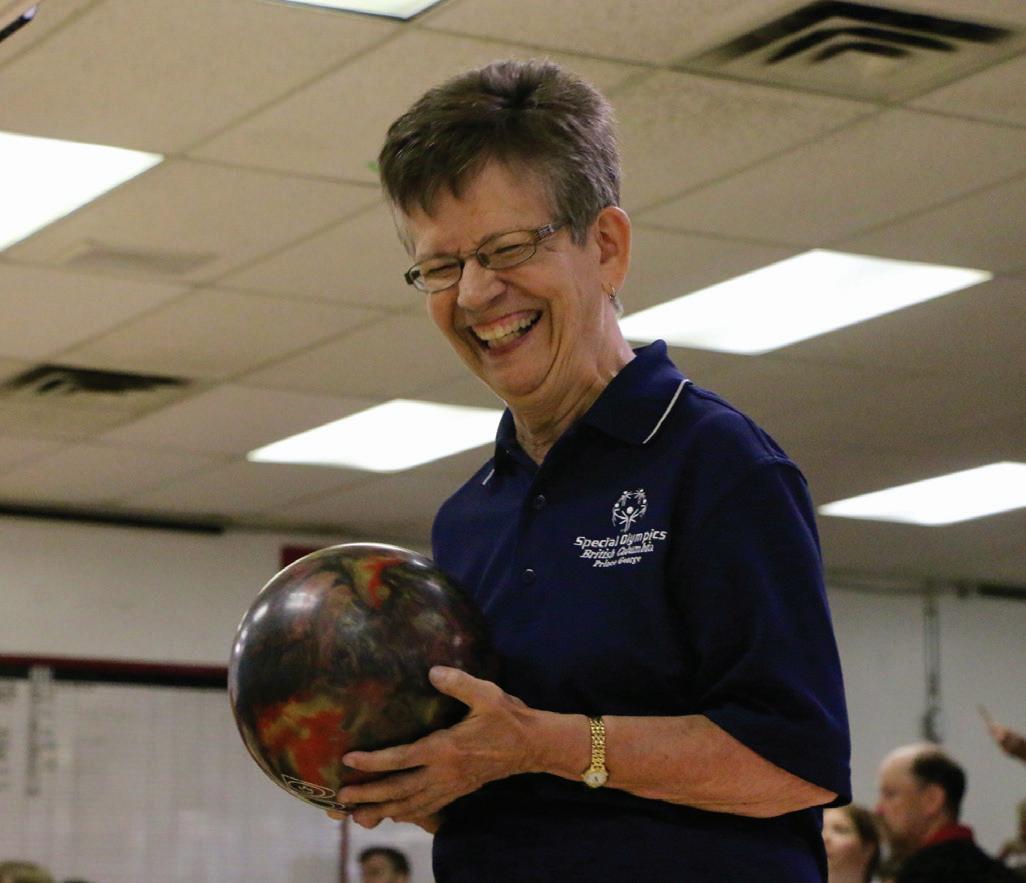

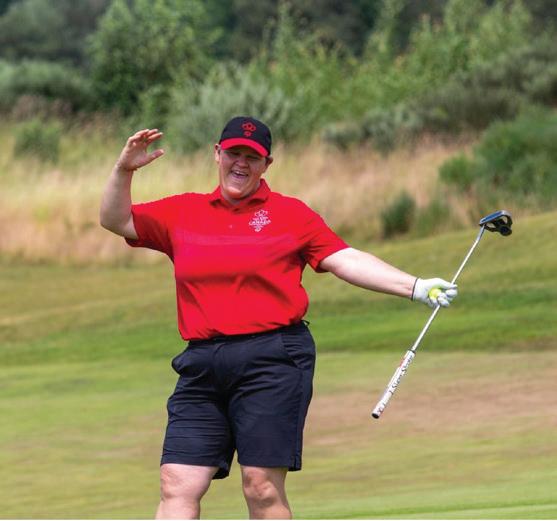
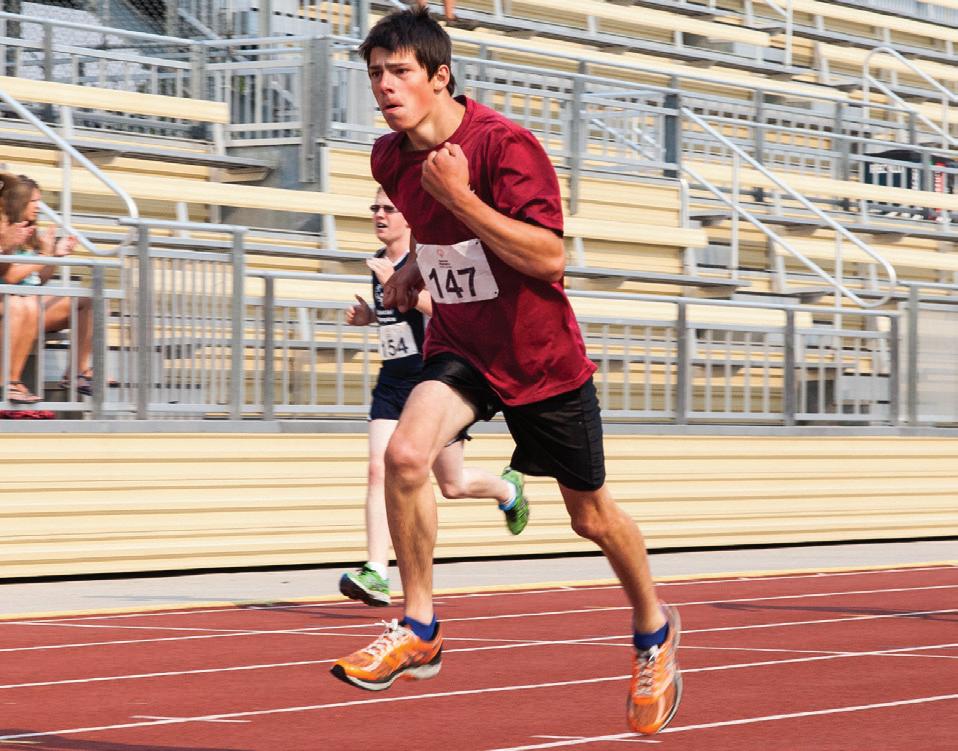

Welcome Athletes Coaches, Support Staff & Volunteers
Greetings from the SOBC Games Co-Chairs
By Renee McCloskey and Lyn Hall
It’s our great pleasure to pay tribute to the Prince George community for the incredible response we have experienced to help make the 2025 Special Olympics BC Summer Games possible. And it’s a thrill to welcome the 1,200 athletes with intellectual disabilities and dedicated volunteer coaches and mission staff who will come together from all parts of the province. The 2025 SOBC Summer Games team members are coming to us from 46 different communities, from Creston in the southeast to Prince Rupert in the northwest, from Victoria and all parts of the Island to across the Okanagan and Lower Mainland. We know you will all represent their hometowns with pride, and we are delighted to welcome you to ours!
It’s a privilege to have these Games
take place on the traditional territory of the Lheidli T’enneh First Nation, and be inspired by the spirit of coming together like the waters of the Nee Incha Koh, the “river with strong undercurrents,” and the Ltha Koh, the Big Mouth River.
This community has truly shown up for the 2025 Special Olympics BC Summer Games. Hundreds of volunteers have signed on with passion and purpose, and sponsors and donors have chosen to give generously, all united in the goal of providing an outstanding Special Olympics BC Games experience in Prince George. We are very proud of and grateful for the response of this amazing community. Thank you for stepping forward to show that our friends and neighbours with intellectual disabilities matter to you, and to
play an important part in offering an outstanding Games experience to our visitors from across the province. Throughout the weeks and months leading to this moment, our goal has been to host the best Special Olympics BC Games ever. We fully believe this goal will be realized this week, thanks to our incredible community, and thanks to the remarkable dedication of the 2025 Special Olympics BC Summer Games Organizing Committee. The Games Organizing Committee members are all volunteers who have contributed countless hours of their skills, caring, and vision to bring this experience to life. They have prioritized the athletes at the heart of everything they have planned, and they have done everything they possibly could to ensure Prince George is represented with
Welcome from the SOBC Games Athlete Ambassadors
Hello to all of Prince George, and to all the 2025 Special Olympics BC Summer Games athletes, volunteers, and supporters!
We are so excited to welcome all of the Special Olympics BC athletes and volunteers who will be coming to our hometown from across the province. This is the first time in eight years that Special Olympics BC summer sports athletes and coaches will come together for provincial competition. This opportunity is very important to us, and we can’t wait.
We are local Special Olympics BC – Prince George athletes who will compete at the 2025 SOBC Games, and we are also members of the Games Organizing Committee. In our Athlete Ambassador role, we have helped share information and excitement throughout the community to help support the SOBC Games. We have also
shared advice from our perspective as athletes to help plan the Games events and operations. Along with all of the dedicated volunteers on the Games Organizing Committee, we have been working hard to make these the best SOBC Games ever.
We would like everyone to know that Special Olympics athletes take our sports seriously. We love our sports, and we work hard at them. We take ourselves and our coaches seriously. We train hard, multiple times a week, every week. Special Olympics is not just a one-time event. It’s weekly programs where we train hard.
We also want everyone to know that Special Olympics is important. All three of us participate in eight or nine different Special Olympics sport and fitness programs year round, so we train in Special Olympics practices multiple evenings every single week. Special
Olympics is a really important source of friendship, skill building, and community. And Special Olympics is important to help us be active and healthy. We would love to welcome other athletes with intellectual and developmental disabilities to get involved in Special Olympics, especially younger athletes. In Special Olympics, we are part of a community that sees us for our abilities, helps us be our best, and builds inclusion and respect. We don’t want anyone else to be alone in darkness. Come join us in Special Olympics and let your brilliance shine!
We hope everyone will watch what the Special Olympics BC Games athletes can do, and then get involved in the year-round Special Olympics sport, youth, and health programs in Prince George and 55 communities across the province. New athletes, volunteers, and supporters are always welcome to
pride. A warm round of applause goes out to these inspiring members of our community.
To the amazing Special Olympics BC Summer Games athletes and team members – we absolutely cannot wait to watch you shine here in our community, on and off the fields of play. To the families and fans cheering on the athletes in person and from home – we thank you for your vital part in their journey to this moment of empowerment and joy. To all the volunteers and sponsors – you are difference makers and leaders of inclusion, and we thank you with all our hearts. It’s time for the best Special Olympics BC Games ever! Let’s do this, Prince George! Come cheer on these incredible athletes throughout the events July 10 to 12!
join Special Olympics to change lives, including your own!
We would like to thank the whole Prince George community for supporting the Special Olympics BC Summer Games, especially all of the generous volunteers, sponsors, and donors who have stepped forward to make this important experience possible. Thank you for giving us the opportunity to shine in provincial competition and spotlight our abilities!
We would also like to recognize all our friends and all the incredible volunteers and supporters involved with Special Olympics BC – Prince George’s year-round programs. This community means so much to us, and we treasure all the opportunities we have together. We invite all of Prince George to be part of something great with us! Bring on the Games and be inspired by Special Olympics athletes!
By Chase Caron, Adam Spokes, and Marinka VanHage

Welcome from Chief Dolleen Logan - Lheidli T’enneh First Nation
On behalf of Lheidli T’enneh’s elders, youth, my Council colleagues, and the many members throughout our traditional territories, we are excited to welcome the athletes, coaches, families, friends and the hundreds of volunteers to Prince George for the 2025 Special Olympic B.C. Summer Games.
While we prepare to celebrate the tremendous work of the athletes competing, as the host Nation for these games, it is our pleasure to provide some history of the Lheidli T’enneh, and the lands which represent our traditional, ancestral and unceded territory.
The Lheidli T’enneh is a community built on and around the strength of its people. T’enneh literally means “The People”. They are a sub-group of the “Dakelh” people whose traditional
territory includes the city of Prince George, British Columbia. The name “Lheidli” means “The People from the Confluence of the River” in the Carrier language, referring to how the Nechako River enters the Fraser River. The rivers spoken of are the Nee Incha Koh which means “river with strong undercurrents” and the Ltha Koh, the Big Mouth River.
Lheidli T’enneh elders, teachers, drummers and other artists pass on their traditions and teachings to the next generation, keeping their culture alive and strong. The Lheidli T’enneh and our communities are built on the strength, guidance and leadership provided by our elders and on the passion, innovation and motivation of our youth to move forward in positive ways and change the world.
Thank you, Prince George
By Dan Howe, Special Olympics BC President
Special Olympics BC’s vision is that sport will open hearts and minds towards people with intellectual disabilities and create inclusive communities all across British Columbia. With all the skill, care, and passion that Prince George has put into hosting the 2025 Special Olympics BC Summer Games, this community is leading the way to help make that vision a game-changing reality.
On behalf of the Special Olympics BC community, I would like to applaud and thank all the athletes and volunteer coaches and mission staff who have worked so hard over weeks, months, and years to reach the 2025 Special Olympics BC Summer Games. You inspire everyone with your talent, determination, and heart. Everyone is so excited to cheer for you as you give your all on and off the fields of play in Prince George!
I would like to thank the generous Prince George sponsors and volunteers who have chosen to be part of the 2025 SOBC Summer Games and change lives and communities through the power and joy of sport. Thank you for your powerful show of inclusion and respect for people with intellectual disabilities.
Also, I send a huge thank you to our 2025 SOBC Games Co-Chairs Lyn Hall and Renee McCloskey, and their whole incredible team on the organizing committee. Special Olympics BC is so grateful for their comprehensive and inspiring vision, their emphasis on the athlete experience, and their passion for inclusion. They have certainly done all that anyone could ask to realize the goal of hosting the best SOBC Games ever, and we are all so thankful. Sincere thanks to Special Olympics BC’s passionate and generous provincial
We were often called the Tanoten which means “people a little to the north.” As a people, our Nation aspires to move ahead as an organized, highly motivated, determined and self-reliant Nation. Consisting of over 900 members, we represent a proud, united peoples whose purpose is to ensure a future that will provide better quality of life while flourishing within our environment. Our traditions and cultural beliefs are the driving force of our success and destiny.
As partners in our community, we believe in working collaboratively to further opportunities that enhance the cultural, economic, environmental, and healthcare outcomes for everyone in our community and region. Lasting partnerships and relationships have been created with a diverse
cross-section of community organizations and businesses; helping secure our future for years to come. These partnerships, like our territories, represent a bedrock for keeping our cultural practices secure with our youth through the profound work of the Lheidli T’enneh Elders Society. We hope you will enjoy your time in Prince George, including the opportunity to visit the many sites of importance to our community, like the Ancient Forest.
Best of luck to everyone participating in the 2025 Special Olympics B.C. Summer Games. You’ve made so many people proud of your dedication and drive.
Mussi, Chief Dolleen Logan Lheidli T’enneh First Nation
sponsors and donors, who contribute significant funds, awareness, and caring to ensure Special Olympics athletes throughout B.C. have empowering opportunities in our year-round programs as well as events like Provincial Games. I would like to extend deep and lasting thanks to Special Olympics BC – Local Coordinator Peter Goudal, who has truly gone above and beyond in his roles both with the SOBC – Prince George programs and in serving on the SOBC Games Organizing Committee. Peter has contributed countless hours of caring, insightful efforts and leadership in a wide range of roles, all with a positive spirit and inspiring passion for the people and possibilities of Special Olympics.
Peter and the SOBC – Prince George Local Committee deserve our heartfelt thanks, along with all the volunteer coaches in this community, for gener-
ously contributing their time and talents to make year-round sport, youth, and health programs possible for the athletes with intellectual disabilities in this community, as well as supporting the SOBC Games. Thank you all so much for choosing to share your valuable energies with Special Olympics, and making the world a better, more inclusive place.
Please visit specialolympics.bc.ca during and anytime after the SOBC Games to learn about the rewarding experiences that await you in our year-round sport, youth, and health programs.
As athlete John Franklin Stephens once wrote, “Come join us at Special Olympics. See if you can walk away with your heart unchanged.”

Welcome to the 2025 Special Olympics BC Summer Games
From Mayor Simon Yu and Prince George City Council
Welcome to the 2025 Special Olympics BC Summer Games
From Mayor Simon Yu and Prince George City Council
Dear Athletes, Coaches, Families, Volunteers, and Honoured Guests,
On behalf of City Council and the citizens of Prince George, it is with heartfelt joy and great civic pride that we welcome you to the 2025 Special Olympics BC Summer Games.
There are times in the life of a community when something truly special takes place, something that transcends sport and speaks to the very soul of who we are. Hosting these Games is one of those rare moments. For Prince George, this is not just another event, it is a celebration of inclusion, perseverance, and the boundless potential of the human spirit.
Over the next few days, more than 1,200 athletes with disabilities, along with their coaches, mission staff, families, and supporters, will come together from 46 communities across British Columbia to compete, connect, and shine. We are humbled and honoured to be your host city.
Prince George has always believed in the power of sport to inspire, to unite, and to uplift. Our community has a long and proud history of welcoming
provincial, national and international athletic events. Most notably, we hosted the 2015 Canada Winter Games, an unforgettable experience that brought the entire country’s attention to our region and showcased the warmth, energy, and capability of our people. That same spirit of hospitality and excellence is alive today, stronger than ever, as we open our arms to the Special Olympics BC community.
But while we have hosted many important events, these Games are especially meaningful. The Special Olympics movement represents more than sport, it represents dignity, respect, and the celebration of every individual’s unique gifts. It reminds us what matters most: belonging, compassion, and courage.
Prince George is built on these values. Located on the traditional and unceded territory of the Lheidli T’enneh First Nation, our city sits at the confluence of two powerful rivers, where people have gathered for thousands of years. “Lheidli” means “where the two rivers flow together,” and how fitting that today, athletes, volunteers, and families from all across B.C. come together here, flowing together in spirit and purpose. Along with the first nations , “we pride ourselves on being the gath-
ering place for North Central BC.”
We are especially proud of the incredible community response to these Games. Hundreds of local volunteers have signed on with passion, businesses have stepped up with generous support, and local leaders have worked tirelessly to ensure every detail contributes to an unforgettable experience. This response reflects the true heart of Prince George: a place where neighbours care for one another, where we lift each other up, and where we celebrate the strength of our diversity.
To the athletes: You are the heart of these Games. Your determination, discipline, and sportsmanship inspire everyone around you. Your courage sets an example that reaches far beyond the field of play. We are cheering you on, not just for your achievements, but for the joy and authenticity you bring to every challenge.
To the coaches and mission staff: Your leadership and dedication are a gift to the athletes and to this province. Thank you for the countless hours you have invested in preparing these teams, not only for competition but for life.
To the families and supporters: Your presence is powerful. Behind every
athlete is a circle of love, support, and belief, and we see and honour that in you.
And to our volunteers, sponsors, and organizing committee: Thank you for embodying what it means to serve with heart. You are the quiet heroes of this event, and your efforts have brought this vision to life in the most beautiful way.
As we gather for the 2025 SOBC Summer Games, let us remember that this is more than a sporting event. It is a declaration of who we are and who we strive to be, as individuals, as a city, and as a society. A place where inclusion is not just spoken but lived. A place where everyone is valued. A place where every person, regardless of ability, is given the opportunity to succeed.
Welcome to Prince George. May your time here be filled with moments of triumph, friendship, laughter, and lifelong memories.
Let the Games begin and let your light shine.
With pride and gratitude, Mayor Simon Yu and Members of Prince George City Council



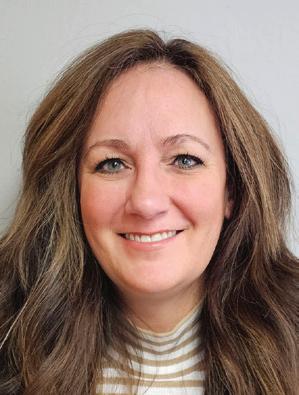
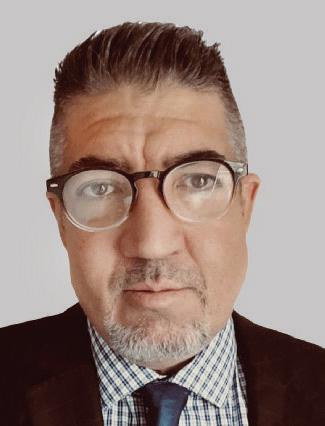

Calendar of Events
Fill the stands to be inspired by Special Olympics athletes letting their brilliance shine! All events are free to attend, no tickets required! All schedules subject to change – please visit www.SOBCGames.ca for most current information.
WEDNESDAY
July 9
Event: Law Enforcement Torch Run Final Leg for the 2025 Special Olympics BC Summer Games
• Start: 10 a.m., Prince George RCMP Detachment
• End: approx. 12 p.m., CN Centre
• Cheer on law enforcement members and Special Olympics athletes as they run the Flame of Hope across Prince George to raise awareness and funds for Special Olympics, and prepare to light the 2025 SOBC Games cauldron on July 10!
THURSDAY
July 10
Event: Opening Ceremony
• Location: CN Centre
• Start: 7:30 p.m.
• Everyone is encouraged to attend and cheer for the Special Olympics BC summer sports teams that are so excited to come together from across the province for the first time since 2017! Join us for an evening of entertainment and inspiration!
• SOBC Games merchandise sales on site 6 to 9:30 p.m.
FRIDAY
July
11
Sport: 10-Pin Bowling
• Location: Strike Zone
• Competition: Shift One 9a.m. to 12p.m.
Shift Two 1 to 4 p.m.
Sport: Basketball
• Location: Duchess Park
• Competition: 10 a.m. to 5 p.m.
Sport: Bocce
• Location: Rotary Soccer Field
• Competition: 10 a.m. to 4 p.m.
Sport: Golf
• Location: Aspen Grove Golf Course
• Competition: 9 a.m. to 4 p.m.
Sport: Powerlifting
• Location: CN Centre
• Competition: 10 a.m. to 2 p.m.
*Note: Powerlifting competition on July 11 only
Sport: Rhythmic Gymnastics
• Location: Prince George Conference & Civic Centre
• Competition: 9 a.m. to 3 p.m.
• Medal Ceremonies: 3 p.m.
Sport: Soccer
• Location: Rotary Soccer Field
• Competition: 9 a.m. to 3 p.m. (projected end time TBD based on divisioning)
Sport: Softball
• Location: Carrie Jane Gray Fields
• Competition: 8 a.m. to 6 p.m.
• Medal Ceremonies (Softball Skills): 1 p.m.
Sport: Swimming
• Location: Prince George Aquatic Centre
• Competition: 8 a.m. to 5:30 p.m.
• Medal Ceremonies: 1:15-2 and 5:45-6:30 p.m.
Sport: Track and Field
• Location: Masich Place Stadium
• Competition: 9 a.m. to 3:30 p.m.
• Medal Ceremonies: 12:30-1:15 and 3:30-4 p.m.
Activity: Special Olympics Healthy Athletes
Screenings
• Friday access for Games athletes only; participation coordinated within sport schedules
Activity: SOBC Games Merchandise Sales
• Location: Civic Centre
• Time: 12 to 8 p.m.
SATURDAY
July 12
Sport: 10-Pin Bowling
• Location: Strike Zone
• Competition: Shift One 9 a.m. to 12 p.m.,
Shift Two 1 to 3 p.m.
• Medal Ceremonies: Civic Centre, 4 p.m.
Sport: Basketball
• Location: Duchess Park
• Competition: 8 a.m. to 1:30 p.m.
• Medal Ceremonies: 2 p.m.
Sport: Bocce
• Location: Rotary Soccer Field
• Competition: 9 a.m. to 3 p.m.
• Medal Ceremonies: 3 p.m.
Sport: Golf
• Location: Aspen Grove Golf Course
• Competition: 9:30 a.m. to 3 p.m.
• Medal Ceremonies: 3 p.m.
Sport: Powerlifting
• Location: CN Centre
• Competition: 10 a.m. to 2 p.m.
*Note: Powerlifting competition on July 11 only
Sport: Rhythmic Gymnastics
• Civic Centre
• Competition: 7:45 a.m. to 2 p.m.
• Medal Ceremonies: 2:15 p.m.
Sport: Soccer
• Location: Rotary Soccer Field
• Competition: 9 a.m. to 2 or 3 p.m. (projected end time
TBD based on divisioning)
• Medal Ceremonies: At conclusion of competition
Sport: Softball
• Location: Carrie Jane Gray Fields
• Competition: 7:30 a.m. to 3:30 p.m.
• Medal Ceremonies: At conclusion of competition
Sport: Swimming
• Location: Prince George Aquatic Centre
• Competition: 8 a.m. to 4:30 p.m.
• Medal Ceremonies: 1-1:30 and 4:30-5:30 p.m.
Sport: Track and Field
• Location: Masich Place Stadium
• Competition: 9 a.m. to 2:30 p.m.
• Medal Ceremonies: 12:30-1 and 3-4:30 p.m.
Activity: Special Olympics Healthy Athletes Screenings
• Location: Civic Centre
• Open to all individuals with intellectual and developmental disabilities 9 a.m. to 4 p.m. –all are welcome to access free, fun health education and giveaways in a welcoming, supportive setting!
• Games athlete participation coordinated within sport schedules
Activity: Civic Centre Medal Ceremonies for Powerlifting, Rhythmic Gymnastics, Bowling
• Location: Civic Centre
• Powerlifting Medals: 9:30 a.m.
• Rhythmic Gymnastics Medals: 2:15 p.m.
• Bowling Medals: 4 p.m.
Activity: SOBC Games Merchandise Sales
• Location: Civic Centre
• Time: 9 a.m. to 8 p.m.
Activity: Victory Dance – for SOBC Games participants only, no public access

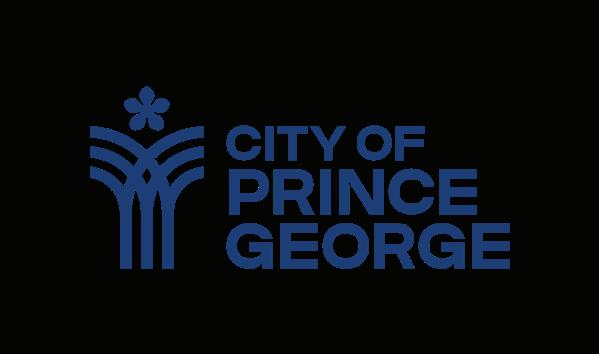

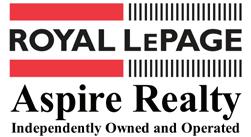
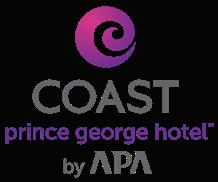





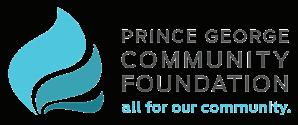
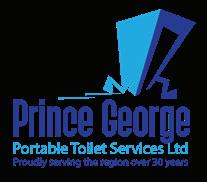





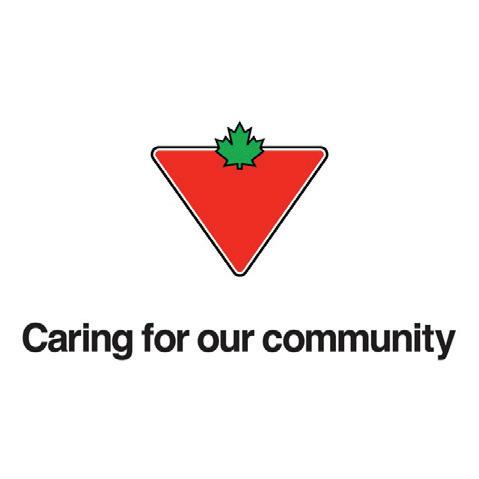

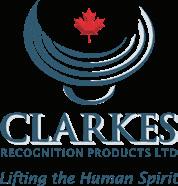














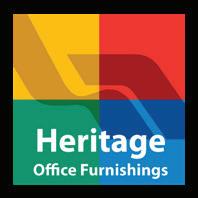


Local Athlete Spotlight
Barbara Conway
Prince George
10 Pin Bowling
Carol West
Prince George
10 Pin Bowling
Cindy Komoski
Prince George
10 Pin Bowling
Debbie Bileck
Prince George
10 Pin Bowling
Emilie Snyders
Prince George
10 Pin Bowling
Gregory Cole
Prince George
10 Pin Bowling
Gregory Eveneshen
Prince George
10 Pin Bowling
Kelvin Westerman
Prince George
10 Pin Bowling
Linda Renner
Prince George
10 Pin Bowling
Michael Harris
Prince George
10 Pin Bowling
Sean Demers
Prince George
10 Pin Bowling
Timothy Jolicoeur
Prince George
10 Pin Bowling
Adam Spokes
Prince George Basketball
Audrey Nelson
Prince George Basketball
Chase Caron
Prince George Basketball
Joshua Mehrassa
Prince George Basketball
Matteus Cordeiro
Prince George Basketball
Tegan Raines
Prince George Basketball
Adrian Rosen
Prince George Bocce
Isaac Goudal
Prince George Bocce
Ruth Caldwell
Prince George Bocce
Tara Chiasson
Prince George Bocce
Daniel Lafreniere
Prince George Golf
Joshua Pudney
Prince George Golf
Rita Cavenaile
Prince George Golf
Levi Fowler Fort St John Golf
Diana Bramble
Prince George Powerlifting
Leif Skuggedal
Prince George Powerlifting
Samuel Russell
Prince George Powerlifting
Angela Hills
Prince George Rhythmic Gymnastics
Darcie Muzychka
Prince George Rhythmic Gymnastics
Michaela Samsonoff
Prince George Rhythmic Gymnastics
Brooklyn Sherba
Prince George Swimming
Carla Caputo
Prince George Swimming
Dallas Poole
Prince George Swimming
David Dunn
Prince George Swimming
Marinka VanHage
Prince George Track & Field
Randella Willier
Prince George Track & Field
Spencer Rourke
Prince George Track & Field
Tyler LeFebvre
Prince George Track & Field
Martin Scriver Quesnel Basketball
Scott Jonasson Quesnel Basketball
Angie McNiff Quesnel Golf
Cherie Swaan Quesnel Golf
Greg Lindstrom Quesnel Golf
Matthew Hender Quesnel Golf
Robert Beiswanger Quesnel Golf
Cheyanne Wards Quesnel Rhythmic Gymnastics

Local Athlete Spotlight
Aaron Allinson Quesnel Swimming
Jacob McKenzie Quesnel Swimming
Paulette Prosk Quesnel Swimming
Tyler Kent Quesnel Swimming
Bailie Gemmell Quesnel Track & Field
Candice Valois Quesnel Track & Field
Clayton Bauder Quesnel Track & Field
Cory Melnychuk Quesnel Track & Field
Dean Cake Quesnel Track & Field
Glenda Melnychuk Quesnel Track & Field
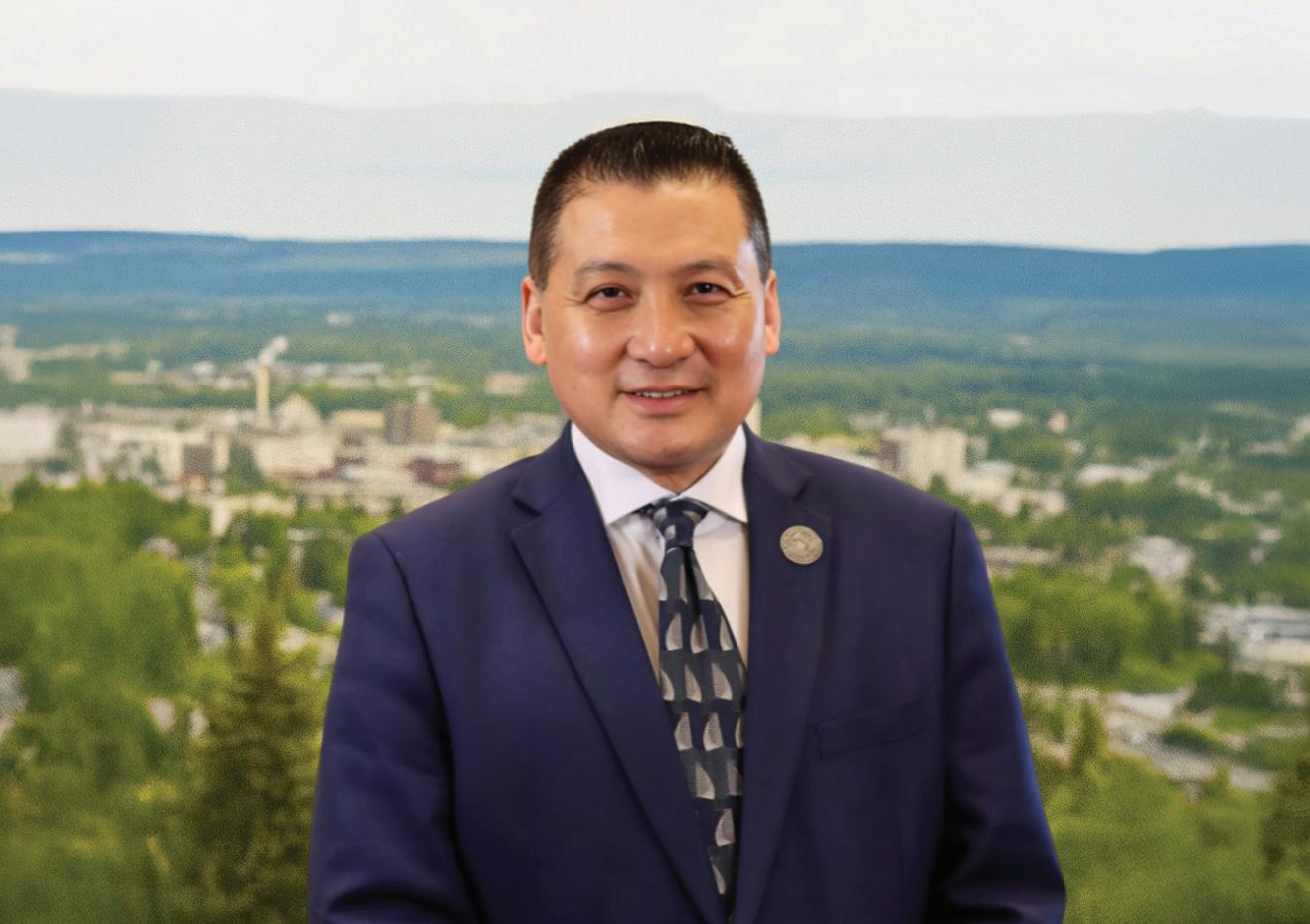
Reid Wilson Quesnel Track & Field
Tiasharon Billyboy-Voigt Quesnel Track & Field
Brett Tassell 100 Mile House Golf
Pierce Northcott Mackenzie Powerlifting
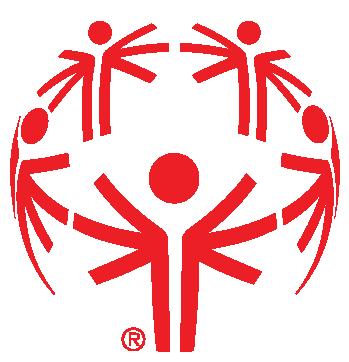
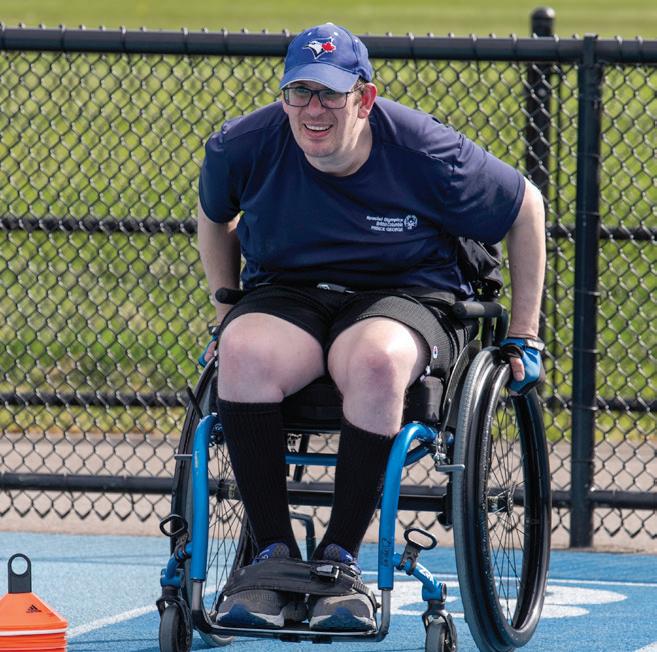
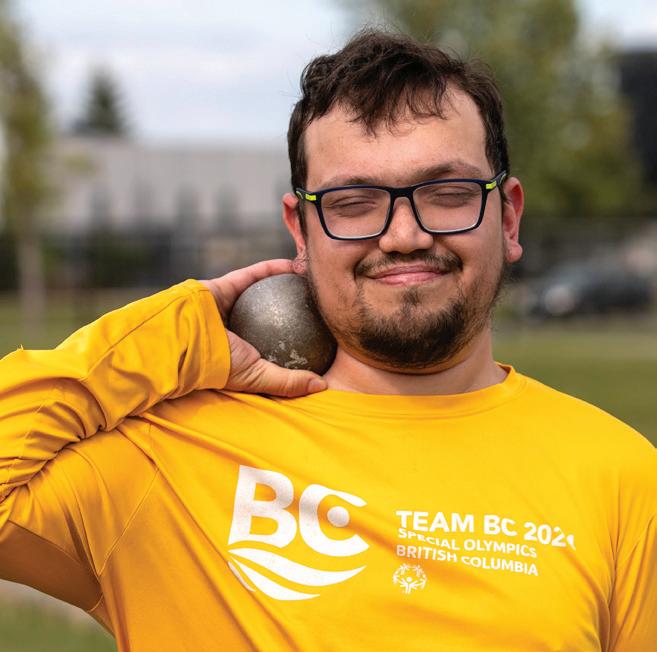

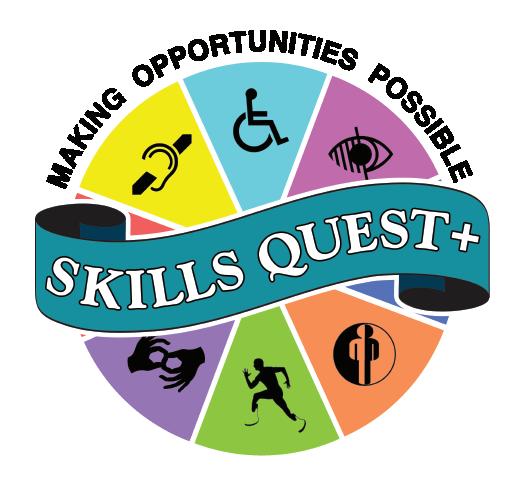
photos: Steven Dubas

Meet the 2025 Special Olympics BC Summer Games
Co-chairs
Lyn Hall
Renee McCloskey
Athlete ambassadors
Chase Caron
Marinka VanHage
Adam Spokes
Director of access control
Christian Hamlyn
Director of food services
Mandy Newcomb
Director of fundraising
Sandra Blackwell
Director of logistics
Teresa Saunders
Director of medical
Debbie Heywood
Director of protocol
Victor Liu
Director of public relations
Shirley Bond
Director of special events
Katherine Benny
Directors of sport operations
Jim Martin
Rich Abney
Director of transportation
Scott Bone
Director of volunteer services
Donna Flood
City of Prince George representatives
Lindsay Timmermans
Matt Russell
LETR representatives
Lisa Alvarez
Jennifer Cooper
Special Olympics BC – Prince
George representative
Peter Goudal
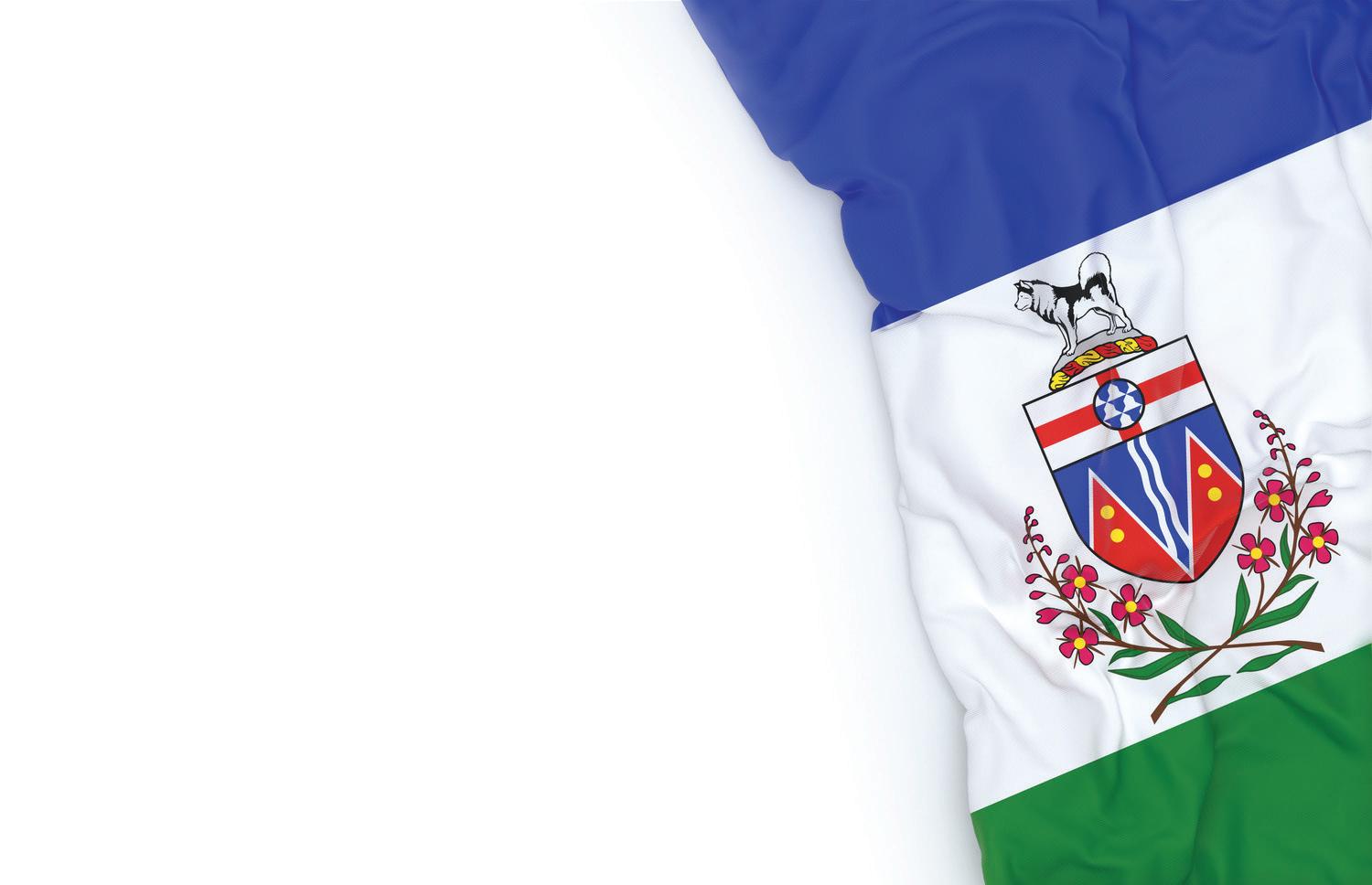
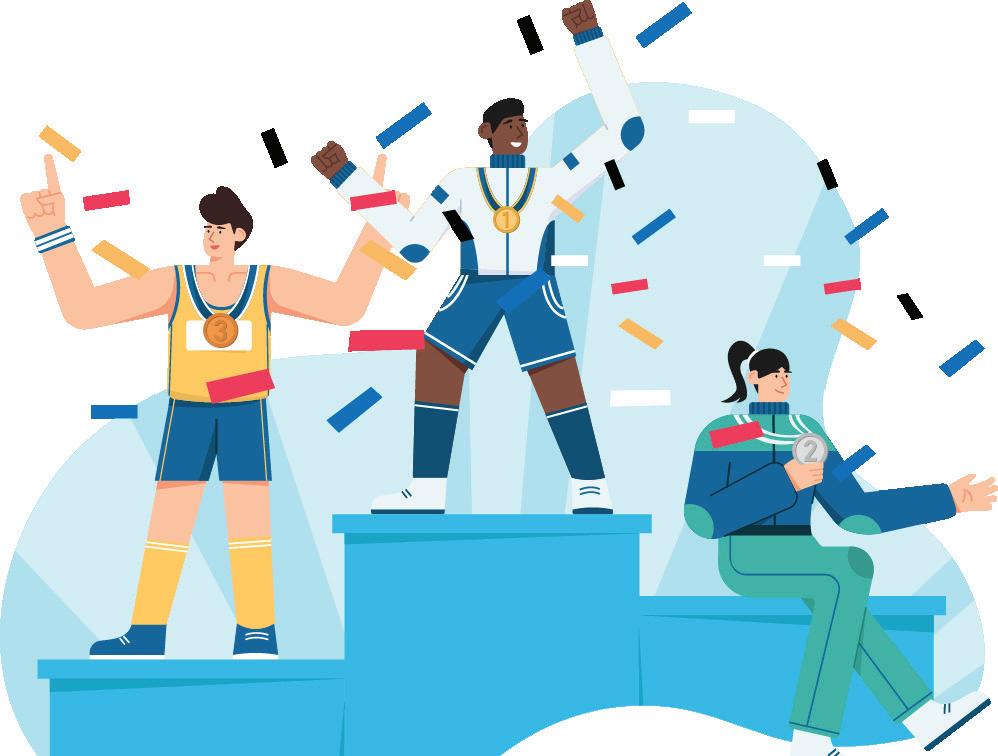
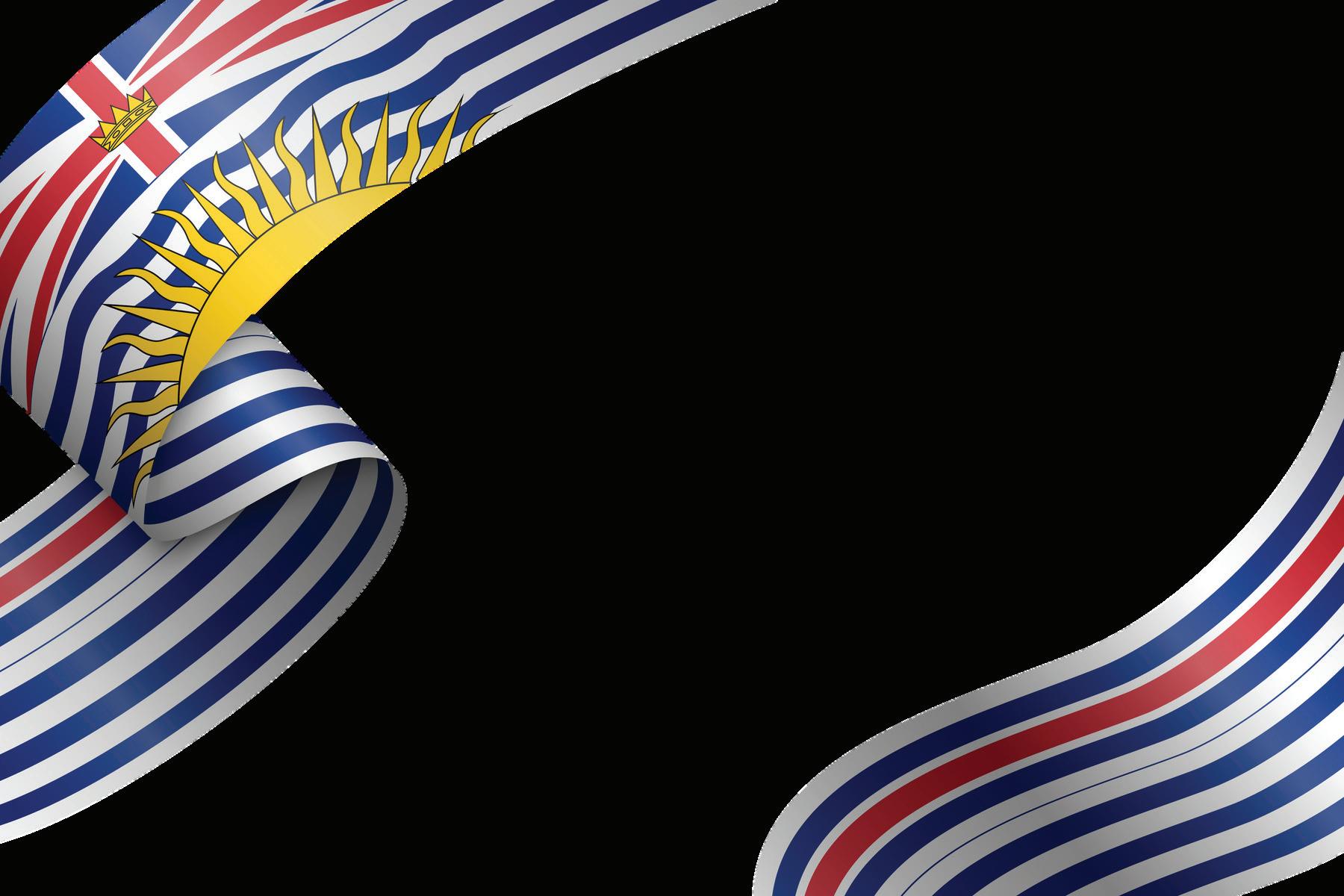


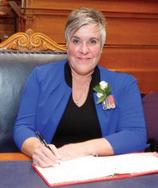

Training hard in track and field for the Special Olympics BC Summer Games
Christine Dalgleish Citizen Staff
Sprinting, jumping and throwing are all on the list of events one track and field athlete will compete in during the Special Olympics BC Summer Games in Prince George July 10 to 12.
Spencer Rourke is training hard to prepare for his 100m, 200m, standing long jump, shot put and turbo javelin throw events but not without a little guidance.
Head track and field Coach Wilma VanHage has been involved with Special Olympics for the last 15 years.
“You see a lot of improvement and there’s always a lot of wonderful moments,” VanHage said.
“It’s so inspiring when you see an athlete and they try, try, try and suddenly
it clicks. They are amazing and they are a true inspiration to me. When you see them try so hard and then it finally works for them and it’s just like — wow — to be part of that is amazing.”
Along with track and field, VanHage is head coach for snowshoeing and helps out with 10-pin bowling, rhythmic gymnastics, Club Fit (a mandatory program for all competitive athletes) and soccer.
“And if anyone needs me I just come in and help,” VanHage laughed.
“Marinka (VanHage’s daughter) does 12 sports so I’m there anyhow so I help out where I can.”
The athletes competing in T&F along with Spencer include Tyler LeFebvre, Marinka VanHage and Randella Willier.
It all started with last year’s qualifiers in
Smithers for those athletes wishing to compete in T&F during the BC Summer Games.
Each athlete had to compete in at least four events and they could max out at six.
“So they could choose what events they wanted and some athletes don’t want to run and you don’t necessarily have to run,” VanHage explained. “Most of them chose six events because you can always drop out of an event but you can only compete in what you competed in at the qualifier.”
Even though the competition can be intense at times, VanHage said it’s still heartwarming to see that at the end of the competition they are high — fiving and offering encouragement to one another.

“It’s tough but I have to tell the athletes that if they are racing and someone falls, it’s sad but they have to keep going because there will be someone to help that athlete but that’s what they think – ‘oh, somebody fell, they need me to help them’ and they are not thinking that they won’t finish the race. So that’s a tough part of the competition.”
To be able to compete at Masich Place during the provincial tournament is of great advantage because it takes the uncertainty of being in a new venue out if the experience.
“We usually start our runs on the opposite side of the track but now we will be using the starting line for our practices so they get the idea of where they are starting and finishing each race,” VanHage said.
And there’s one big component that will be unequaled.
“Having the fans behind them cheering them on and especially their families I think there is a lot of pride in that,” VanHage said.
“They always try hard but now they’ve got more to prove to their community so it’s going to be amazing!”
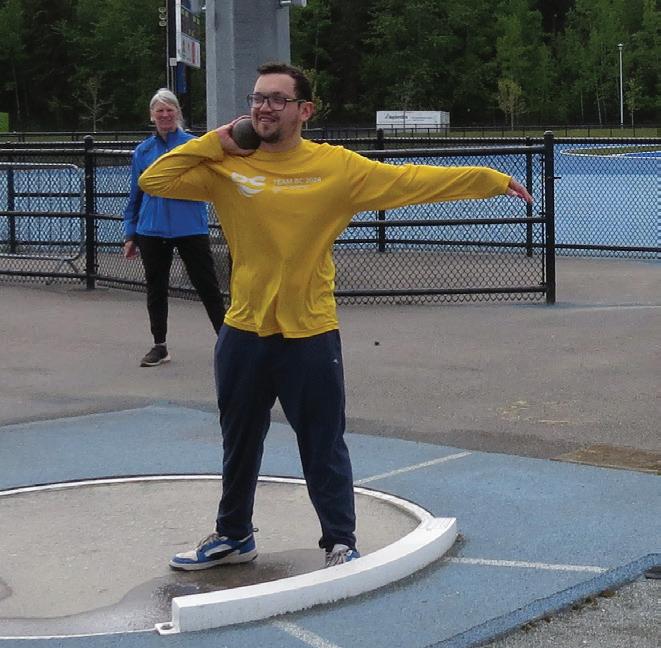
“Spencer always does better in competition — they shoot that gun to start the race and he just goes,” VanHage said.
“I never see such fast times as when he is competing. He does super well. When he is in the zone he does amazing. When it comes down to the competition day he is very focused in and always does extremely well.”
Spencer is a man of few words but gave some sage advice about sprinting.
“Always run past the finish line because someone could pass you at the end,” Spencer advised.
And the standing long jump?
“I really enjoy it,” he said. “But javelin is my favourite.”
Sue LeFebvre, fellow competitor Tyler’s mom, coaches Spencer in turbo javelin.
“He’s worked really hard and has put his mind to it and has listened to advice, encouragement and suggestions and has gotten much better at it,” LeFebvre said.
“He’s been great and is just a lovely man.”
Spencer said he’s looking forward to the SOBC Summer Games and one thing is for sure.
“I will try my best.”
For more information visit www.SOBCGames.ca

Prince George shortlisted to host 2030 Special Olympics Canada Summer Games
Matthew Hillier Citizen Staff
As it gears up to host the 2025 Special Olympics BC Summer Games in July, the city has announced that it is on the shortlist to host the 2030 Special Olympics Canada Summer Games.
“We are absolutely thrilled to be chosen as one of the shortlisted cities for the 2030 National Special Olympics,” said Shirley Bond, director of public relations for this July’s Special Olympics BC Summer Games.
“I was really proud to be part of the bid group that worked so hard to put together a first-class bid, and I think it was super helpful to have the unanimous support of council and so many others. So great next step, but the big ones yet to come.”
If chosen, the city would host 1,700 athletes from across the country, along with coaches, family, friends and supporters.
The bid was submitted during a Feb. 24 council meeting. A staff report stated that the economic impact of the 2030 Summer Games will be more than $8 million for the city and more than $12.5 million across the country.
“What matters most to me is that we have seen our community learn
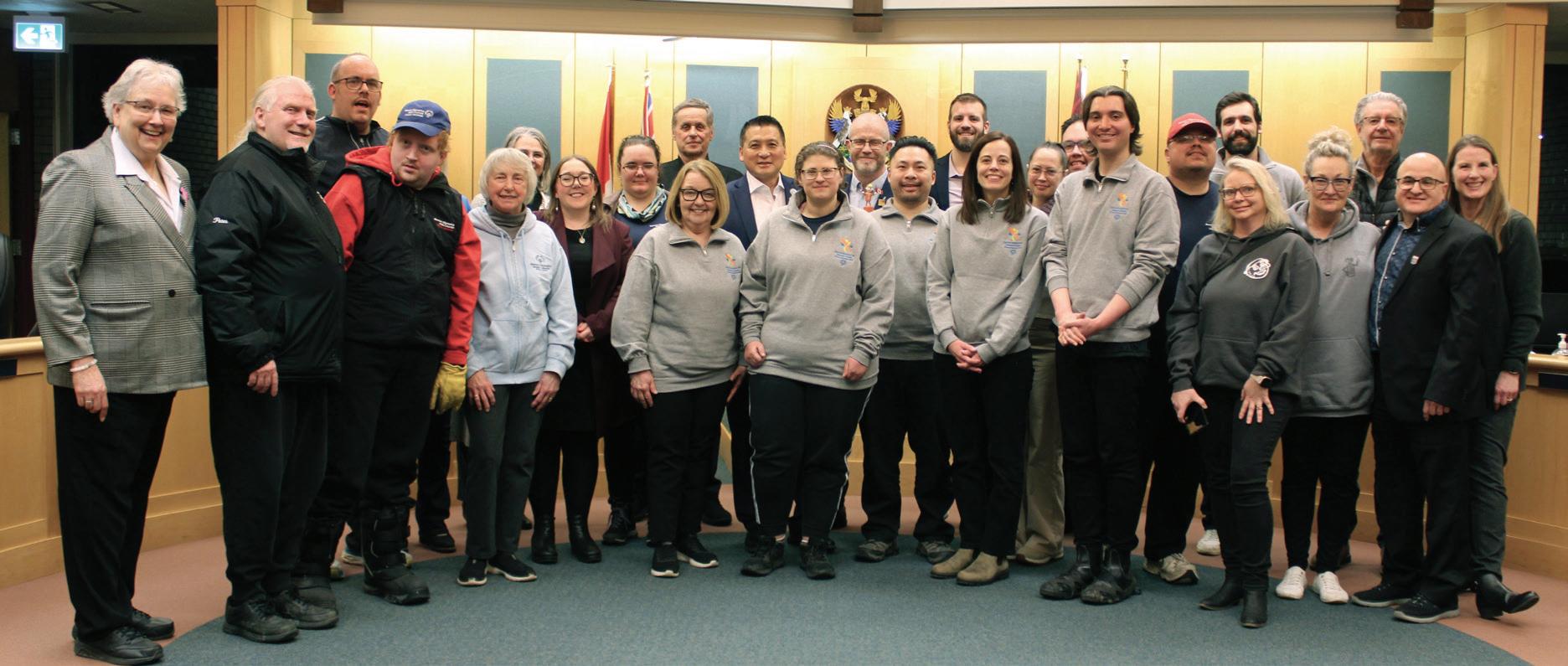
so much about Special Olympics and about the importance of an ongoing program,” said Bond. “The games are important but what goes on every week all year long for our athletes, our coaches, our volunteers is so critical. I think that the summer games will build momentum and we can continue to tell the story of the Special Olympics during that period as we wait for the national. I am just so proud of the Special Olympics local and parents, families, coaches, and volunteers who every single week create a wonderful training opportunity for our athletes.”
The committee is now planning a site visit for Special Olympics Canada representatives this October. The successful community will be announced later this year.
Bond also noted how Prince George can improve its chances of being chosen for the 2030 games.
“If we do this job well and we will, it will be a really great opportunity for the 2030 bid committee to build on that success,” said Bond. “We need to really encourage people to step up. You can just spend a couple of hours or a couple of days supporting these athletes. That is going to be an important part of convincing the national games.”
Bond said she believes that Prince George has a good chance of being
chosen for the National Games.
“Prince George is exceptional at hosting games and tournaments and welcoming Canada,” Bond said.
“Prince George steps up and I think we have a reputation of being able to deliver. I think that will certainly
be taken into account when they analyze who’s best to host the 2030 Summer Games.
The Special Olympics BC Summer Games are set to begin on July 10. For more information visit www.SOBCGames.ca
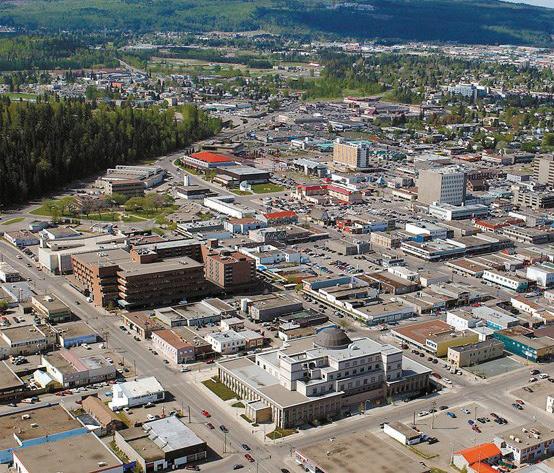
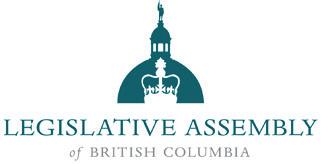
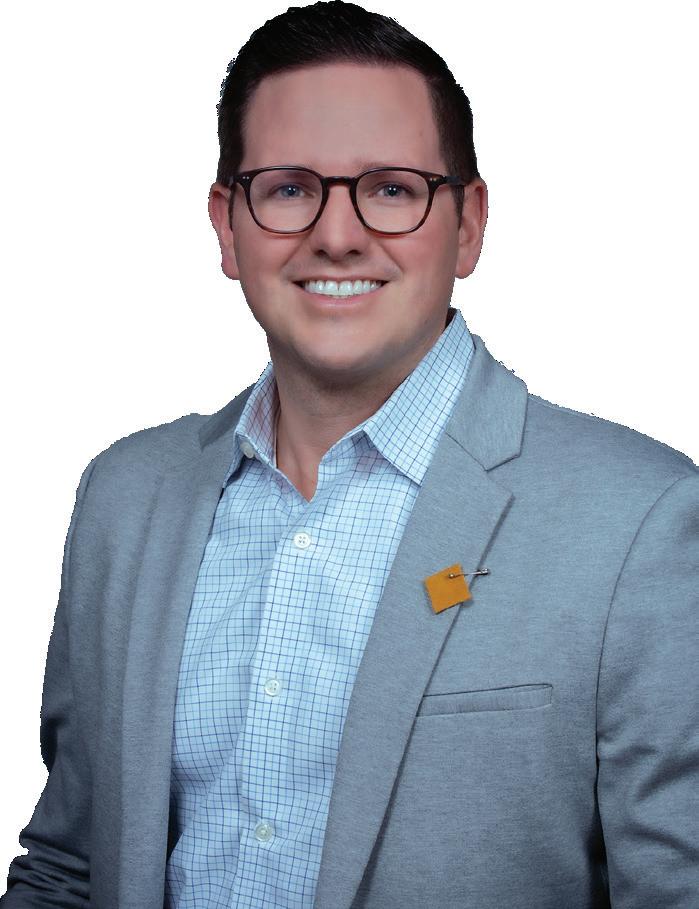
CITIZEN PHOTO BY COLIN SLARK
Prince George city council, Special Olympics organizers and athletes smile after council approved a bid for the 2030 Special Olympics Canada Summer Games on Monday, Feb. 24.

Swimming is favourite sport of one of this year’s Special Olympics athletes
SUBMITTED PHOTO
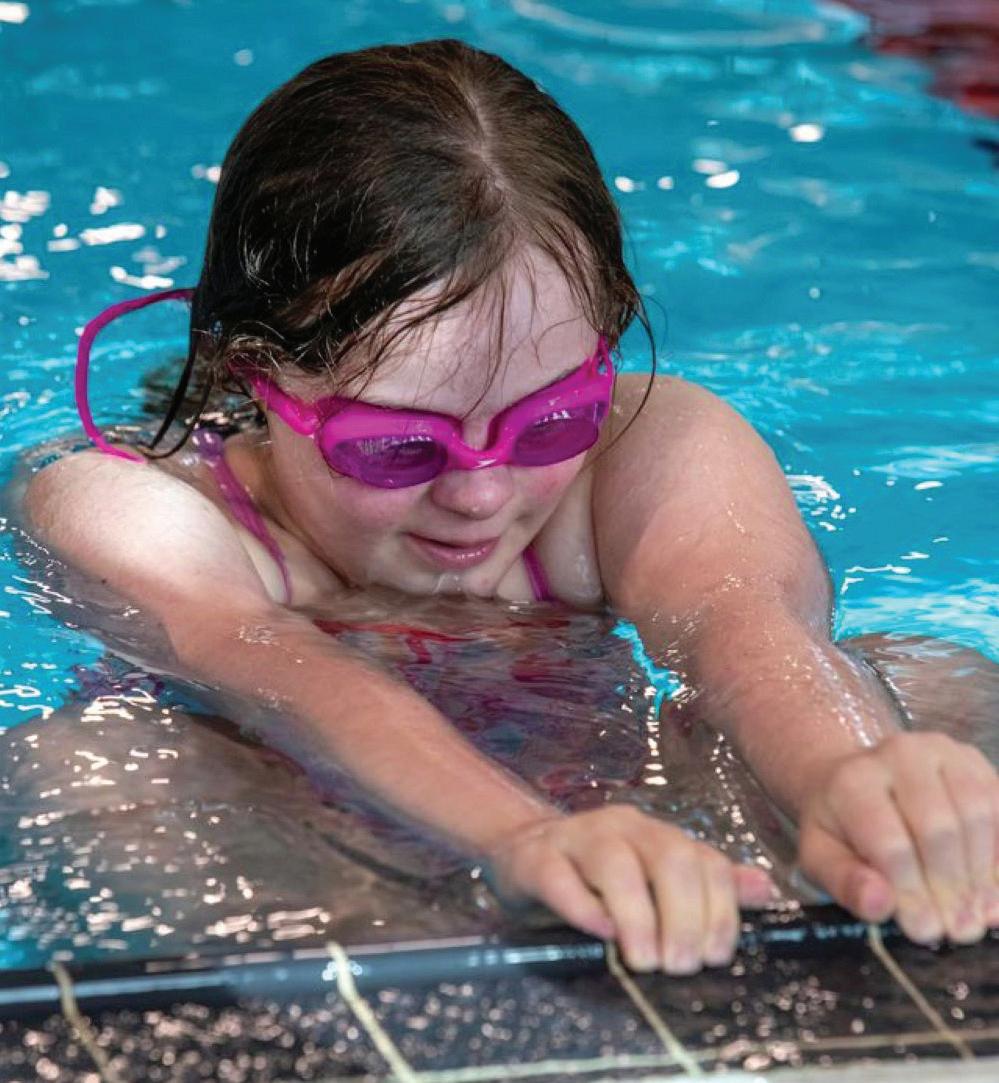
Christine Dalgleish Citizen Staff
It’s a big summer for Brooklyn Sherba. She’s graduating from high school and she’s competing in the Special Olympics BC Summer Games in Prince
George from July 10 to 12.
Brooklyn is a swimmer and one of the youngest competitors at the Games this year.
She will compete in breaststroke, backstroke and freestyle in 50m and
Welcome all Athletes, Coaches, Trainers, Support Staff & Volunteers to Prince George!
Best
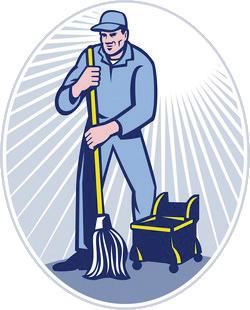
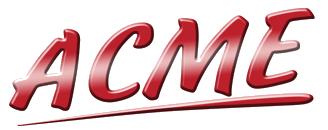


100m distances.
Brooklyn’s favourite event is breaststroke and there’s just something about it that appeals to her.
“The frog kick,” Brooklyn said with her arms raised high.
Being in Prince George to compete at the BC Summer Games offers a very supportive environment for the hometown team.
“Having people around you cheering you on makes you go, go, go, doesn’t it?” Mom Sheri asked Brooklyn, who answered with a giant grin and an enthusiastic nod.
Sheri said she was grateful that Brooklyn found her sporting niche because when the triathlon family took Brooklyn out to participate with them on the triathlon course she wasn’t very happy.
“She didn’t like the cold, she wasn’t having any of it,” Sheri recalled with a smile.
“We thought, well this isn’t good.”
Sheri said all three of her children learned to swim and that’s when things changed in her sporting life.
“And Brooklyn has always loved to swim,” Sheri added.
Sheri has just started as an assistant
coach with the Special Olympics swimmers.
“It’s just so wonderful to be a part of watching these athletes grow,” Sheris said.
“It’s a real inspiration to just be with them and follow their journey and it’s a really close-knit group and it’s a very important part of Brooklyn’s life. It’s just one of those things, it’s always been part of Brooklyn’s life.”
Brooklyn also participates in basketball at school and Special Olympics rhythmic gymnastics and Club Fit and she also has done a little bit of track and field.
“It’s just a great community for the athletes, Prince George is just so inclusive,” Sheri said.
“It’s just lovely to have these opportunities to host the BC Summer Games. It’s a real honour for our community to do that. These games are not only a celebration of the courage and dedication of all the athletes with intellectual disabilities but it’s that true inspiration that they bring to all of us – you really just need to watch them for a moment and it’s contagious. We’re really looking forward to the BC Summer Games. It’s going to be a lot of fun.”
For more information and to support the athletes by volunteering visit www.SOBCGames.ca.
Brooklyn Sherba is seen here during one of her many swim practices ahead of the Special Olympics BC Summer Games that will be held in Prince George from July 10-12.
Prince George Special Olympics athletes win bocce tournament in Burns Lake
Christine Dalgleish Citizen Staff
Prince George Special Olympics athletes, three teams of four players, travelled to Burns Lake to compete in the Region 7 & 8 bocce competition along with teams from Quesnel and Smithers as well as the home team during the one-day event that took place on June 14.
Each team played three games, scoring three points for a win, two points for a tie and one point for a loss. The
teams Sneak Attack and Grizzlies placed second and the Italian Stallions won first place in their divisions.
This was a great warm-up event for the Prince George bocce team Sneak Attack, who will be competing in the upcoming 2025 Special Olympics
BC Summer Games being held in Prince George from July 10 to 12, Wilma VanHage said in a recent press release.
This will be the first time Prince George will have a Bocce team
25 years as Prince George’s premier boutique for
Canadian Fashions
Frank Lyman. Jacqueline Kent Jewelry, Joseph Ribkoff, Blue Sky Clothing and more. Sizing from XS - 3X and 6 - 22
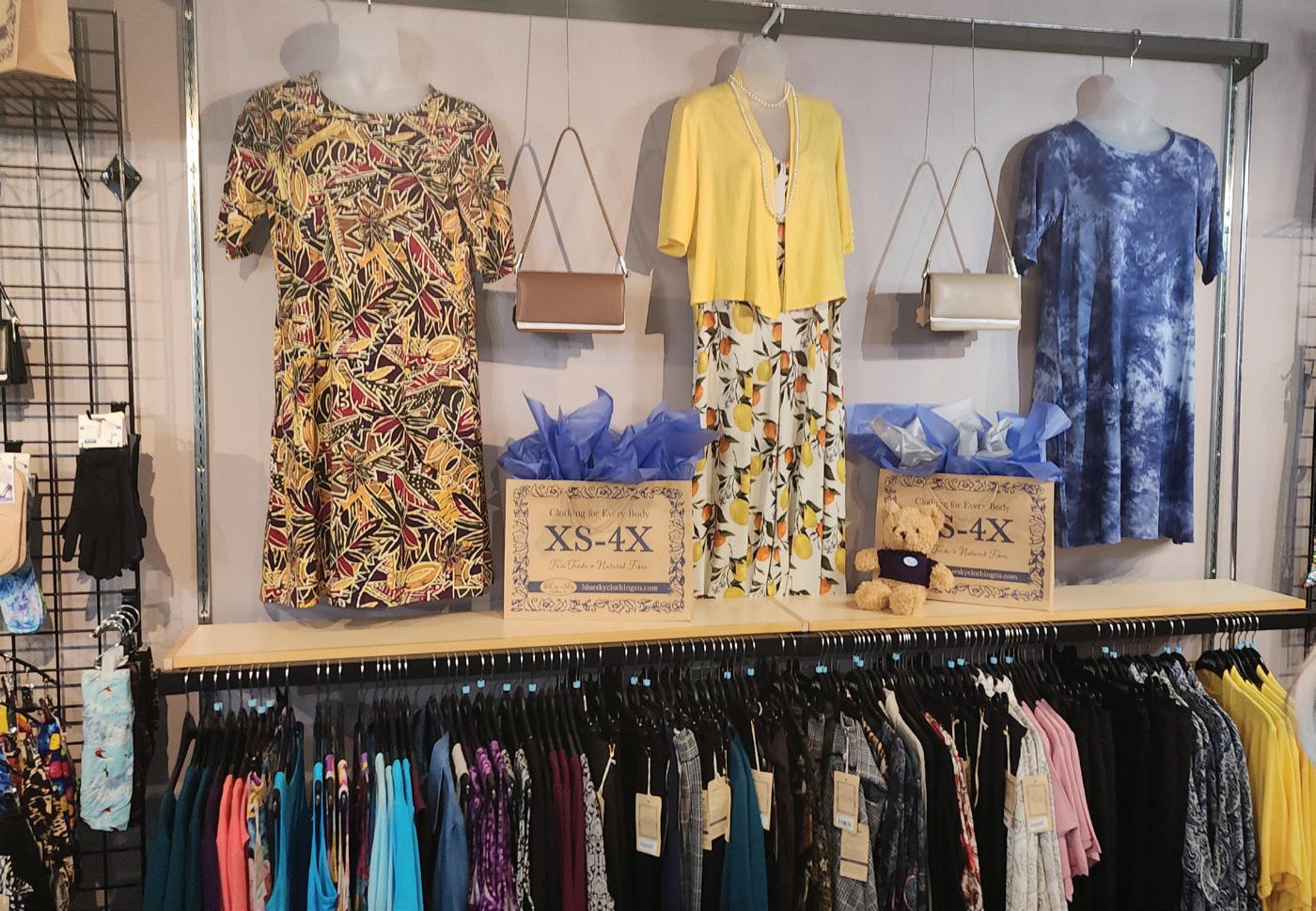


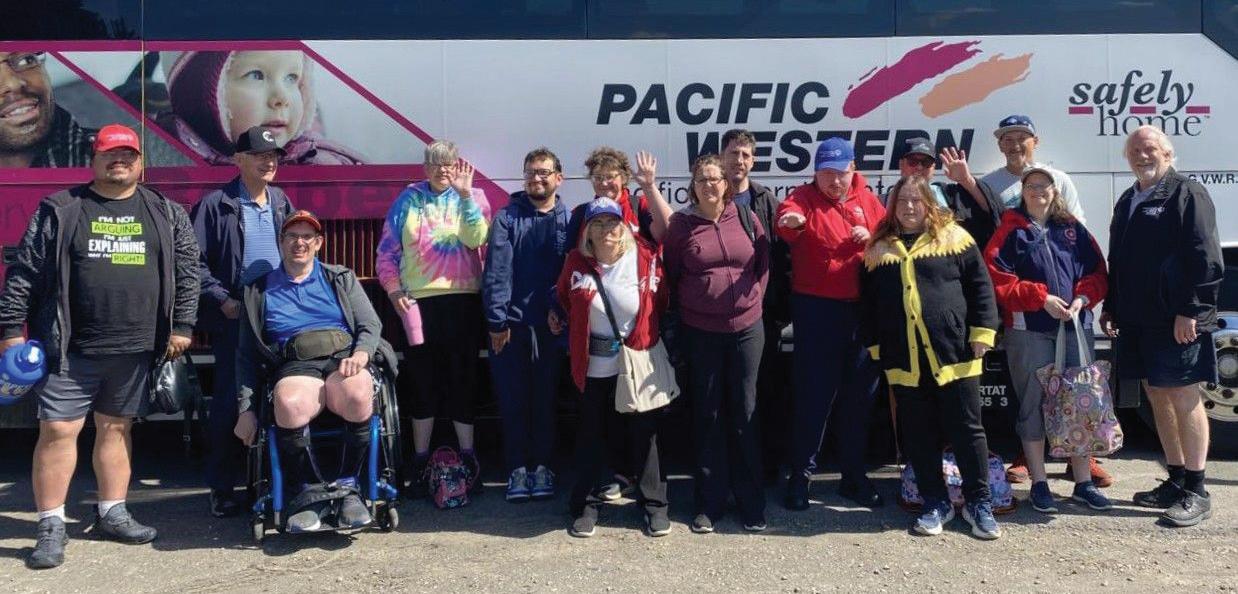
competing in the upcoming Summer Games, as bocce is a new sport for the Prince George Special Olympics organization, which offers programming to athletes year round.
“The bocce program is quickly growing in popularity among the Special Olympics athletes,” VanHage said.
“The program started in 2023 with Coach Waylon and eight athletes and has already doubled in size. The bocce teams have been training for many months, first indoors at the PGYSA
indoor soccer facility throughout the winter and outdoors when the weather warmed up.”
Members of the Prince George teams include
• Sneak Attack: Ruth Caldwell, Tara Chiasson, Issac Goudal, Adrian Rosen
• Italian Stallions: Audrey Nelson, Marinka VanHage, Adam Spokes, Spencer Rourke
• Grizzlies: Angela Hills, Tyler Lefebvre, Cindy Komoski, Jordan Korum
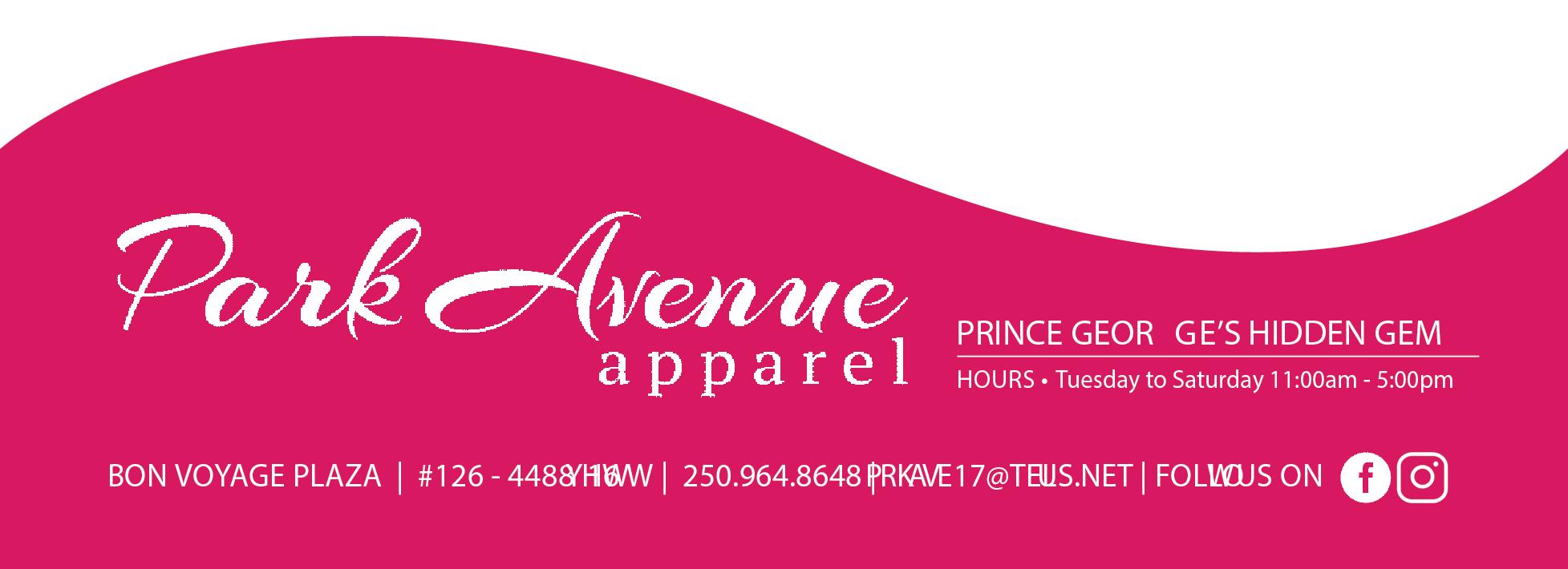
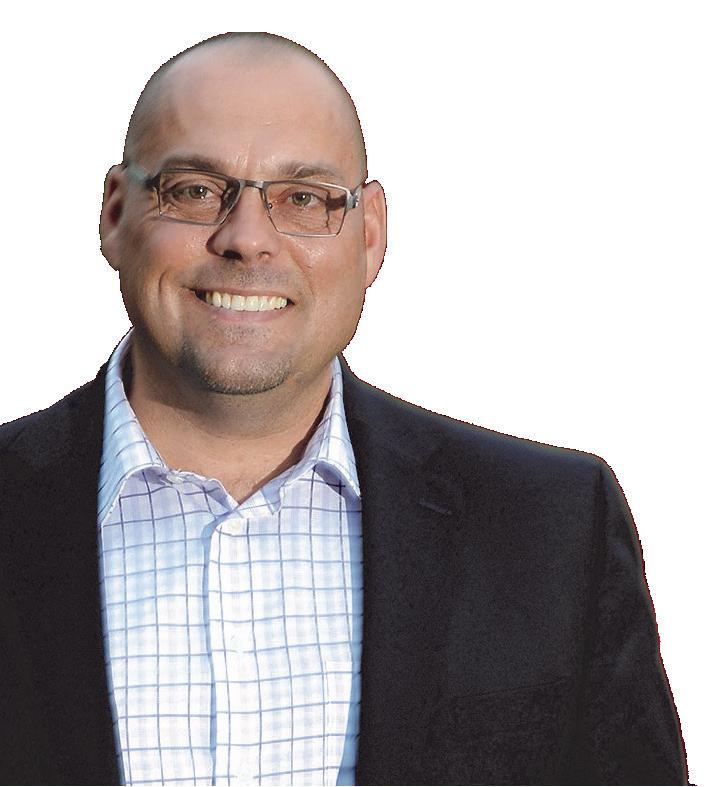
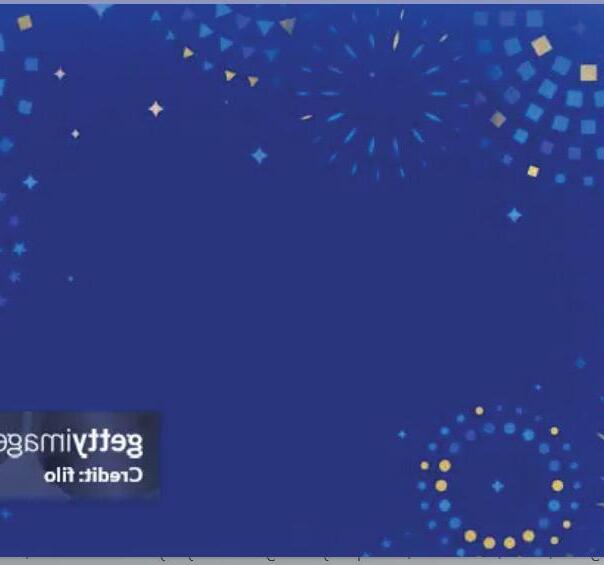

FACEBOOK PHOTO
Prince George Special Olympics athletes attend the Region 7 & 8 bocce tournament in Burns Lake on June 14.

Council approves $30k in spending for Special Olympics site visit
Colin Slark Citizen Staff
Prince George city council approved up to $30,000 in spending from the major events reserve fund to help prepare for a visit from Special Olympics Canada personnel this October to evaluate the city’s worthiness to host the 2030 Canada Summer Games at its Monday, June 23 meeting.
Back in February, council approved a bid for the 2030 Canada Summer Games and authorized up to $400,000 from the reserve in cash and in-kind support should Prince George be selected as the host.
Then, on June 12, Special Olympics Canada announced Prince George is on the shortlist for the 2030 tournament.
A report written by city staff ahead of the meeting said that while they’re waiting on specific requests from Special Olympics Canada for the in-person site visit, they have already started planning and are asking for the $30,000 on top of the $400,000 already received.
“As we learned from the bidding and evaluation process for the 2015 Canada Winter Games, it is critically important that we put our very best foot forward to “wow” the bid evaluation committee when they visit Prince George, and to demonstrate that we are the best choice in the country to host these games,” the report said.
The report goes on to note that hosting the games would bring approximately 1,700 athletes along with their friends and family from across the country to Prince George if the city is
We would like to extend a warm welcome to all the coaches and athletes.
Enjoy your stay in Prince George and best of luck in all your events!

selected as the host.
“We are very proud to already have high-quality venues that are required for all 10 sports: athletics, basketball, bocce, 10-pin bowling, golf, powerlifting, rhythmic gymnastics, soccer, softball, and swimming,” the report said. “Venues such as CN Centre, Lheidli T’enneh Memorial Park, PG Conference and Civic Centre, and Canada Games Plaza are ideal places to host ceremonies and special events that shows the vibrancy of our city.”
The estimated economic impact for the city is more than $8 million.
Presenting to council at the June 23 meeting, manager of event services Debbie Haywood said the city’s application for the games represented a lot of hard work in a short amount
She was asked what the $30,000 would be used for. Haywood said while the visitors would arrange their own hotels and flights, the funds would be used to set up local activities and transportation.
Director of civic facilities Andy Beesley said they don’t know the exact expenses yet, but past experience from 2015 suggests that they need to put on a show.
He said it would probably include partnering with community partners at the CN Centre for a Cougars game that will happen during their trip as well as other events at each of the potential host venues.
Whatever isn’t spent from the $30,000, director of finance and IT services Kris Dalio said, would stay in
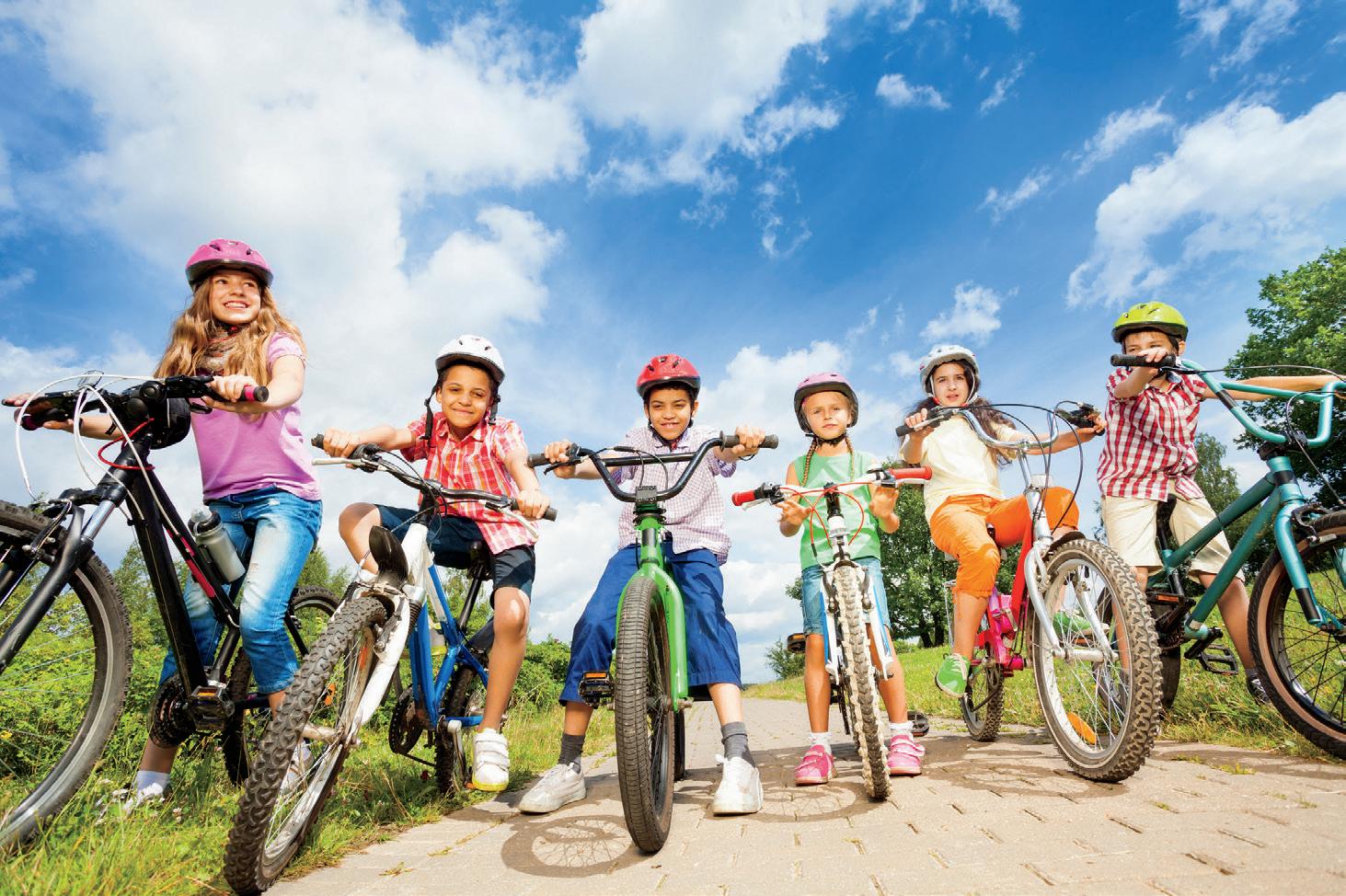
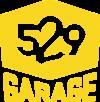
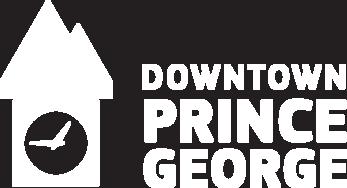

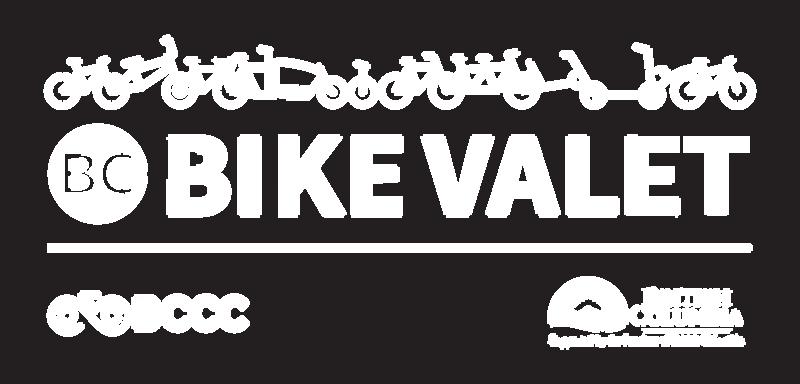


COLOUR YOUR SUMMER AT THE PG PUBLIC LIBR ARY

Join us for weekly activities, read up a storm, and enter to win great prizes with BC Summer Reading Club 2025!
Ages 5 - 9
Tuesdays & Wednesdays, July 8 to August 20

From July 10 to August 22, take on weekly challenges and earn ballots for prizes draw! Show up, join in, and discover something new. Bonus entries for coming to the Tens to Teens programs.
Ages 10 - 18
Thursdays, July 10 to August 22
Touch a Truck is back to wrap up the 2025 Summer Reading Club! Come to Canada Games Plaza to meet all your favourite vehicles and things that go vroom!
All ages Friday, August 22
We welcome the athletes of The BC Special Olympics to Prince George, all the best for the games!
Bob Harkins Branch (downtown) 888 Canada Games Way
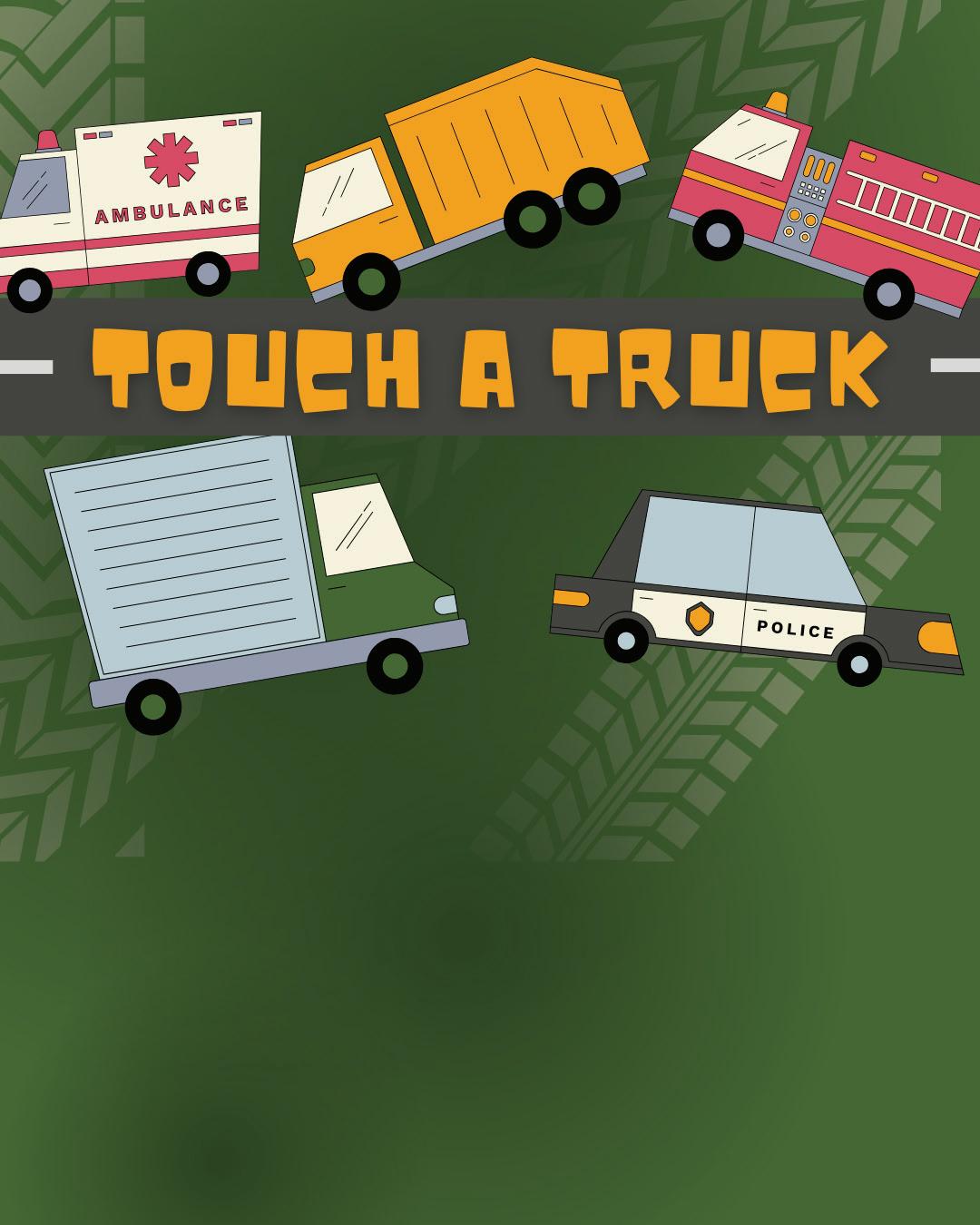
Nechako Branch (in the Hart) 6547 Hart Highway
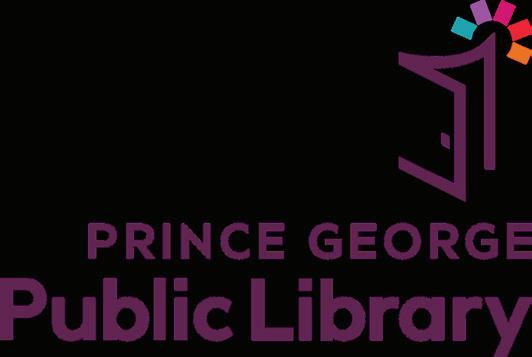

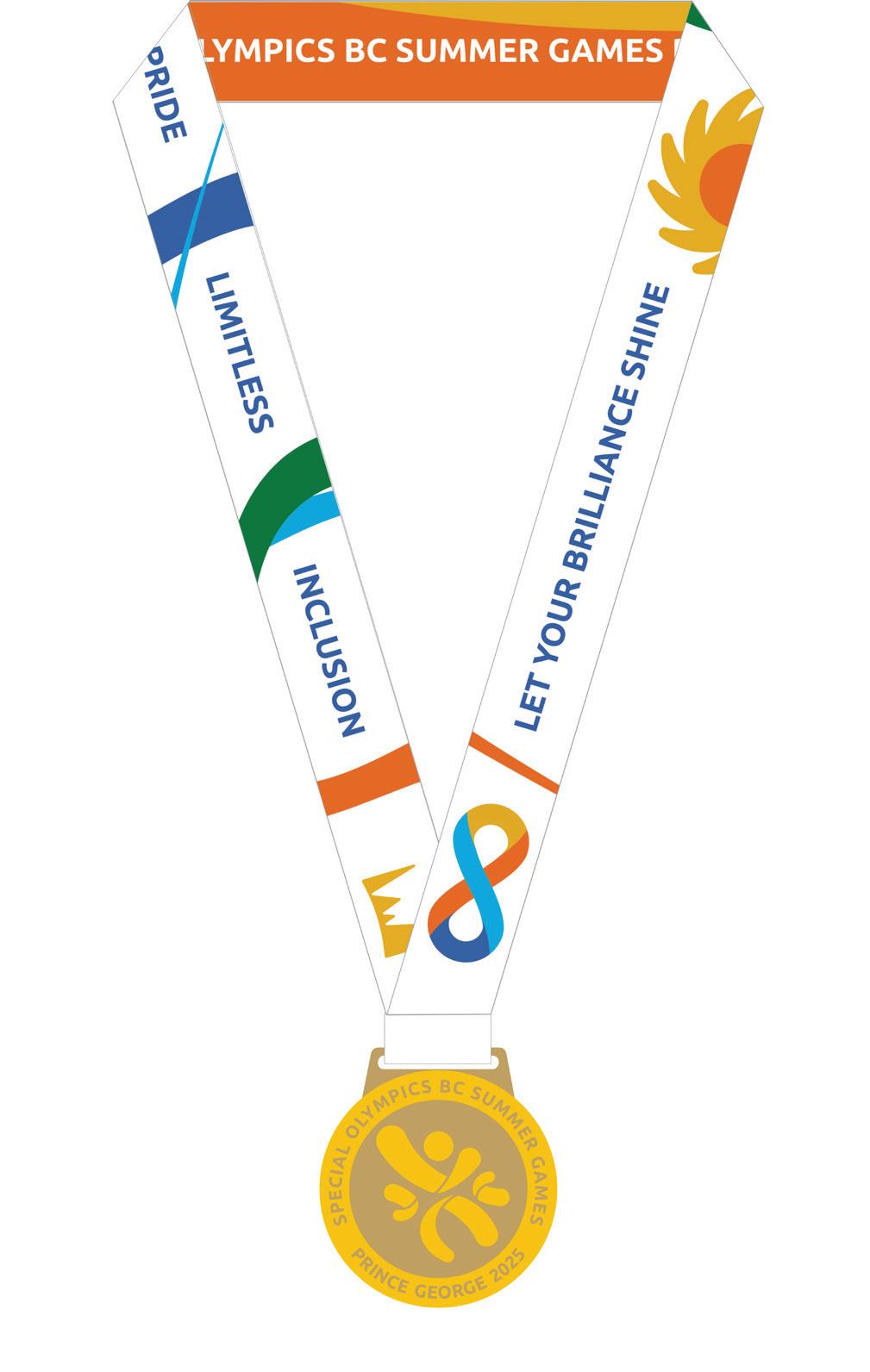
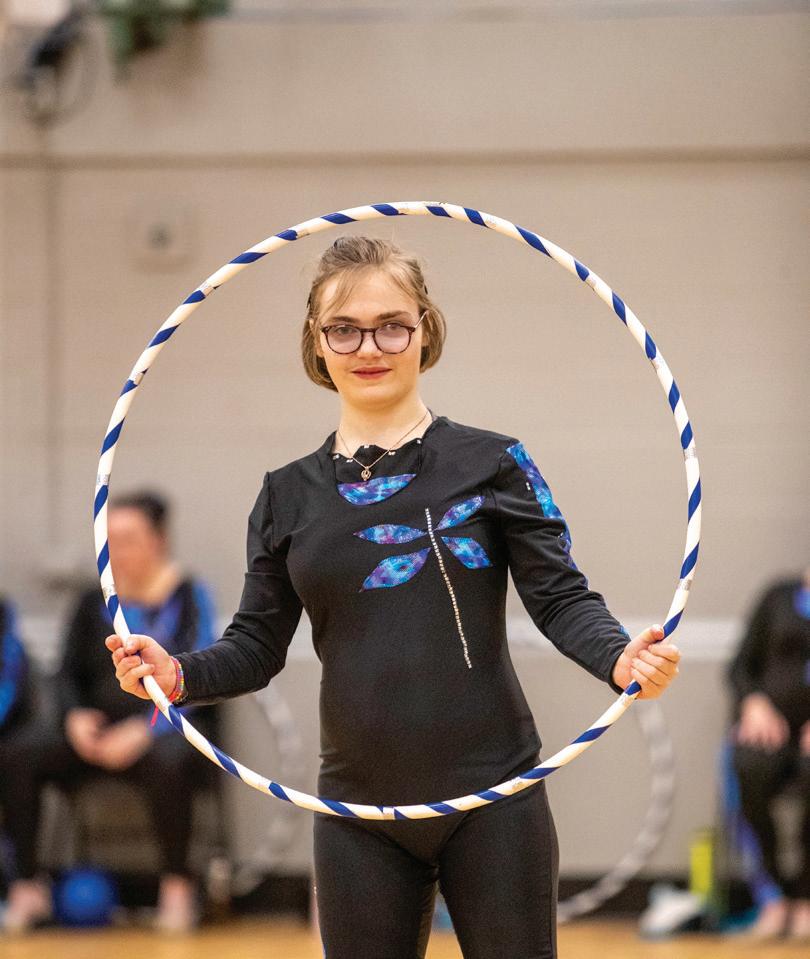
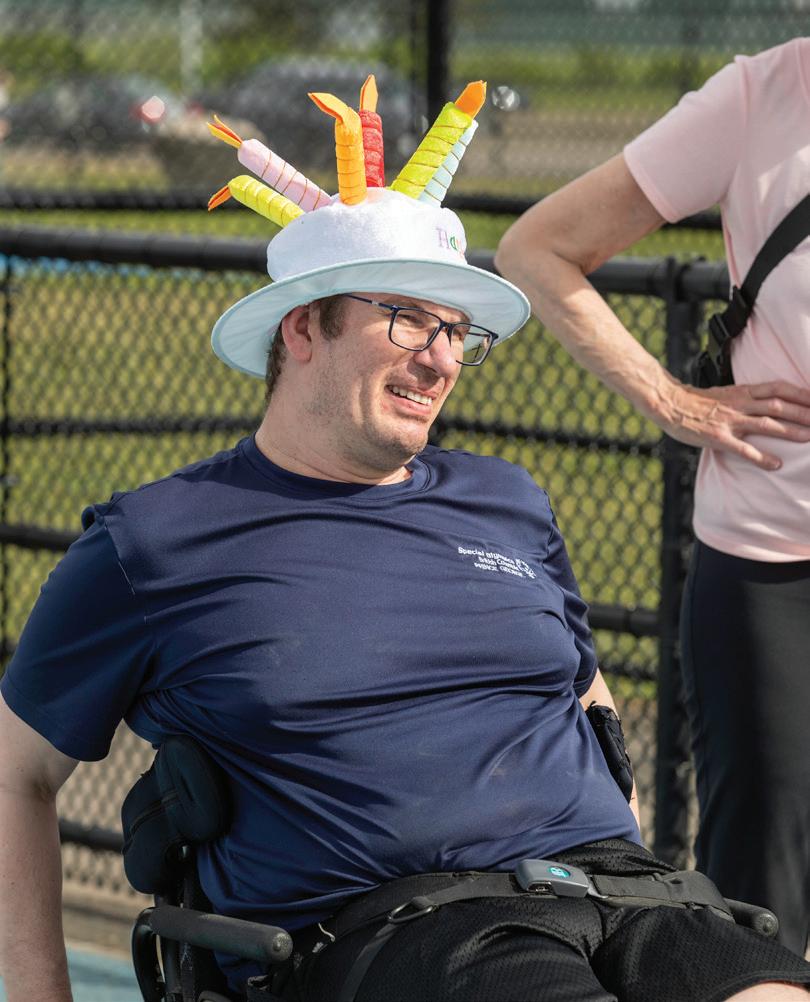


LET YOUR BRILLIANCE SHINE!
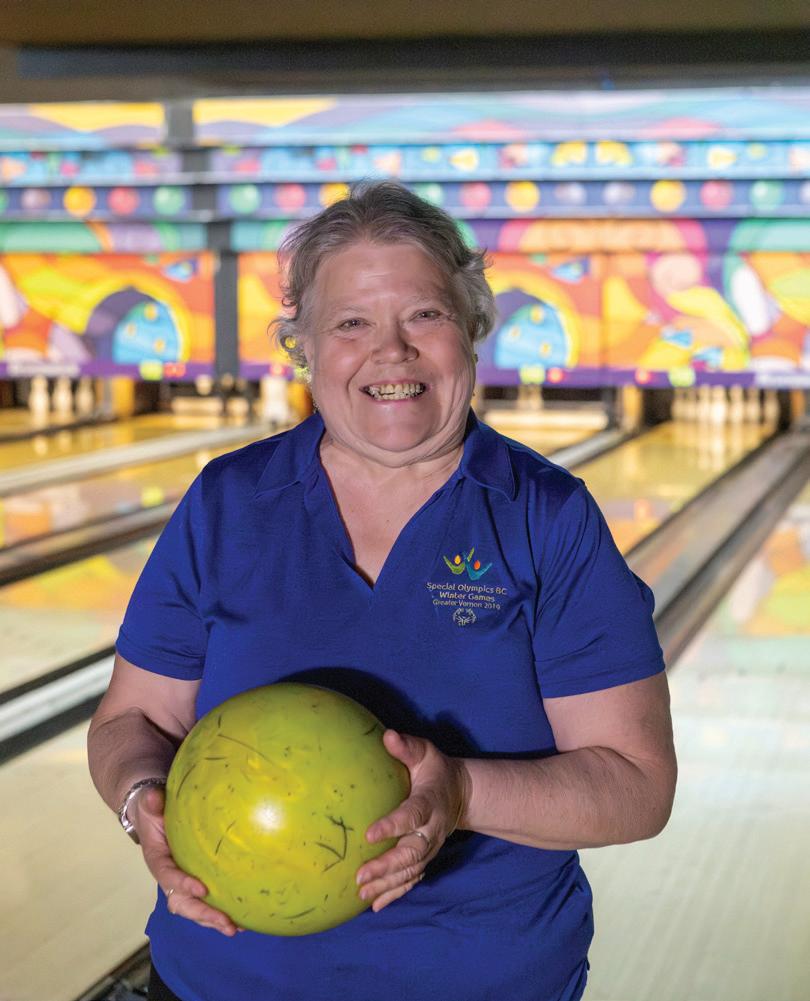
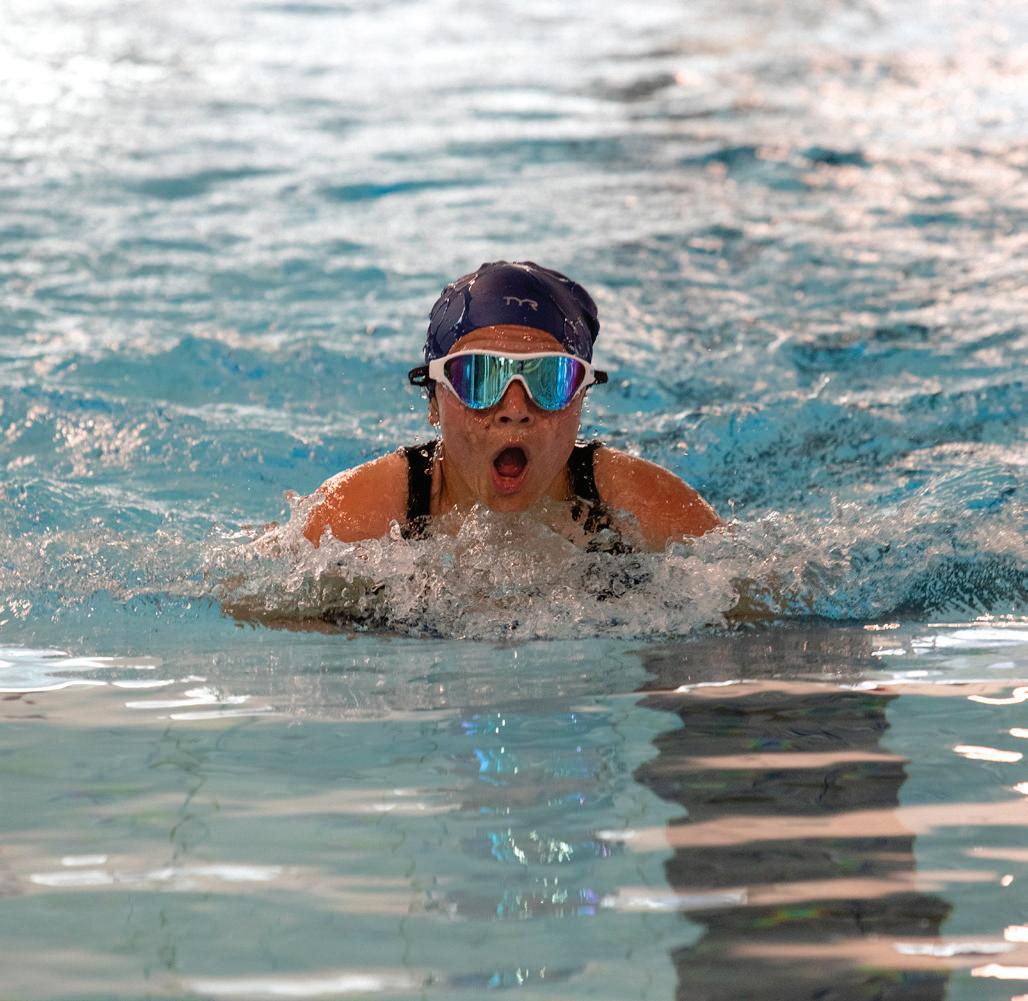
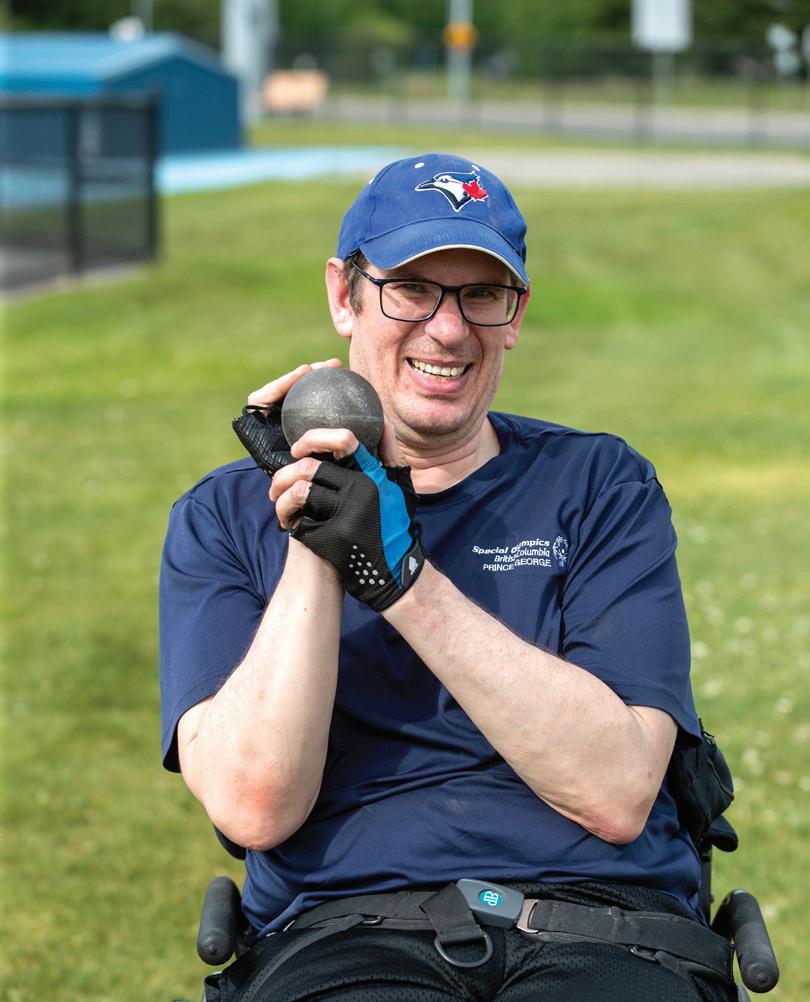
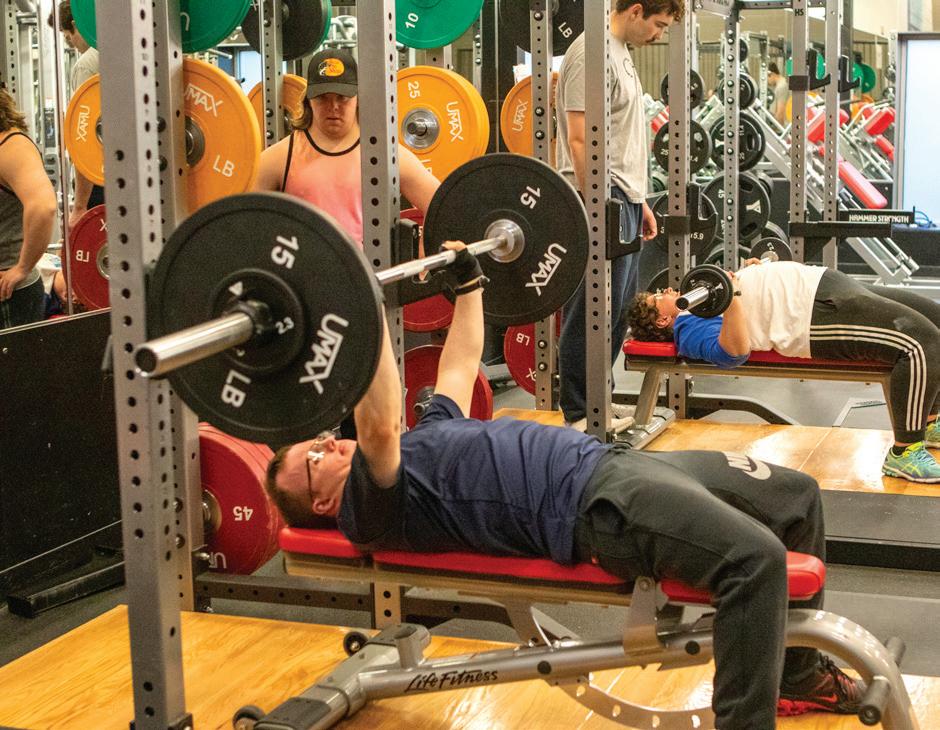
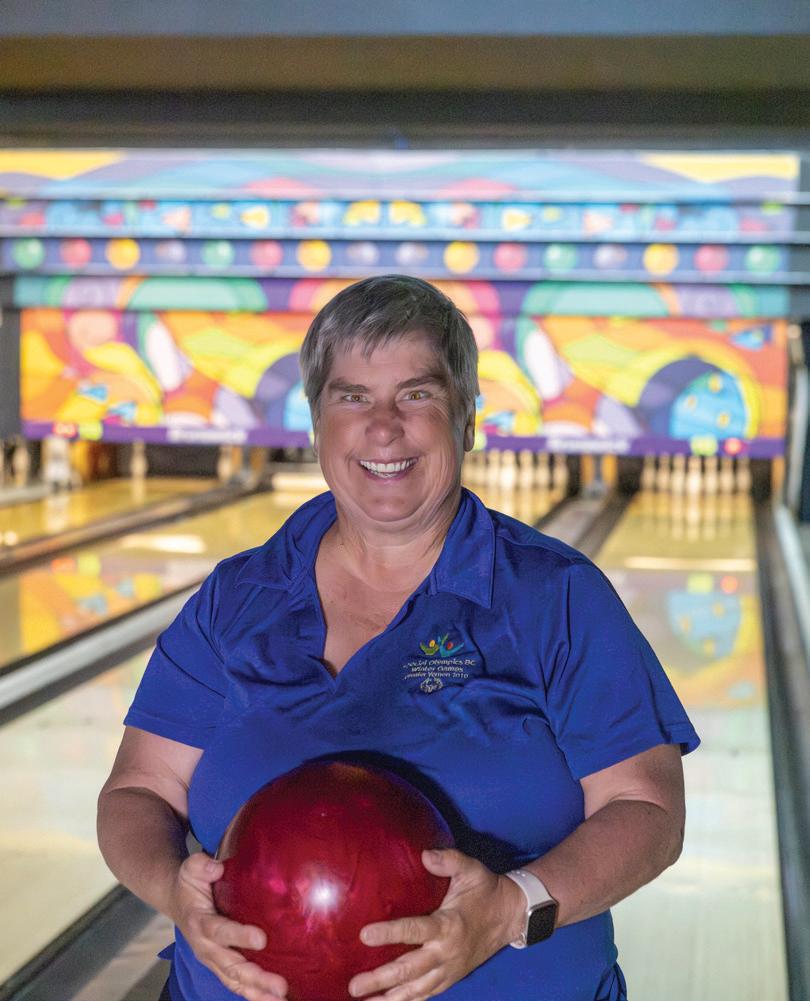
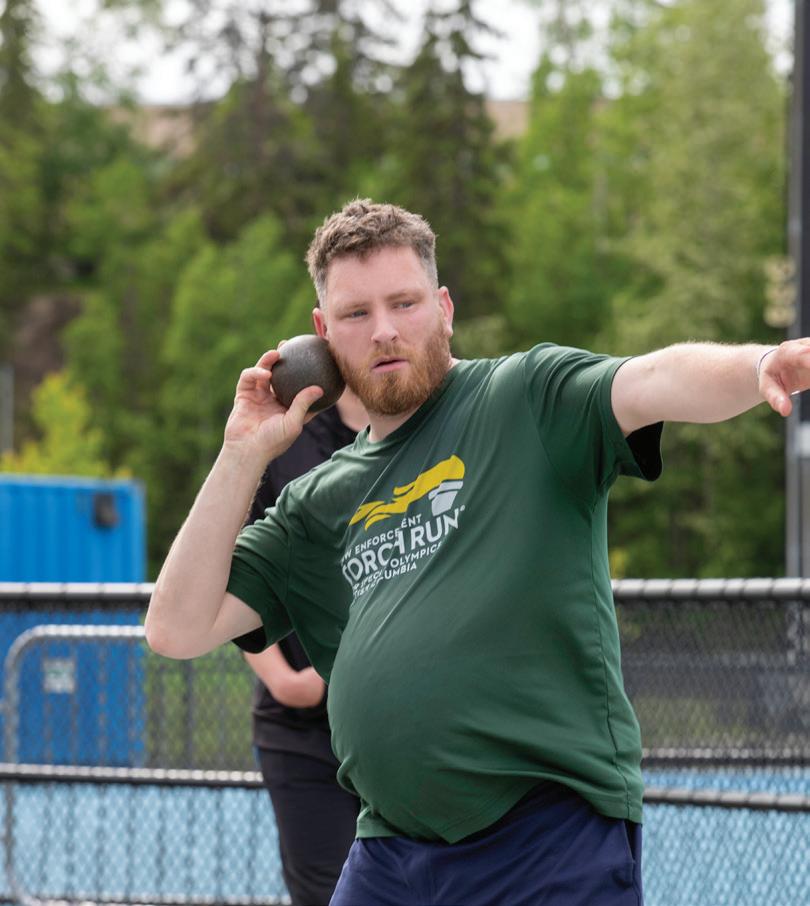
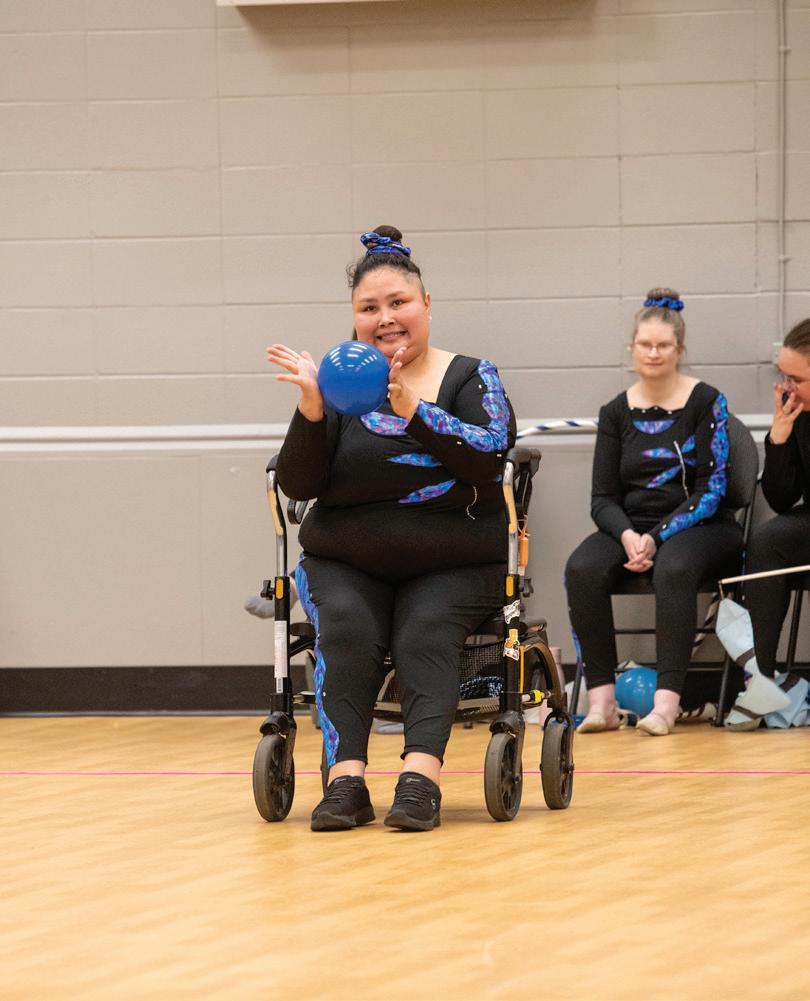
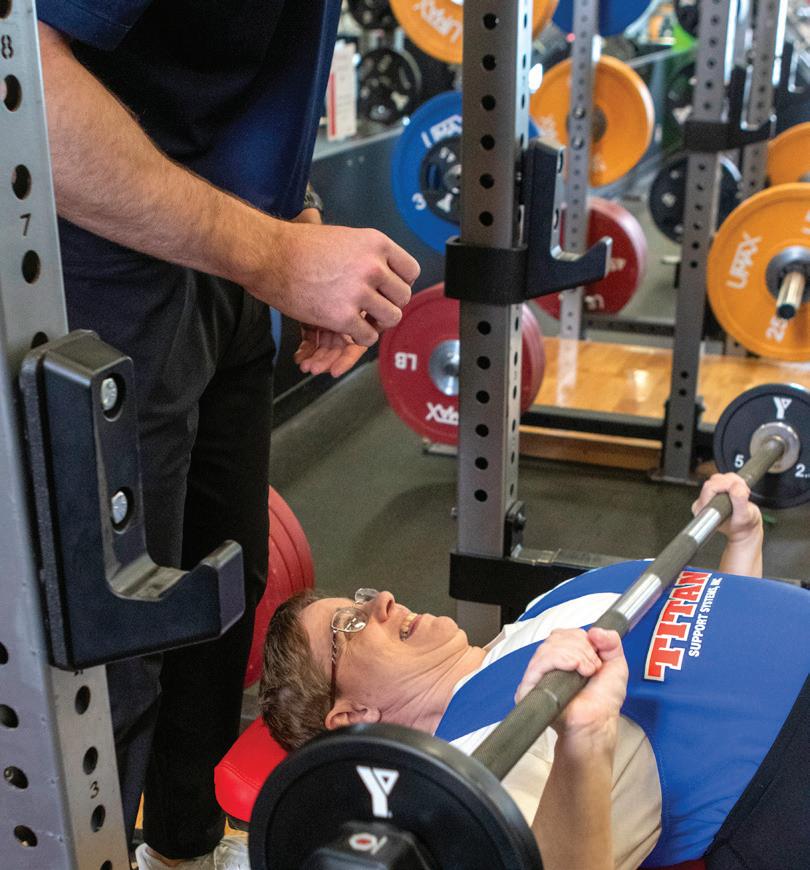
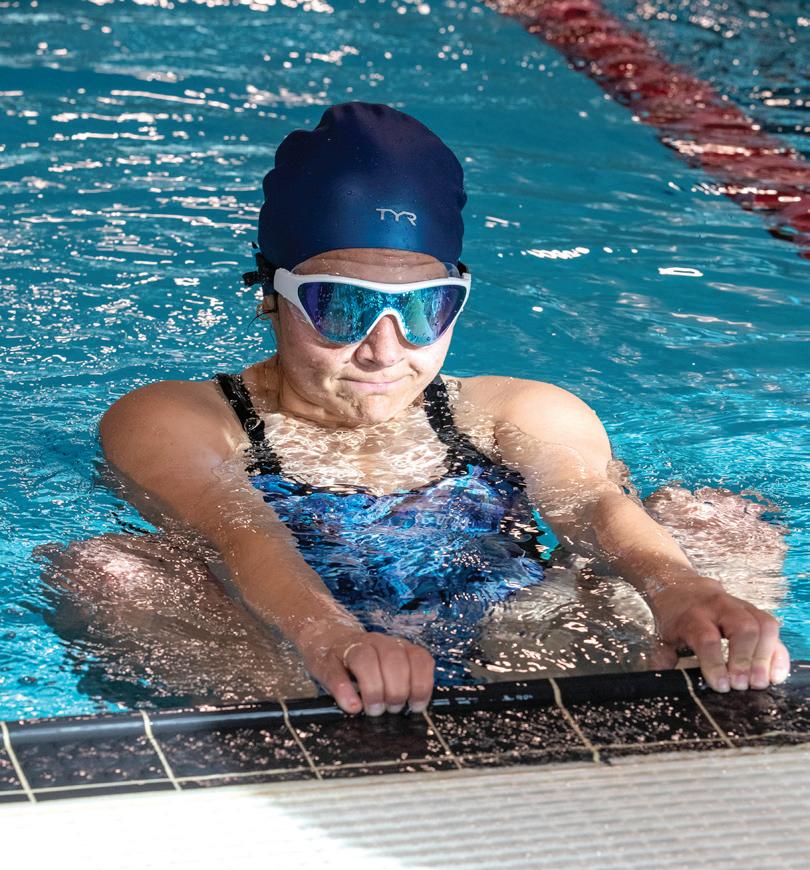

photos: Steven Dubas

Special Olympics BC volunteer first stepped up at age 8
Christine
Dalgleish
Citizen Staff
Sydney Hall was just eight years old when she first volunteered with the Prince George Special Olympics organization, helping box jerseys ahead of the 2001 Special Olympics BC Summer Games. It was a small start to what would become a long-standing commitment to a community that means everything to her.
Now 32, Sydney is once again lending her time, energy, and heart to the Special Olympics BC Summer Games, taking place in Prince George from July 10 to 12. For her, this year’s Games are another opportunity to give back to a program she’s been deeply involved with for nearly 14 years.
Her journey into active volunteering began at 18, when an email seeking volunteers was sent to her university soccer team. As a UNBC Timberwolves player, she stepped up and never looked back.
“It started with a sport I loved and then meeting the athletes and getting to know them as more than athletes — they’re my friends now,” said Sydney. “The passion
SUBMITTED PHOTO
Sydney Hall has been volunteering with the Prince George Special Olympics organization for years and are now focusing her efforts on the upcoming Special Olympics BC Summer Games taking place in Prince George from July 10 to 12.
they have for the sport and the joy that Special Olympics brings them is like none other.”
Today, Sydney serves as both a soccer coach and the volunteer coordinator for the Prince George Special Olympics committee. Her roles span everything from planning practices to helping athletes qualify for regional and provincial competitions. She’s also part of the mission staff for the 2025 Summer Games, coordinating logistics for athletes, coaches, and other volunteers.
“For my role as a soccer coach, we definitely try to do drills we do at UNBC and sometimes we just modify them, just like any other athletic program,” she explained. “Some of our athletes are super versatile, and others have strengths in specific positions. The important thing is that they always give it their all.”
She’s proud to be part of a program that offers year-round sports including swimming, basketball, golf, curling, powerlifting, and more. Open to anyone aged 13 and up with intellectual disabilities, the Prince George
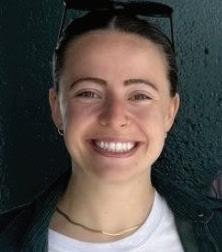
“
It’s always super exciting to get to work with your family, this is a very rewarding experience
Special Olympics has no upper age limit and no cap on participation.
“They’re going to be stuck with me for a while,” Sydney laughed, speaking of her commitment to the local program. “Volunteering makes my day better. It always reminds you of the impact you can have on people’s lives just by sharing a few hours of your time.”
While Sydney’s work has taken centre stage, volunteering for the Games is still a family affair. Her father, Lyn Hall, is co-chair of the organizing committee —reprising
the same role he held in 2001 when Sydney first got involved.
“It’s always super exciting to get to work with your family,” she said. “This is a very rewarding experience.”
Lyn, a longtime advocate for Special Olympics in Prince George, says he’s proud of his daughter’s dedication.
“She considers those athletes part of her circle of friends,” he said. “We’re very, very proud of her.”
Behind the scenes, the logistics of hosting the Games are immense: 10 sports, accommodations across four high schools, meals, transportation, and programming for up to 1,700 athletes, coaches, and support staff. Lyn and his co-chair, Renee McCloskey, lead a team of over a dozen directors working hard to bring it all together.
But for Sydney, the Games remain rooted in the athletes.
“My big takeaway is always about how hard they work and how excited they are,” she said. “They’re always so appreciative. They make it worth it every single time.”
Summer Games ambassador athlete is ready to compete in Prince George
CITIZEN PHOTO BY CHRISTINE DALGLEISH
Special Olympics athlete Marinka VanHage trains with coach Sylvia Masich at Masich Place Stadium on Wednesday,June 18,

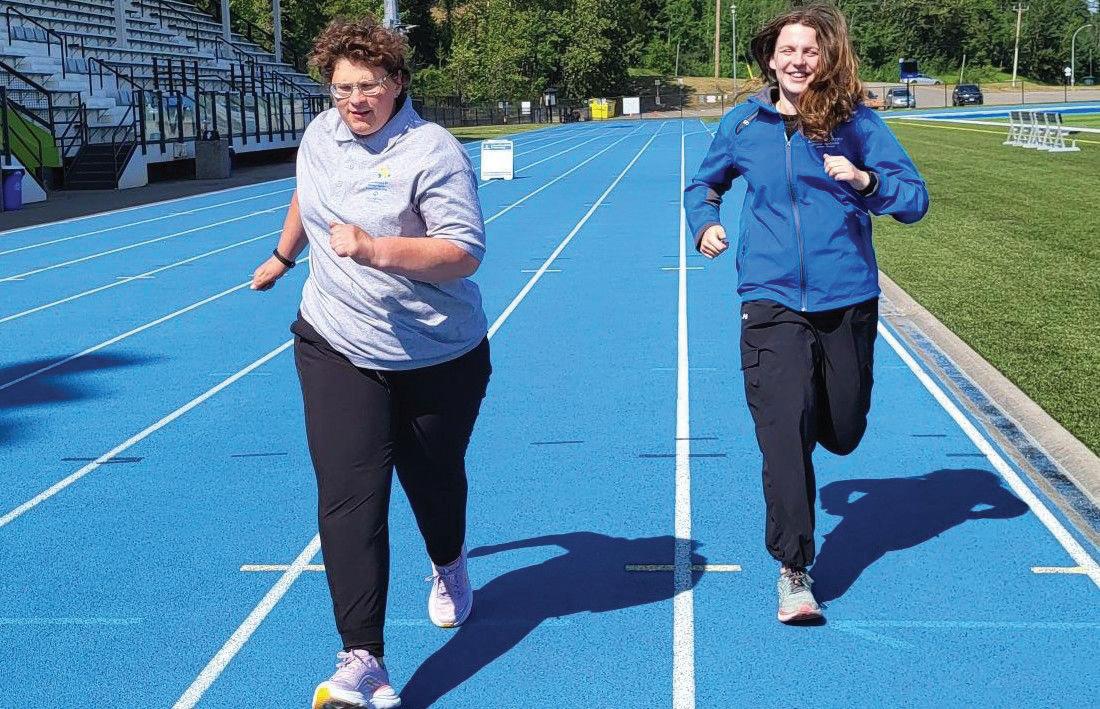
Christine Dalgleish Citizen Staff
As if participating in 12 Special Olympics sports throughout the year isn’t enough, Marinka VanHage took on another challenge to become one of three 2025 Special Olympics BC Summer Games athlete ambassadors.
Marinka will be competing in track and field at the Special Olympics BC Summer Games taking place in Prince George from July 10 to 12 that will see 1,100 athletes, along with their coaches and supporters from across the province and Yukon, come together for the competition.
“I don’t know what I would do if I didn’t have Special Olympics,” Marinka said.
“I train all year round with my fellow athletes who are my friends. I am very happy that the Special Olympics BC Summer Games are in Prince George so my family and friends can watch me.”
During the BC Summer Games Marinka will be at Masich Place Stadium competing in the 100m, 200m and 400m races and throw shot put and turbo javelin.
Coach and mom Wilma VanHage said at the track she’s coach and Marinka accepts her guidance very well.
“Marinka has this one pace when she runs and she hangs onto it, so she starts off slow,” Wilma explained.
That serves her very well especially in the 400-metre race because as with most athletes, people tend to start really strong at the beginning, she noted.
“And when they start to slow down Marinka will start to overtake them at
the 200- or 300-metre mark and it’s kind of fun watching the race,” Wilma said.
Marinka has a very busy life that is centred around the activities offered by the Prince George Special Olympics organization year round. Marinka’s list is impressive and includes swimming and powerlifting, floor ball, rhythmic gymnastics, curling, Club Fit (the mandatory program for competitive athletes), snowshoeing, 10-pin bowling, bocce, golf, soccer and, of course, track and field.
Because she went to eight qualifiers in anticipation of the Special Olympics BC Summer Games Marinka had a tough choice to make.
“I chose track and field because of my coach,” Marinka said with a smile, pointing at her mom.
Her favourite event in track and field is javelin.
“It’s very exciting to be in Prince George for the competition,” Marinka said.
Special Olympics Coach Sylvia Masich knows that ahead of competition Marinka likes to listen to Avril Lavigne’s song Fly about the inner strength and courage it takes when people face challenges. The song was released as a single to raise funds for Special Olympics and the video features Special Olympic athletes in action.
“It’s one of our favourites,” Sylvia said. “We listen to it on repeat when we’re snowshoeing.” That’s another sport Sylvia coaches Special Olympics athletes in.
Marinka and Sylvia have a special
coach-athlete relationship that is obvious when Marinka sees Sylvia and rushes to give her a hug.
They take to the track together to warm up and then train for Marinka’s upcoming races.
Sylvia and Marinka have made it a tradition to take a selfie every time they run together. There are a lot of selfies of those two on Sylvia’s phone. “We have a very special relationship,” Sylvia said
and Marinka smiled at her and nodded in agreement.
“I am proud to be an athlete in Special Olympics because I am part of a team and I am a role model and help people,” Marinka said. “It makes me happy to help people and you can help people too. You can volunteer. You can come and cheer and you can be a part of something great.”
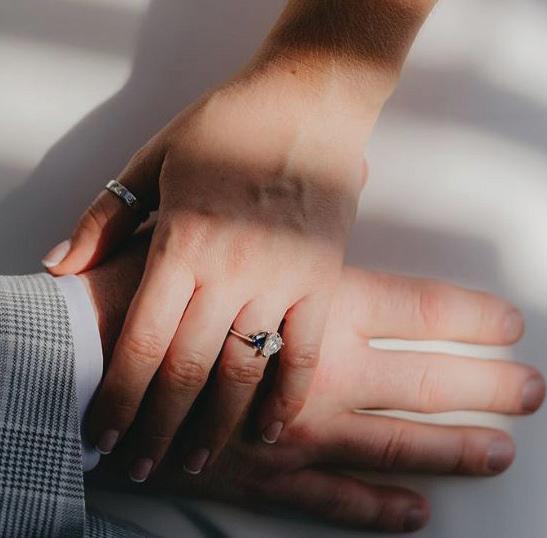
Local Special Olympics athlete and artist creates medal ribbon design
Christine Dalgleish Citizen Staff
Chase Caron, Prince George Special Olympics ambassador, athlete and artist, has created the medal ribbon design that will be seen at the 2025 BC Summer Games held in Prince George from July 10 to 12.
There will be 1,200 athletes with intellectual disabilities striving to earn a coveted medal in 10 different sporting events including basketball, in which Caron has chosen to participate for this Special Olympics BC Summer Games.
The medal ribbon’s design was unveiled in

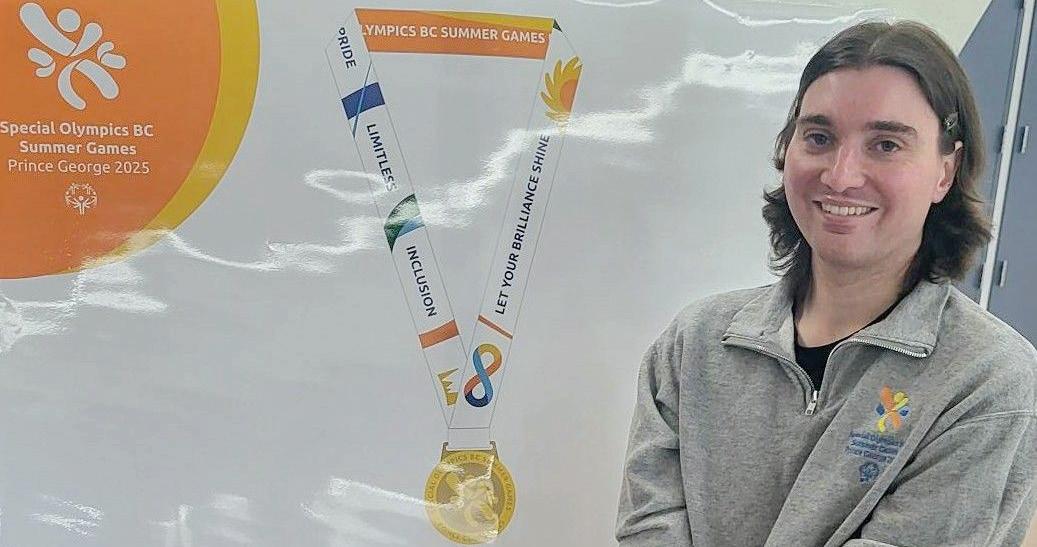
CITIZEN STAFF PHOTO
Chase Caron is the artist who created the medal ribbon design for the 2025 Special Olympics BC Summer Games. Caron is also an athlete who will compete in basketball at the games
May in the Civic Centre lobby with Shirley Bond, the Games’ director of public relations, introducing Caron.
“Athletes are coming here from all over the province to compete,” Bond said.
Those elements would showcase core values like inclusion, perseverance and teamwork, she added.
SPRING


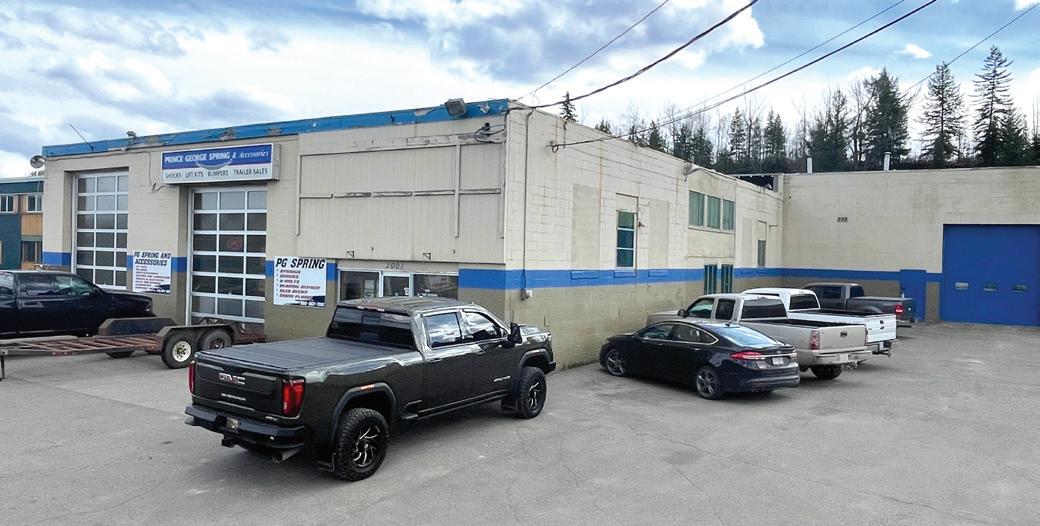

“They are athletes, they practise, they train hard and they want to win medals. So we are very proud to say that Chase Caron is competing in her fifth Special Olympics BC Games. She is also one of our athlete ambassadors and in addition to that — not just a talented athlete, she is also a talented artist, an illustrator, a cartoonist and she has agreed to share her skills to design the 2025 Special Olympics BC Summer Games medal ribbon.”
Caron, who has been involved with the Special Olympics program in Prince George for the last 12 years, participating in basketball, track and field, curling, soccer, snowshoeing, and the Club Fit program that is mandatory for competitive athletes, talked about each aspect of the ribbon that has the words “celebration,” “pride,” “limitless” and “inclusion” on it as well as the phrase “let your brilliance shine.”
There is an infinity symbol along with the colours that reflect the province and the Special Olympics logo.
“To design the ribbon for the medals I wanted to choose elements that represent Special Olympics as a whole,” Caron said.
“I also wanted to include the backgrounds of the province as this is an important competition for athletes all across the province,” Caron said. “So I incorporated the colours of the provincial flag as well as the colours of the Special Olympics BC Summer Games logo that includes summery colours like the orange and yellow, which are also meant to represent the Special Olympics flame. I also wanted to incorporate our Pacific Northwest colours like blue for the ocean and the sky.
“I hope the ribbon will make people feel a sense of accomplishment and pride and the award being won and all the trials and tribulations athletes have persevered through both practice and in competition. I hope it shows the skills and abilities of those Special Olympics athletes and I hope it shows pride in your team, pride in your province, pride in your own endurance and pride in yourself and how you developed your own skill sets.
“To me, Special Olympics provides a true experience of sportsmanship and teamwork. It is a place where people with intellectual disabilities can feel a sense of belonging and where we can experience the joy of competition and camaraderie. I thank everyone who is involved in Special Olympics and helps make these inclusive experiences possible.”

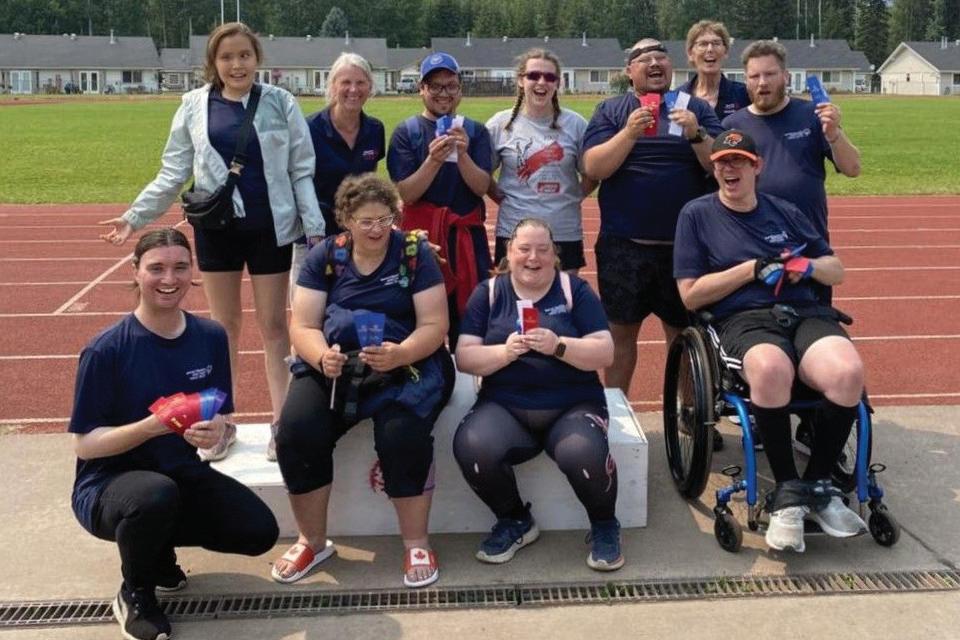
Special Olympics track and field athletes shine at Smithers meet
Christine Dalgleish
Citizen Staff
Getting a taste of what’s to come when the Special Olympics BC Summer Games takes place in Prince George from July 10 to 12, local Special Olympic athletes attended the Region 7 & 8 track and field meet hosted in Smithers on June 21 and 22.
Eight Prince George Special Olympics athletes competed in the 100, 200 and 400 metre races as well as standing long jump, running long jump, mini javelin and shot put while wheelchair athlete Tyler Lefebvre raced in the 25 and 30 metre slalom.
Track and field coach Sylvia Masich said Lefebvre was able to use a lighter wheelchair that was easier to manoeuvre during the competition and earned his personal best times in both races.
Other athletes who attended include Chase Caron, Audrey Nelson, Dallas Poole, Spencer Rourke, Leif Skuggedal,
Adam Spokes and Marinka VanHage.
Lefebvre, Rourke and VanHage will be competing in track and field at the Summer Games, as will Randella Willier, who did not attend the Smithers track meet.
All the athletes did very well, some of them achieving personal bests as Lefebvre did, Wilma VanHage said in a recent press release.
“It is amazing how a competition makes the athletes more competitive than if they are competing against their fellow Prince George athletes,” VanHage said.
“This was a great opportunity for the athletes who will be competing in Track and Field in the upcoming 2025 SOBC Summer Games being held in Prince George July 10-12. It gave them a feeling of what it will be like to compete and how to handle themselves under the excitement of a competition. It was a very successful weekend for everyone.”

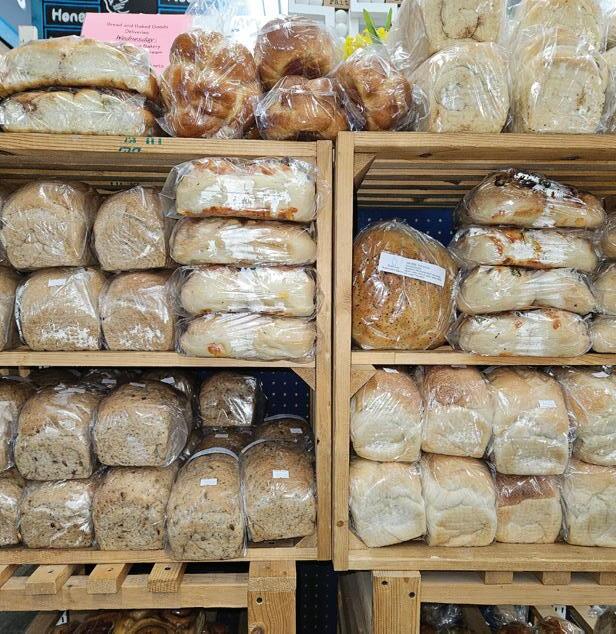
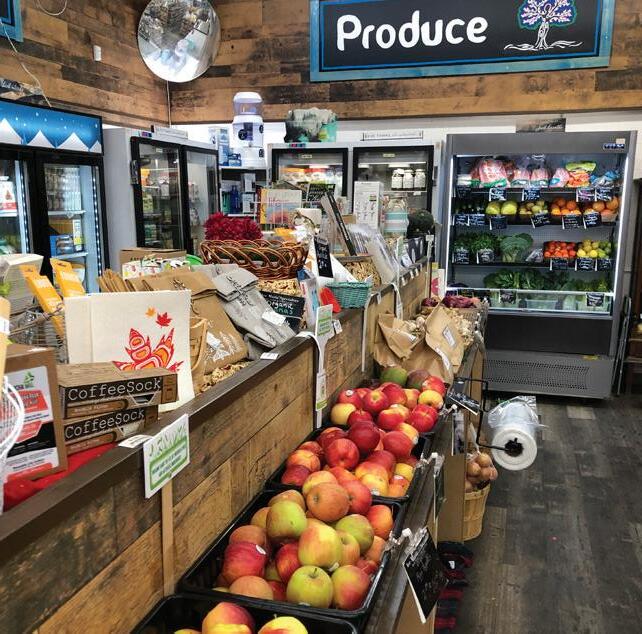
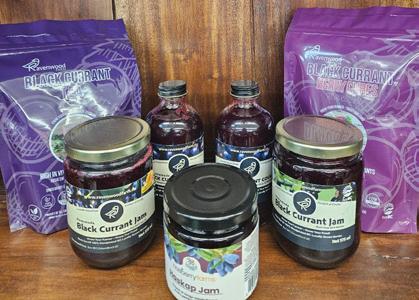
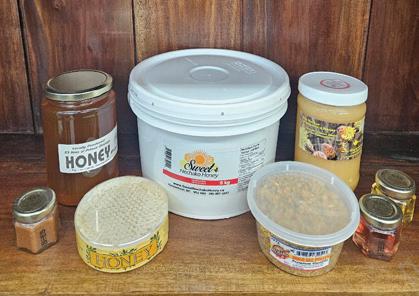
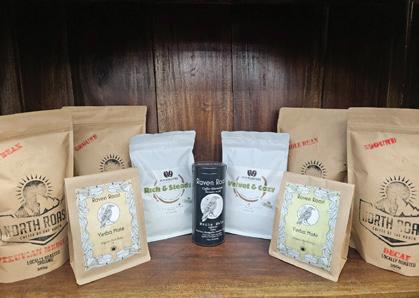
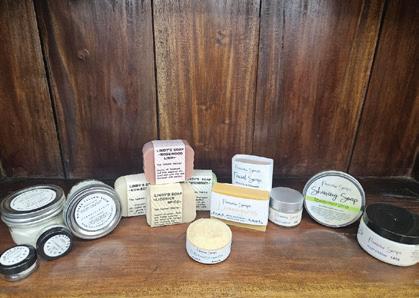
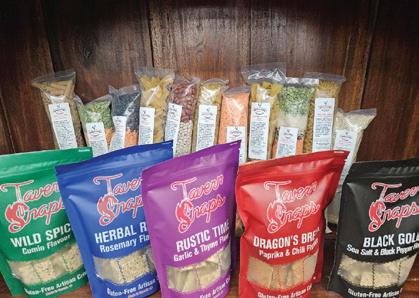
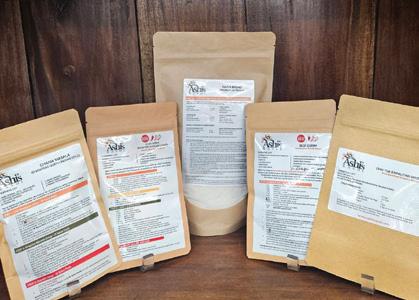

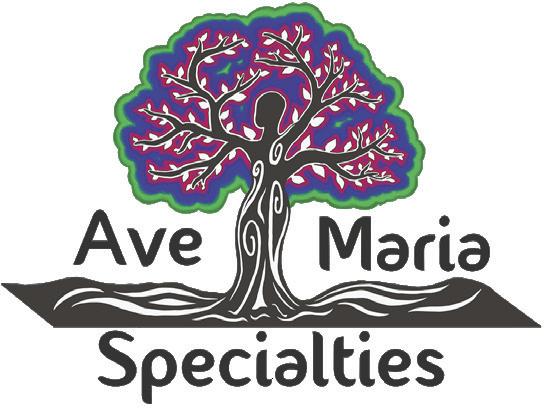
39 years of coaching Special Olympics athletes in rhythmic gymnastics
CITIZEN PHOTO BY CHUCK NISBETT
Darcie Muzychka works with the ribbon as coach Dee Neukomm takes her through exercises during practice in the gym at AimHi Thursday, June 12.
Christine Dalgleish Citizen Staff
Dee Neukomm, one of the founding members of the Prince George Special Olympics organization, has been coaching Special Olympics rhythmic gymnastics athletes for the last 39 years.
This year Special Olympics BC Summer Games will be held in Prince George from July 10 to 12 and see more than 1,100 athletes with intellectual disabilities from BC and Yukon come together to proudly compete in 10 sports and be celebrated for their efforts.
This is the third time the City of Prince George has hosted Provincial Games for Special Olympics BC.
Special Olympics BC offers yearround sports programs for people with intellectual disabilities of all ages and ability levels in 55 communities across the province.
Special Olympics started in Prince George in August 1986.
“I saw the notice in the newspaper that there was going to be a meeting about it and our daughter, Lara, was Down syndrome and she was 13 at the time and was really
wanting to participate in sport,” Neukomm recalled.
“But she wasn’t at the level that allowed her to be a part of a lot of different sports. I hadn’t heard of Special Olympics before that so I just went to this meeting and there were four of us moms there and it went from there.”
The other three mothers were Ivy Whitfield, Mabel Cotts and Sheilagh Blacklock.
Lara, Neukomm’s daughter, love to swim and that was her main sport while she also participated in rhythmic gymnastics which was started as a Special Olympics sport in February 1989.
“I didn’t have a clue what rhythmic gymnastics was but the local coordinator at the time said it might be a good sport for me to coach so I gave it a try and I loved it but the unfortunate thing was just as we were to start Lara was diagnosed with Leukemia,” Neukomm said.
“That was a huge issue because she ended up in Children’s Hospital in Vancouver so I wasn’t able to be here and one of the moms took over and it was just one group routine with six athletes and when I came

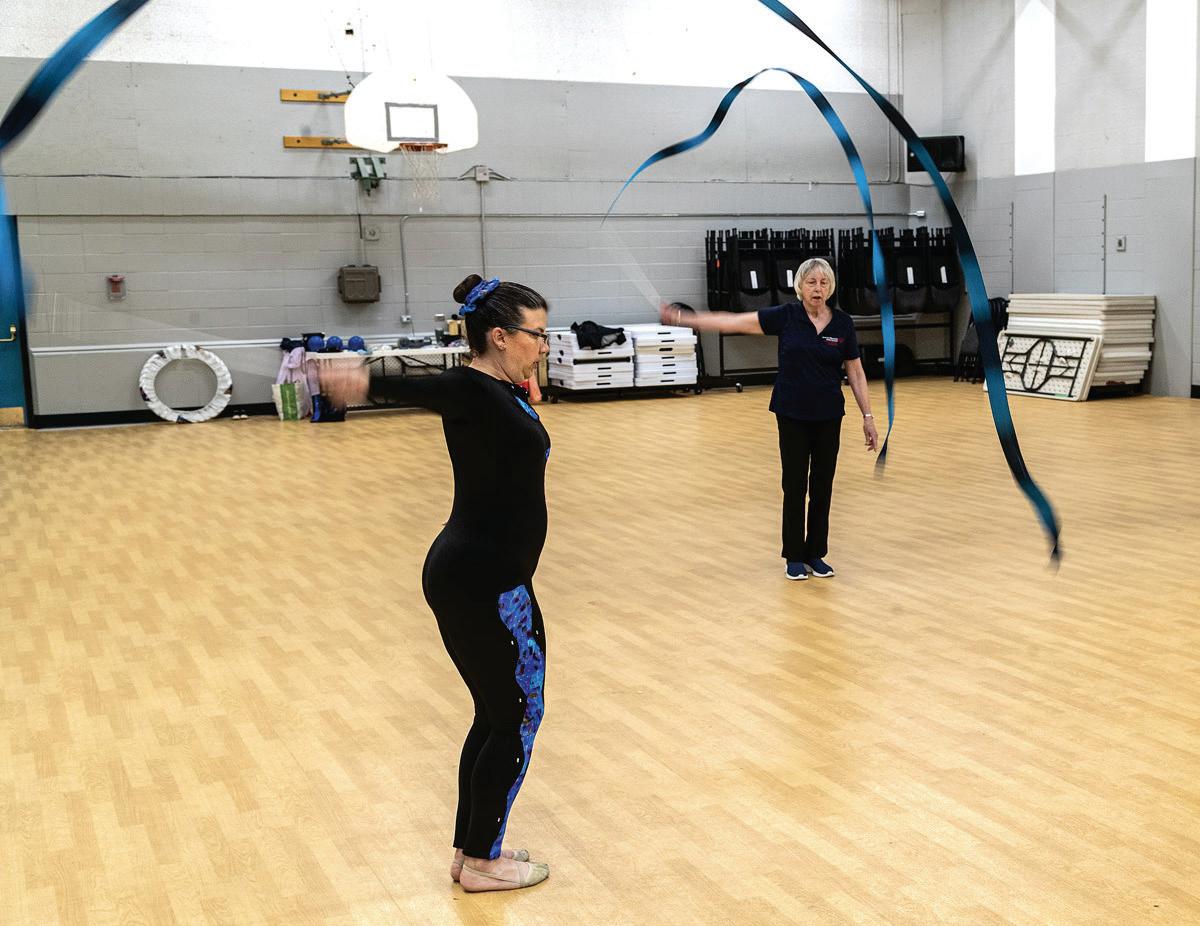
back with Lara it was May and she was put on the rhythmic gymnastics team because she couldn’t compete in the swimming because she was going through chemo treatment.”
In 1989 Prince George Special Olympics athletes competed in the BC Summer Games held in Campbell River.
“When we started out in 1986 we only had swimming and track and field,” Neukomm said.
Then five-pin bowling and other sports were added over the years including rhythmic gymnastics.
Neukomm said she remembers there were only four teams competing in Campbell River in 1989 and because the construction site across the street from the gym caught fire they were evacuated after only doing one routine.
“The Prince George team was awarded the gold medal and we moved on to the National Games in Vancouver in 1990,” Neukomm said.
“Lara was able to participate in that and it was a very special event because she got to light the flame for the National Games and I was just so proud to be there as her
mom and coach. So that was huge and that year she was also chosen as National Female Athlete of the Year so we got to go to Toronto in December for a lovely gala. Lara had actually qualified for the 1991 World Games, which were held in Minneapolis in July, but Lara passed away in April — she had relapsed and her body just couldn’t take it but she was a fighter.”
Needless to say it was difficult for Neukomm to go back to coaching the rhythmic gymnastics team without her daughter.
“The athletes were very sad because of Lara’s passing but I knew we had to carry on — the athletes had to carry on and I had to carry on, so I just kept going after that,” Neukomm said.
“It’s very special to me to coach these athletes — just to see the advancement, the ability of all the different athletes because they all have a different level of ability, and to be able to work with them – to bring all that out is a wonderful experience.”
When Neukomm made the decision to continue coaching rhythmic gymnastics she took every Special Olympics course and every coaching
course that was available to her.
“And I went as high as I could go and by this time we had different apparatus, different routines at different levels and at one time I had 35 athletes so it was a pretty big program,” Neukomm said.
It took a lot of volunteers to manage so many athletes so there were many assistant coaches, she added.
In 2001 Neukomm had 14 athletes that qualified for the Special Olympics BC Games and at that time there were four different levels — 1, 2, 3 and 4. In addition to those categories there is now a wheelchair level, a level where athletes learn routines but they don’t move and another level where there’s a little more movement and it’s a little more difficult and after athletes complete those levels they can then move onto Level 1, Neukomm explained.
Athletes perform on the floor with an apparatus including hoop, ball, clubs, ribbon and rope. Athletes must be strong, flexible, agile and coordinated because there’s a lot going on during a routine.
“It is a challenging sport,” Neukomm confirmed.
“First of all there’s all the body skills they have to learn and then all the apparatus skills – there are five different apparatus and then they memorize the routines that are set to music and then during competition they are judged on their own. So they are out on the floor by themselves and it’s not the strongest or fastest — it takes a lot of courage to get out on the floor by yourself in front of anywhere from six to eight judges, when it’s a big competition and I admire all the athletes and it’s such a great experience for them.”
Right now Neukomm has 20 athletes in rhythmic gymnastics and they are always kept on their toes throughout the years.
routines change every eight years and have been choreographed by a group of people, including coaches and judges within the Special Olympics International program that is headquartered in the United States and along with the new routines comes another avenue athletes can explore called floor.
“So in 2023 we changed routines and so the athletes have to learn those and to compete they have to learn five routines, four apparatus and one floor, so that’s been a bit of a challenge to add another new element,” Neukomm said.
“But they work at it and we do it. They always work to be the best they can be and that’s all I ask.”
Neukomm coaches rhythmic gymnasts who are just learning at the lower levels and Level 1 for an hour on Tuesdays, then on Thursdays it’s Level 2, 3 and 4 athletes for two hours. The athletes have to work through each level before moving on to the next so the majority of the athletes are at Tuesday practices.
Special Olympics programs are seasonal and year round depending on the sport and rhythmic gymnastics ongoing practices take place at AiMHi gym but as the BC Summer Games set for July 10 to 12 approach the City of Prince George offered competitive rhythmic gymnasts the chance to get used to the Civic Centre floor as that’s where they will compete.
There’s nothing more comforting to an excited athlete than competing where you practice.
Having coached rhythmic gymnastics for 39 years there have been some long relationships built, Neukomm noted.
Darcie Muzychka is the rhythmic gymnast who has steadfastly been part of the team the longest.
“I think Darcie was 16 when she started and she’s around 40 now,” Neukomm smiled fondly.

Darcie, Level 4, will be competing at the BC Summer Games along with Angela Hills, Level 3, and Michaela Samsonoff, Level 3, who are coached by Neukomm. BC Summer Games Head Coach Annaliise Wilson and Assistant Coach Megan Klotz from Quesnel and Quesnel athlete Cheyanne Wards, Level 1, will also be representing Region 8 at the Games.
“I have been very fortunate to be able coach at every provincial games since 1989 every four years to 2013 and then I’ve also been very fortunate to have been head coach for athletes going to National Games and that was every four years from 1990 to 2014 and I’ve been lucky to have gone to World Games in 1991, 1995 and 1999 and 2003 and I didn’t have any athletes going in 2007 but I was head coach and that was in Shanghai and then I didn’t apply after that. It was time for the younger coaches to be able to get into coaching at the higher levels. I had some awesome experi -
ences and I was always very proud of the athletes who competed at all levels.”
From Special Olympics BC Summer Games held in Prince George athletes can move on to the National Games held in Medicine Hat, Alberta, next summer.
“And I am hoping to go there as a spectator because I was born there,” Neukomm said.
“And I have some great expectations that my athletes will be there.”
For Neukomm coaching rhythmic gymnastics athletes has been her passion.
“I’ve been doing this since 1989 and I never thought I would still be here 39 years later,” Neukomm said.
“It’s been a very special part of my life.”
For more information visit www.SOBCGames.ca

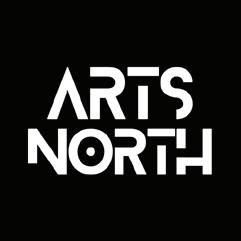
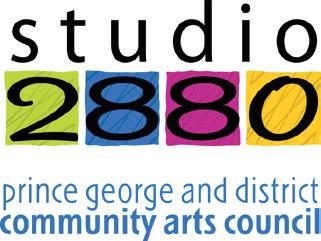
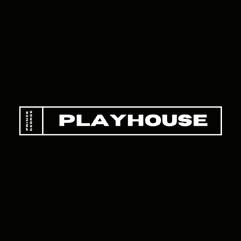
Special Olympics coach has strong connection to track and field
Special Olympics coach Sylvia Masich is seen here with Special Olympics athlete Marinka VanHage as they practice shot put at Masich Place Stadium on Wednesday, June 18.
Christine Dalgleish Citizen Staff
Track and field coach Sylvia Masich shares a rich legacy in sport with her family.
Track and field icon Tom Masich is Sylvia’s legendary grandfather. Masich Place Stadium in Prince George is named in his honour, recognizing his significant contributions to athletics in the region.
“There’s a quote I read that says, ‘You are influenced by the conversations you have at the dinner table,’ and I was very much influenced by my parents and my Grandpa Tom to get into coaching and into track and field,” Sylvia said.
Sylvia is currently a Special Olympics coach for athletes in track and field in Prince George. Right now, her athletes are preparing to compete in the Special Olympics BC Summer Games, set for July 10 to 12 at Masich Place

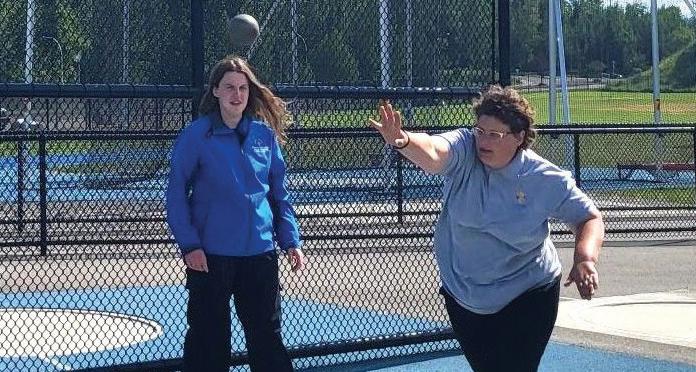
pics through speed skating.
Sylvia’s love for athletics started early.
“When I was six weeks old, my parents hauled me to Edmonton to watch the World Championships in Athletics in 2001,” she said. “My parents met because of track, and it’s played a really huge role in my life. Coaching has been a big part of that.”
Sylvia found her way to Special Olym-
“I was at a competition in Edmonton, and there were Special Olympics athletes participating in a relay,” she recalled. “They wanted some of the other athletes to join in so they felt more included.
“That was the most fun I had all season. Everyone — athletes, volunteers, coaches — was so excited. After that experience, I realized I wanted to coach track and field with Special

Stadium.
CITIZEN PHOTO BY CHRISTINE DALGLEISH

Olympics.”
Sylvia has been coaching off and on for about eight years. Her coaching journey included time away for school and a pause during the pandemic.
“But I started with Special Olympics when I was 15,” she said.
And her coaching roots go even deeper.
“I grew up at the track. Both my dad, Bill, and Grandpa Tom were coaches,” she said. “Track was my second home. I did track growing up, and I also did speed skating — those were my two main sports. My mom, Corine, was my speed skating coach, and my dad was involved on the officials’ side. I saw firsthand how impactful it is to be involved in sport not only as an athlete but also as a coach and official. I wanted to be part of that.”
At age 12, Sylvia began coaching speed skating as a junior coach.
“I absolutely loved it. That spring, I
started coaching Track Rascals at the Prince George Track and Field Club. That turned into me becoming head coach of Track Rascals at the ripe old age of 13,” she said, laughing.
“My passion and love for coaching just blossomed from there. I think a lot of it stems from my Grandpa.”
Sylvia has also organized the local Terry Fox Run for the past three years, another role she took on because of her connection to her grandfather.
Terry Fox ran in the 1979 Prince George to Boston Marathon, now known as the Labour Day Classic, which Tom Masich and Dick Voneugen organized. That run helped Fox believe he could take on the Marathon of Hope. Sylvia wants to keep his legacy alive in Prince George.
She also has a clear philosophy when it comes to coaching.
“If the athletes aren’t having fun, they won’t want to participate,” she said.
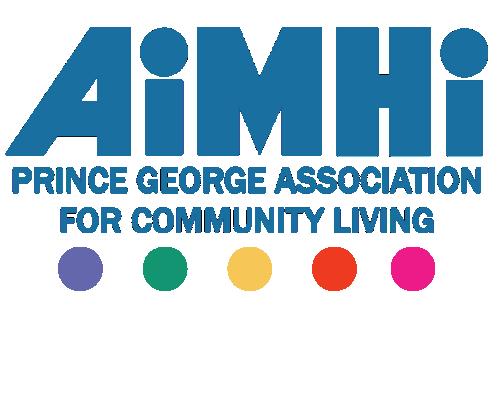
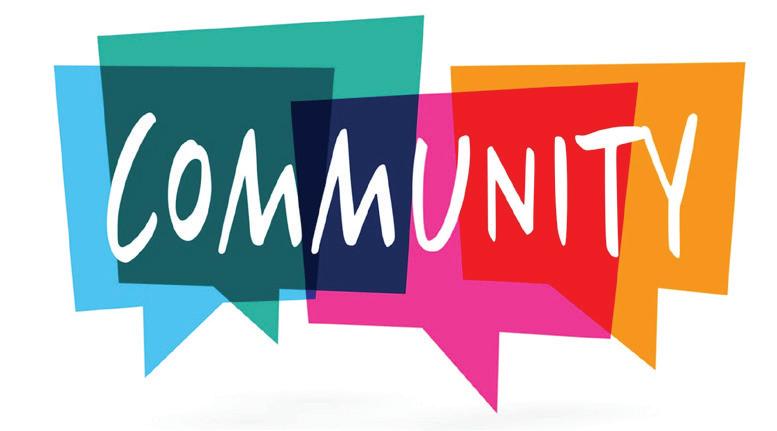
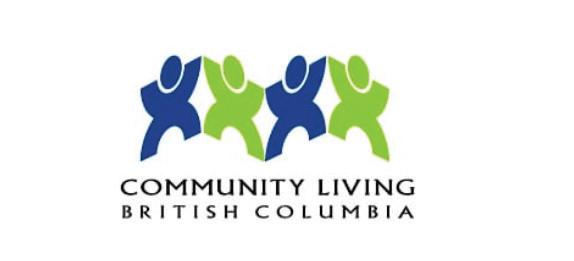
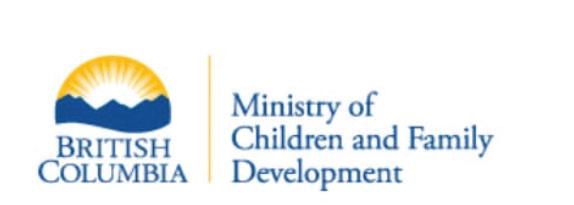

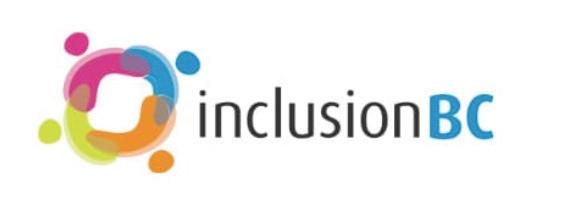

“So we’re here to have fun, try our best, and at the end of the day, that’s what matters most.”
Sylvia will also serve as the track and field assistant sport manager during the Special Olympics BC Summer Games.
“A lot of my role will happen on game day,” she explained. “Many of the coaches have never been to our facility, so I’ll be helping answer questions — where things are, what the space looks like. It’ll be busy, and I love that. It’ll feel surreal because I’ll be doing what my Grandpa used to do at track meets. I think he even held the same position when the Games were here before, so it’s a full-circle moment.”
Elena Thomas, sport chair for the Special Olympics BC Summer Games, said Sylvia’s deep knowledge of track and field made her a natural choice for the role.
“She grew up at the track and has experience with Special Olympics. The only thing she hadn’t done was
run a meet, so I asked her to be my assistant,” Thomas said.
Thomas is also looking ahead to the potential of Prince George hosting the 2030 Special Olympics Canada Summer Games, now that the city is on the shortlist.
“If there’s another Games in Prince George, Sylvia will be able to run it and I’ll be her assistant,” Thomas said. “She’s young, she knows track and field — she just has to do it all once, and then we’ll have an amazing pillar in the community. That’s why I asked her. She’s the perfect fit. She’s really amazing.”
Sylvia is encouraging everyone to attend the upcoming Games.
“If you have the chance, come down and watch these incredible athletes from across the province and the Yukon,” she said. “They’re some of the coolest people you’ll ever meet. You’re going to leave feeling full-hearted and happy, so come on down.”
ONE COMMUNITY • ONE VISION
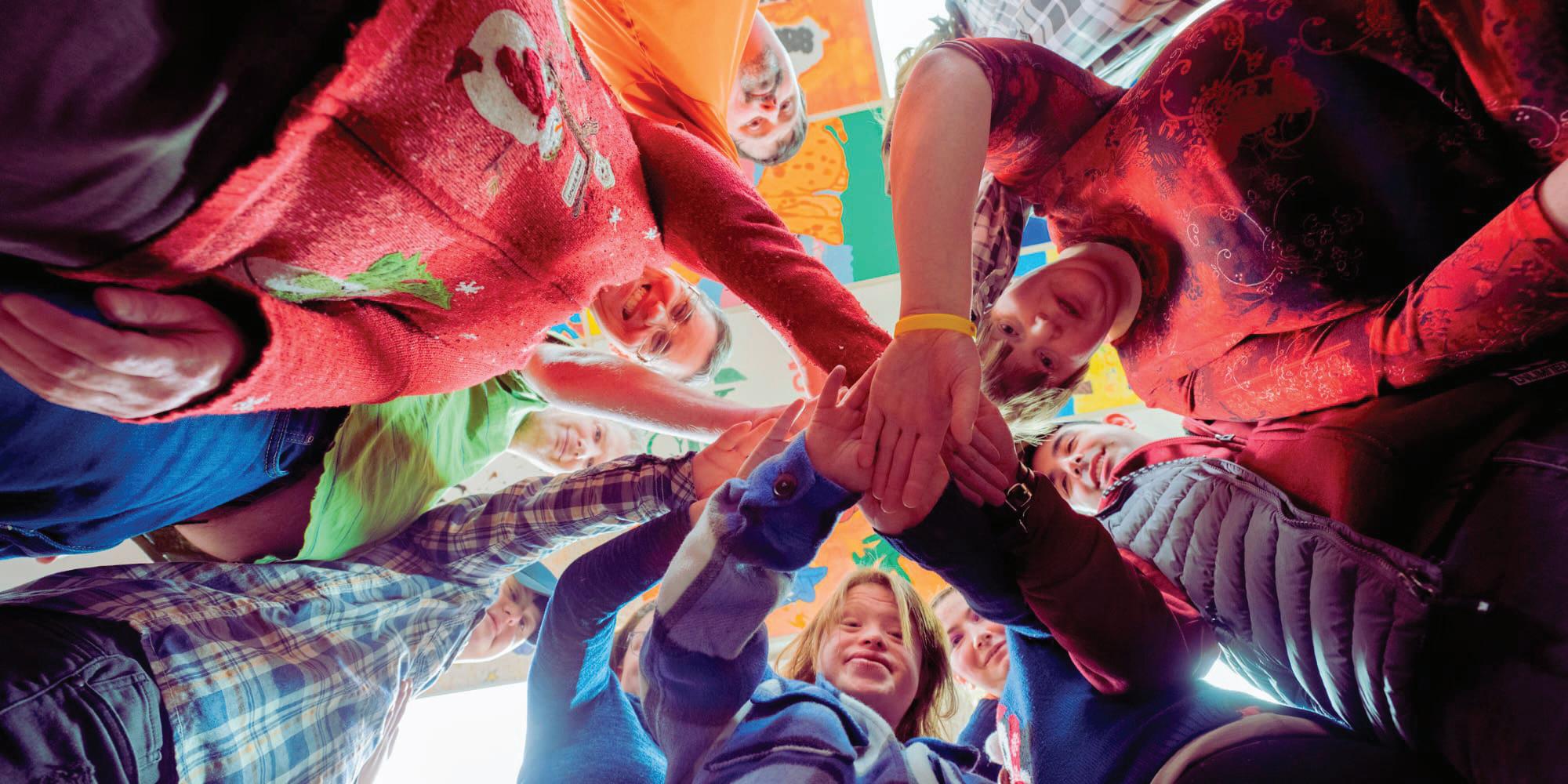
Mackenzie powerlifter ready for Special Olympics BC Summer Games

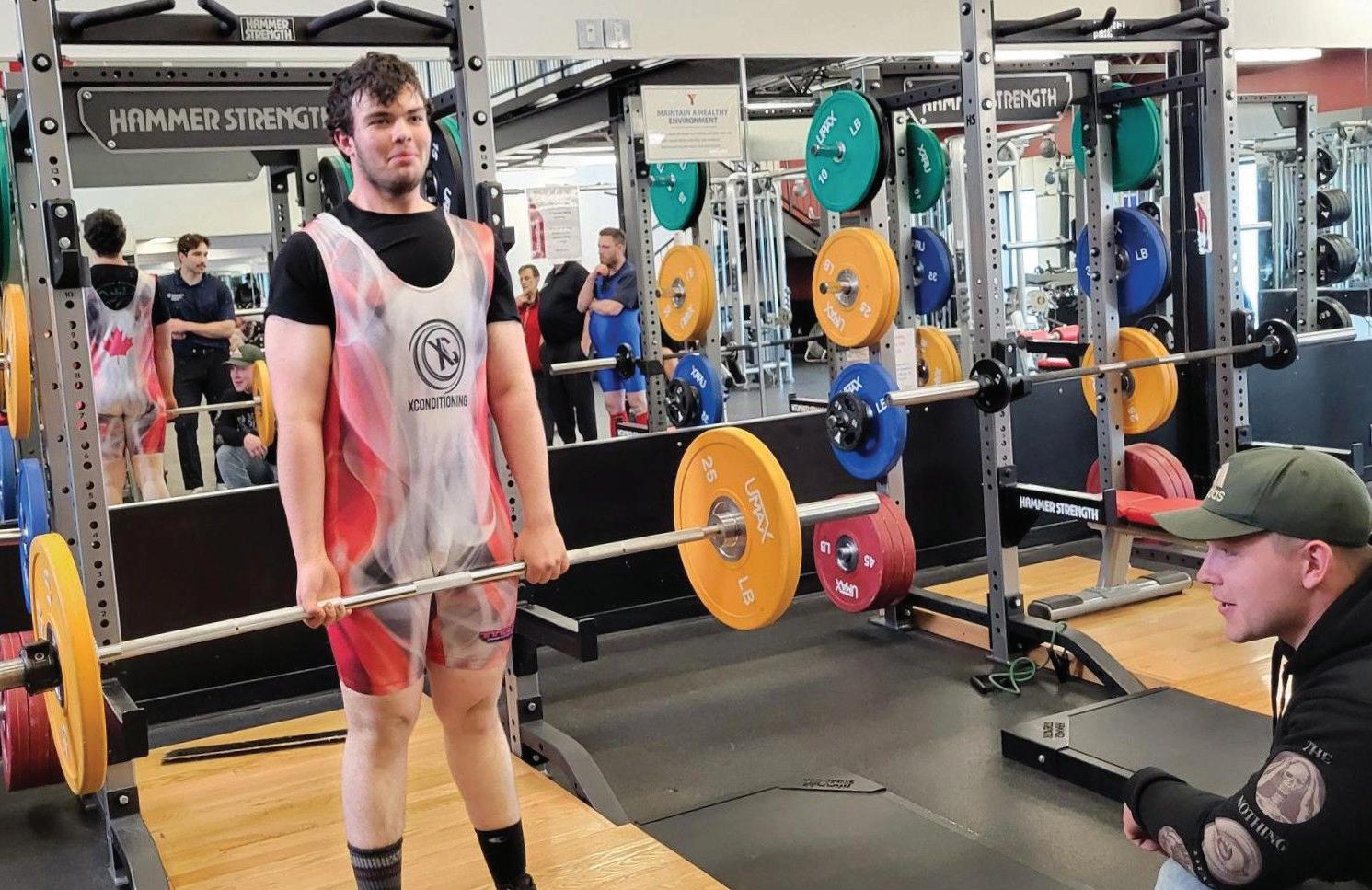
Christine Dalgleish Citizen Staff
No luck, all work.
That’s what it says on the back of his T-shirt and there’s no bigger
truth for Pierce Northcott, 16, who is a determined powerlifter competing at the Special Olympics BC Summer Games set in Prince George from July 10 to 12.
“We were looking at the record
books for the Special Olympics and we’re thinking he might set a record at the Games,” said Northcott’s coach, Bryce Surgenor.
They both live in Mackenzie and came to Prince George to get
together with other members of the Region 8 powerlifting team at the Prince George YMCA on Tuesday, May 6.
Northcott lifts 297 pounds in squat, 159 pounds in bench and a
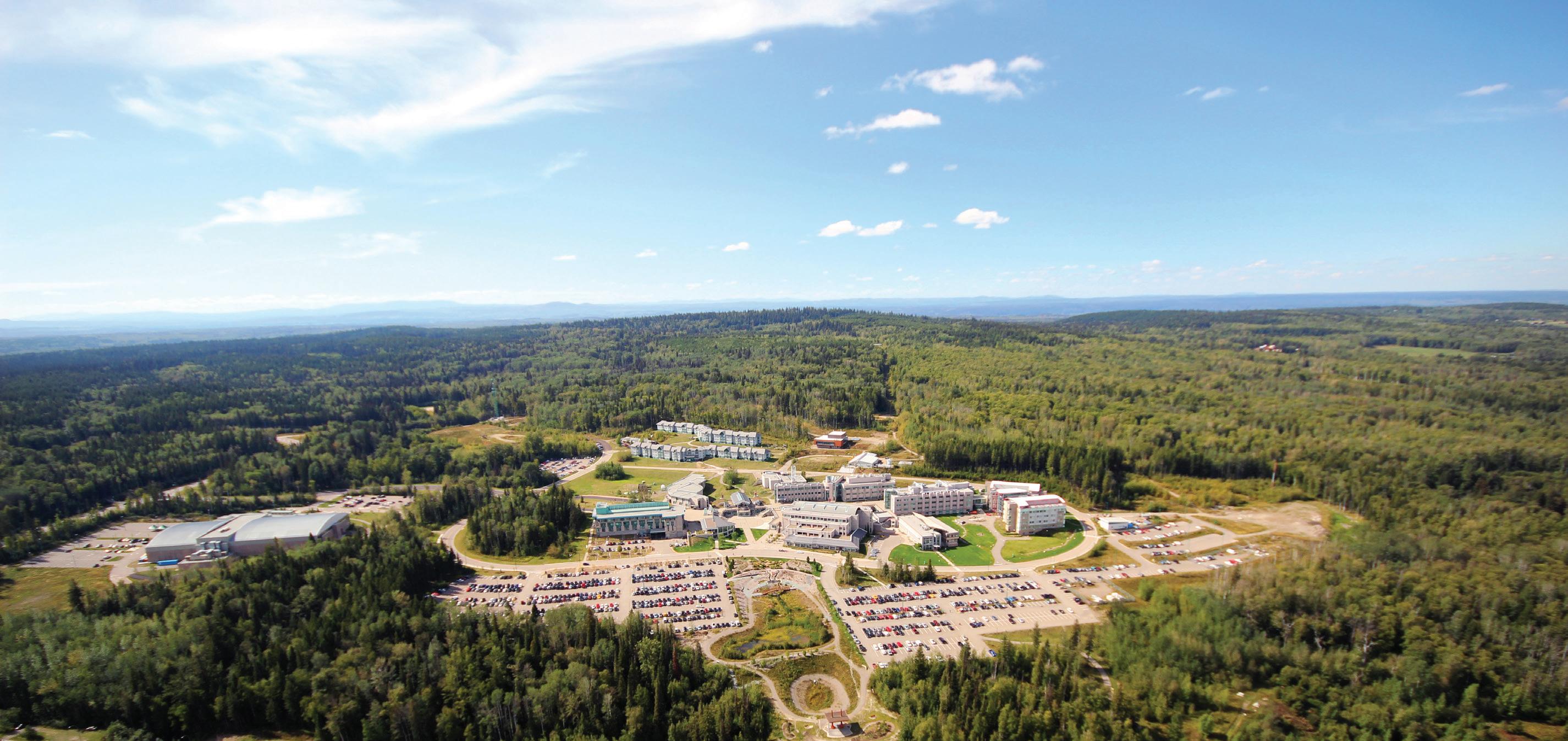
You trained. You competed. You conquered. Way to go!
CITIZEN STAFF PHOTO
Mackenzie athlete Pierce Northcott demonstrates the deadlift with Coach Bryce Surgenor looking on. Northcott is competing at the Special Olympics BC Summer Games in Prince George.
PRINCE GEORGE CITIZEN
whopping 420 pounds in deadlift.
“Northcott is the most coachable athlete I have ever seen,” Surgenor said.
It all started for Northcott when he wanted to get strong in Grade 8 so he began weight training.
“I didn’t know what to do so I just did my legs for a whole year,” he said. “Then my mom told me about powerlifting and I said OK, I’ll try it and I fell in love with the sport. Bryce told me how to do deadlifts and the training got my arms bigger.”
Surgenor is a certified personal trainer and when there was a Special Olympics Expo in town he said he thought he would volunteer to coach.
He had coached another athlete with autism in the past.
“And I thought, ‘why not?’” Surgenor said.
SPECIAL OLYMPICS BC SUMMER GAMES
“Pierce is a pretty incredible athlete and it’s not going to be long and he’ll be stronger than me.”
“I’m happy I have a coach like Bryce,” Northcott countered.
“Anything he wants me to do, I do it. I always follow orders and I made it this far and my goal for my deadlifts is 600 lbs.”
How do you get from 420 pounds to 600?
“You have to get creative,” Surgenor smiled. “We’ll have to try out all sorts of different techniques and programs just trying to milk out an extra couple pounds of strength. We do progressive overload so you just try and get a pound stronger every week. You can always add a pound. If you can do 400 you can do 401 and that adds up.”
Of the three powerlifting components, Northcott favours two.

“I definitely like deadlifts and bench press,” he said.
When it comes to competing there’s a single-mindedness to Northcott’s approach.
“I just focus and I just do it,” he said. “I don’t worry about nothing else. I just focus, don’t worry about the weight and I just lift it.”
“He’s got an excellent mindset,” Surgenor added.
Surgenor started powerlifting when he was 13, following in his brother Tyson’s footsteps.
“He’s super fit and was just at the RCMP Depot and he got one of the highest fitness scores you can get,” Surgenor said. “And that didn’t surprise me. He shows me up every day.”
Northcott said that when he first started training with Bryce he was different than he is now.
“I had tons of fat until he trained me,” Northcott said.
When it comes to getting stronger, there is no typical workout, Surgenor explained.
“It’s always changing but we usually start out with our main heavy lifts, then we’re going to do more assistance exercises, hit weak points, target muscles that may get underworked by those exercises. And we also periodize it where we’ll have a light week, a medium week and a heavy week. We leave no stone unturned.”
“I also lift tires as part of my workout,” Northcott said with a twinkle in his eye.
NOTE: This article originally appeared in the May 17 edition of The Citizen. It has been updated for this special section.

Special Olympics BC brings Healthy Athletes Screening Program to Games
SUBMITTED PHOTO
A health-care professional checks out a Special Olympics athlete during a health screening. The service is being offered in Prince George for athletes and non-athletes with intellectual disabilities.
Matthew Hillier Citizen Staff
The Special Olympics Healthy Athletes Screening Program will be coming to Prince George during the Special Olympics BC Summer Games.
The program offers athletes and local non-athletes with free medical screenings from trained professionals who understand the specific needs of individuals with intellectual disabilities.
According to Special Olympics
Wishing all of the Athletes the best of luck at the 2025 Special Olympics BC Summer Games!

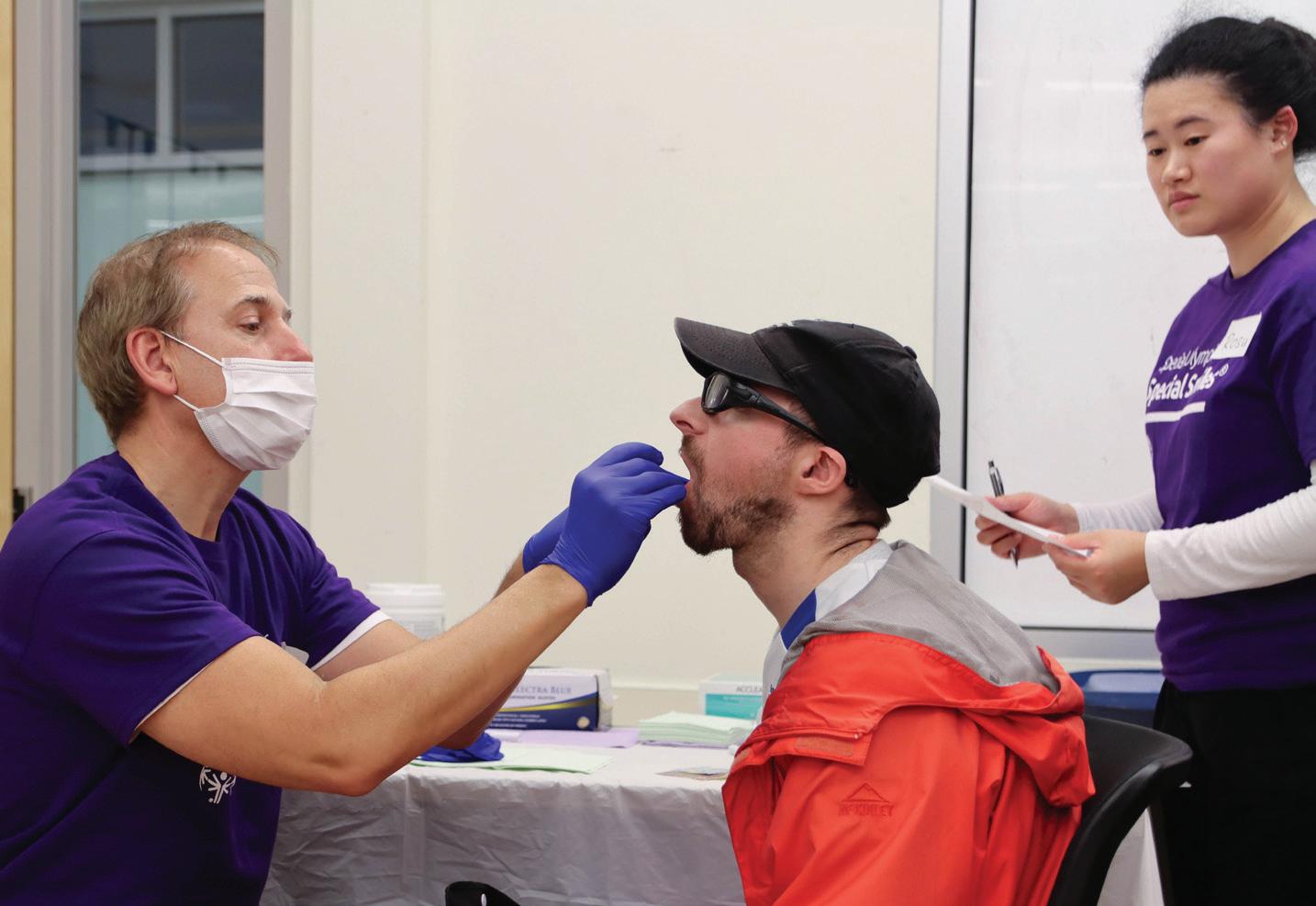
International, individuals with intellectual disabilities are 40 per cent more likely to experience health issues, and only one in 50 doctors are qualified to care for them.
The Healthy Athletes Screening Program was developed to help address these critical gaps in healthcare access.
Research conducted by Special Olympics BC (SOBC) during a wellness day in 2011 highlighted how essential these screenings can be:
• 75 per cent of participating athletes had untreated gait abnormalities
• More than 67 per cent had foot-related skin or nail conditions
• Nearly 30 per cent had eye disease
• Just over 20 per cent experienced mouth pain, had missing teeth, or had bone deformations in their feet
• Nearly 15 per cent required urgent dental referrals
“Oftentimes in the traditional healthcare system, our athletes and other people with intellectual disabilities can be overlooked or face difficulties communicating their needs,” said Macklem. “That leads to a lack of adequate healthcare for those individuals.
“The Special Olympics Healthy Athletes program was designed specifically to address those issues. Special Olympics trains volunteer healthcare professionals to deliver health screenings and education to people with intellectual disabilities. They’re trained to look for things that other healthcare providers may not have been trained to identify in traditional pathways, and that helps them catch issues that might otherwise go unnoticed.”
While the screenings themselves do not provide immediate treatment, the program works closely with local healthcare professionals to ensure referrals are made when necessary.
Macklem told The Citizen that many individuals with intellectual disabilities face barriers when accessing care.
© 2025 McDonald’s
Bailey Macklem, SOBC’s health co-ordinator, explained why this program plays such an important role.
“A lot of time, our athletes will have healthcare-related anxiety,” said Macklem. “That could have
stemmed from a negative experience in the past, or maybe they’re just fearful from the beginning, and that prevents them from communicating their issues.
“Sometimes our athletes aren’t aware that their symptoms are healthcare issues. If they’ve lived with something for a long time, they may not realize it’s a problem. And some of our athletes are non-verbal, so they face communication challenges that way too.”
The program has already resulted in numerous success stories. One athlete was found to have significant foot decay and was sent for immediate treatment. Another had severe tooth decay identified during a screening.
“An athlete went to our hearing screening after coaches complained that they couldn’t hear them or always had to shout,” said Macklem. “They found out the athlete had excessive earwax blocking their ear canals. That’s not uncommon in our population,
especially for those with intellectual disabilities linked to physical differences.”
Peter Goudal, a coach, parent, and local Special Olympics coordinator, said the screenings have made a difference in his son’s life.
“My son, it’s always been a challenge because he’s very low verbal,” said Goudal. “He’s 23 now, and it’s improved over the years, but he’s still very hard to understand. When you get your eyes checked in school and can’t enunciate the letters properly, it’s hard for anyone to know what you’re seeing.
“At the Healthy Athletes screening, they used special techniques to figure out what he was seeing. I didn’t even know this — he ended up being long-sighted. They prescribed him a pair of everyday glasses to help with his vision.”
As a long-time supporter of Special Olympics, Goudal has seen how the
Welcome to Prince George!

program boosts athlete confidence and well-being.
“Believe it or not, these athletes do care about their health,” he said. “They actually look forward to these screenings. Some are shy or anxious about accessing healthcare services. That’s part of their condition, and if they don’t have an advocate, they might never get checked out.
“They love being seen and cared for during the Healthy Athletes component.”
Goudal added that many doctors lack the training or tools to effectively treat people with intellectual disabilities.
“Communication and understanding are key,” he said. “Some doctors aren’t trained to understand what a person with a disability is trying to tell them. It takes a good ear and a lot of patience. The medical system is stretched, and not all athletes are connected to a family doctor. The ones who are love their doctors and get the help they
Proudly located on the traditional territory of the Lheidli T’enneh First Nation, whose name means "where the two rivers flow together," our city stands at the confluence of the Nechako and Fraser Rivers, surrounded by rolling foothills and endless forests. For thousands of years, this land has been a gathering place, a space for people to come together in the spirit of community, competition, and celebration.
With world-class sports facilities, a vibrant arts scene, and over 100 parks within city limits, there's always something to explore. We’re proud to host the games at our parks and facilities, including the CN Centre, Prince George Conference & Civic Centre and Canada Games Plaza, Masich Place Stadium, Prince George Aquatic Centre, and outdoor sports fields.
need. But the ones who aren’t connected — those are the ones I worry about.”
The Healthy Athlete Screening Program offers screenings in six areas:
• Fit Feet (podiatry)
• Health Promotion (general wellness and health education)
• Healthy Hearing (audiology)
• MedFest (sports physical exam)
• Opening Eyes (vision, in partnership with Lions Clubs International)
• Special Smiles (dentistry)
The screenings will be held on the second floor of the Prince George Civic Centre on Friday (athletes), July 11 from 1 to 9 p.m., and on Saturday (public), July 12 from 9 a.m. to 4 p.m.
For more information on Special Olympics BC and the Healthy Athletes Screening Program, visit
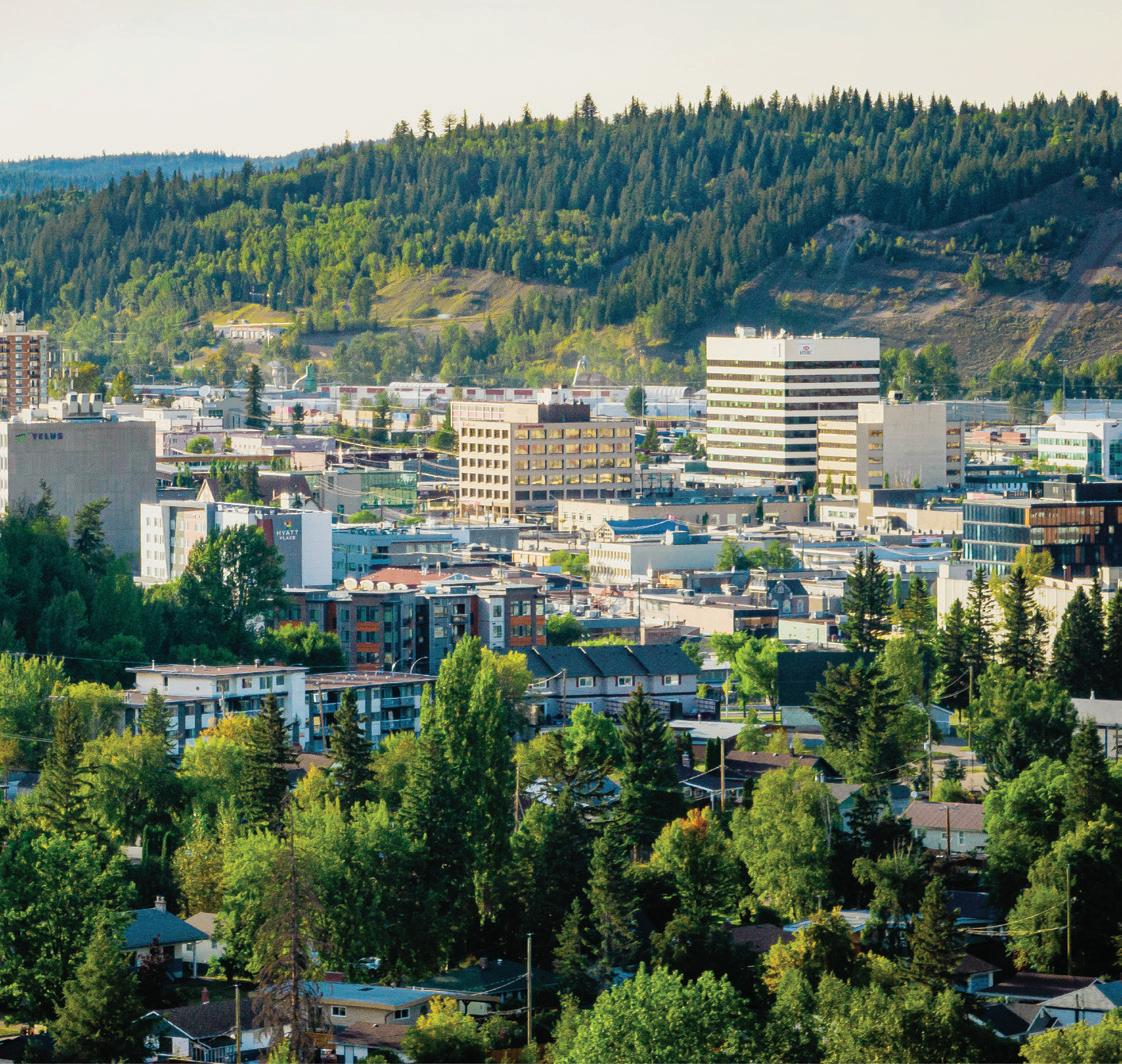
Good luck to all competing athletes, coaches, and families!
Stay in touch: follow the City on Facebook and Instagram, or visit our website at princegeorge.ca

Sport is the answer: The origins of Special Olympics
Dr. Frank Hayden noted that children with intellectual disabilities weren’t as physically fit as other kids, and started researching why — which eventually connected him with Eunice Kennedy Shriver and led to the launch of Special Olympics.
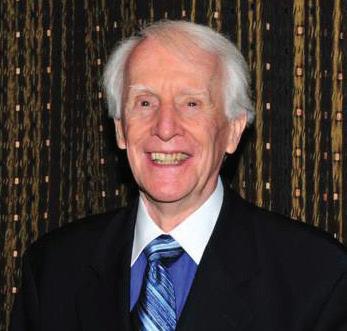
Special Olympics BC
In the early 1960s, a Toronto-based researcher named Dr. Frank Hayden began to change how the world viewed sport and people with intellectual disabilities.
As a faculty member at the Uni-
versity of Toronto, Hayden’s research revealed that children with intellectual disabilities were only half as physically fit as their peers without disabilities. At the time, it was widely assumed this was a direct consequence of their disability. Hayden challenged that
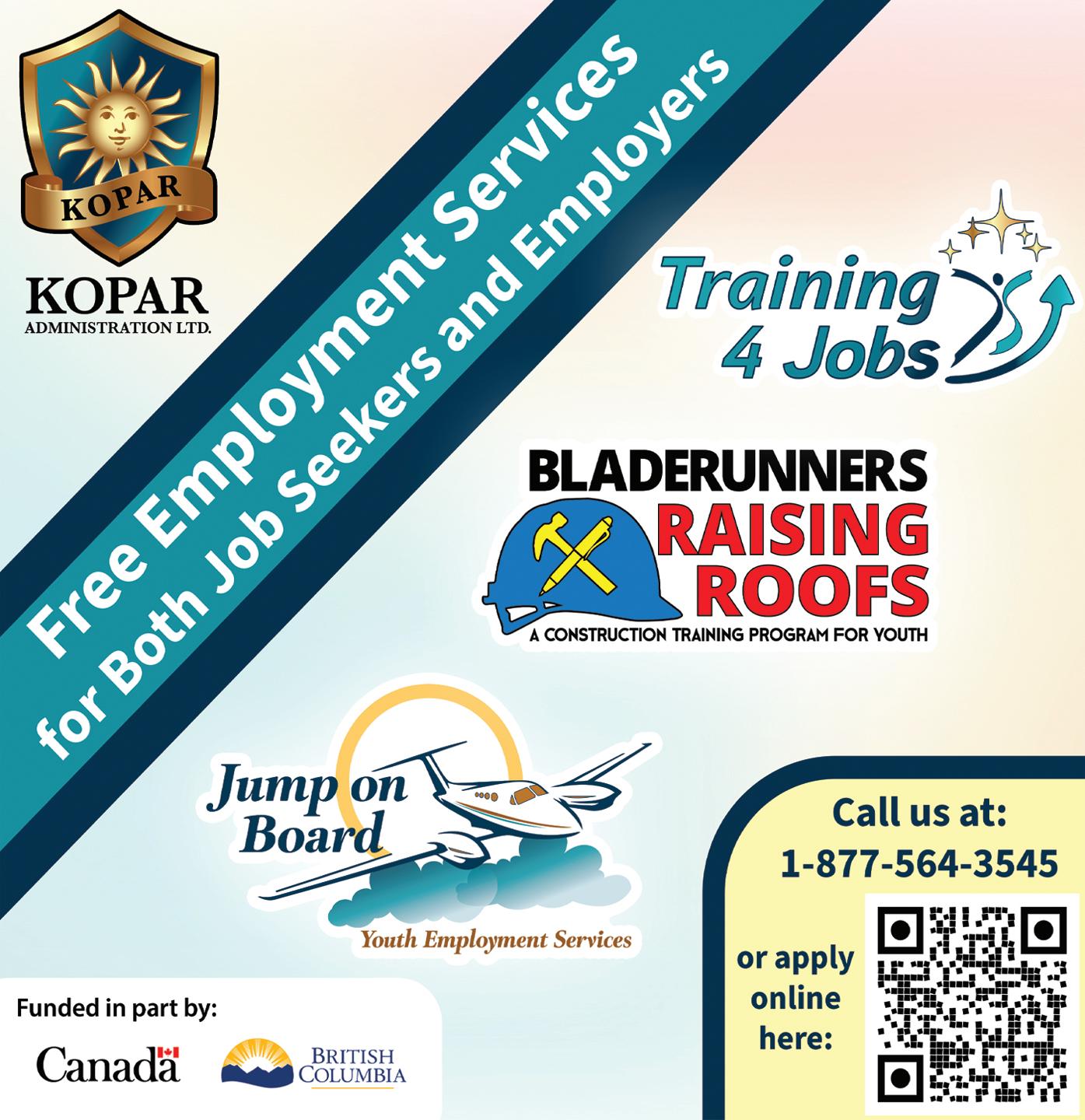
assumption, arguing that the lack of opportunity — not the disability itself — was to blame.
Through rigorous scientific study, he proved that, if given the chance, individuals with intellectual disabilities could acquire physical skills, become fit and thrive through sport. In short, sport could be a transformative force in their lives.
In 1964, he published a book containing sample lesson plans for educators. The book sold 50,000 copies — an impressive number for its time — and drew the attention of Harry “Red” Foster, a well-known Canadian broadcaster, philanthropist and advocate for people with intellectual disabilities.
Hayden and Foster worked together in hopes of launching a national sports program in Canada. Though their early efforts were not successful, it was the beginning of a powerful movement.
In 1965, Hayden received a call from the Kennedy Foundation in Washington, D.C.
Eunice Kennedy Shriver, sister of the late U.S. president John F. Kennedy, had taken note of Hayden’s re-search. She had already been hosting Camp Shriver, a summer camp for young people with intellectual disabilities held in her own backyard, and saw the value of
Hayden’s findings.
This collaboration led to the first International Special Olympics Games, held on July 20, 1968, at Soldier Field in Chicago. Athletes from 25 U.S. states competed, along with a Canadian floor hockey team made up of students from the Beverley School in Toronto.
Foster, who attended the Games, was profoundly moved by what he saw. “Frank, this is fantastic. We should have this in Canada,” he said.
Special Olympics Comes to Canada
Inspired by the event and determined to build a similar legacy at home, Foster worked tirelessly to bring the movement to Canada.
One year later, in 1969, the first Canadian Special Olympics Games were held in Toronto, marking the official beginning of the Special Olympics movement in this country.
Hayden continued to expand the movement not only in Canada and the United States but around the globe. He played a pivotal role in helping to establish 50 additional Special Olympics programs internationally.
Whether it was an elite athlete at the World Games or a five-yearold participating in Active Start, Hayden believed in the power of sport to transform lives.
SOBC PHOTO
“My idea wasn’t to find the fastest runner with an intellectual disability,” he said. “It was to make them fitter and healthier, so they have the opportunity to live their potential.”
Special Olympics in British Columbia
Special Olympics BC (SOBC) officially began in 1980, with just two weekends of games and about 500 participants. Today, it provides year-round, high-quality sports programs for more than 3,200 athletes with intellectual and developmental disabilities in 55 communities around the province.
These programs are made possible through the dedication of more than 1,800 trained volunteers.
In addition to sport, SOBC offers health and youth programs that help athletes develop skills, improve physical and mental health, and prepare for competitions at local, regional, national and inter-national levels. Athletes gain self-confidence, build friendships and experience joy, pride and a sense of belonging.
They also open minds and hearts in their communities, paving the way for greater inclusion and understanding.
A Visionary Leader: Eunice Kennedy Shriver
Eunice Kennedy Shriver, founder of Special Olympics, was a trailblazer in the fight for equality for people with intellectual disabilities. In the 1950s and ’60s, she saw how individuals with disabili-ties were excluded, institutionalized and neglected. She knew they deserved more — and that they had much to offer.
Her commitment was deeply personal. Her sister, Rosemary Kennedy, had an intellectual disability, and the sisters grew up playing sports together — swimming, sailing, skiing and playing football. But while Eunice would go on to compete in college sports, there were no similar opportunities available for Rosemary.
This inspired her to use sport as
a tool for inclusion. In 1962, she created Camp Shriver, a summer day camp held in her backyard in Maryland, where youth with intellectual disabilities could explore their potential in sport. Camp Shriver became the prototype for Special Olympics.
At the opening ceremony of the first Games in 1968, Shriver declared that the event had proven “a very fundamental fact”: that children with intellectual disabilities can be exceptional athletes and, “through sports, they can realize their potential for growth.” She pledged that Special Olympics would give them “the chance to play, the chance to compete and the chance to grow.”
Today, her vision lives on through Special Olympics International, which serves more than four million athletes through 256 national and state chapters worldwide.
Frank Hayden: Honours and Legacy Throughout his life, Frank Hayden received numerous accolades for his groundbreaking work. In 1999, he was appointed an Officer of the Order of Canada. In 2019, he was inducted into Canada’s Sports Hall of Fame.
In 2022, he was promoted to Companion of the Order of Canada, the highest level of the country’s highest civilian honour. And in 2024, he received a star on Canada’s Walk of Fame.
In 2018, Special Olympics Canada endowed the Dr. Frank J. Hayden Chair in Sport and Social Impact at Western University. Alongside the endowment, Hayden donated key documents — research, correspondence, photographs and historical records — that helped form the foundation of the global Special Olympics movement.
Hayden’s impact is still felt in communities across Canada and around the world. From grassroots programs to elite international competition, his belief remains a guiding principle of the movement:
“Sport is the answer.”


Good Luck & Enjoy Your Events!





Welcoming Athletes Welcoming Athletes
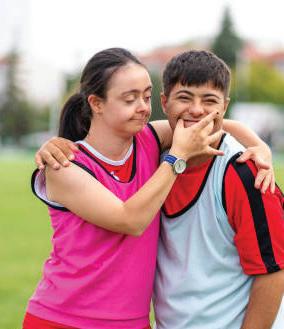
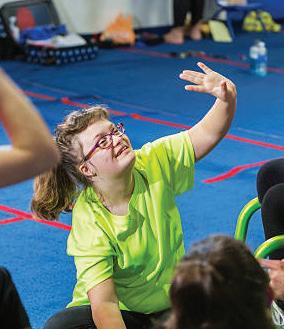
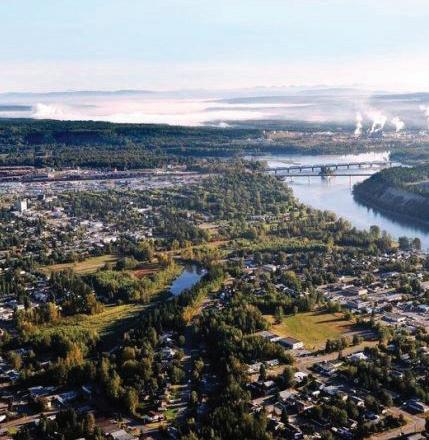
from around the province to Prince George
Proud to be a Presenting Sponsor
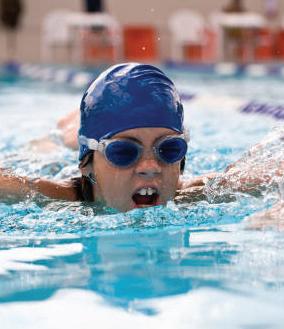
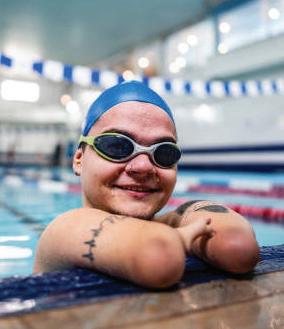
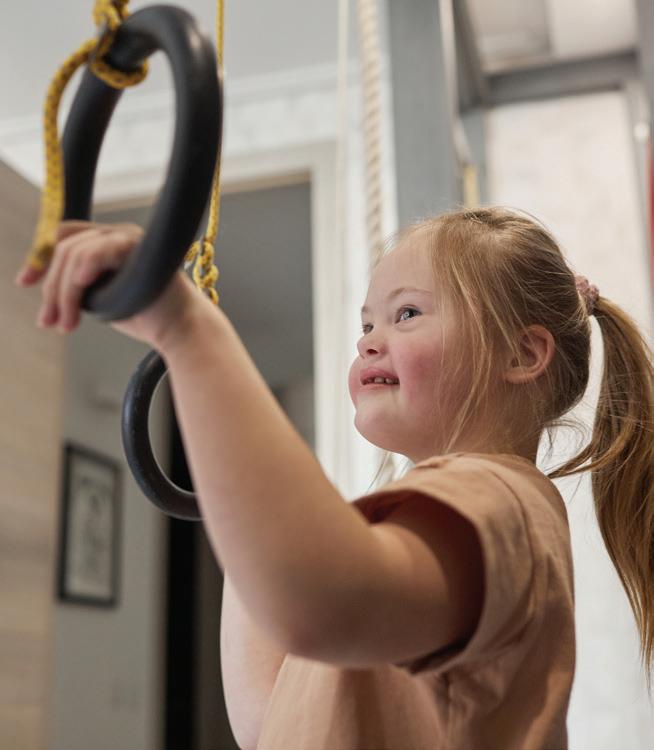

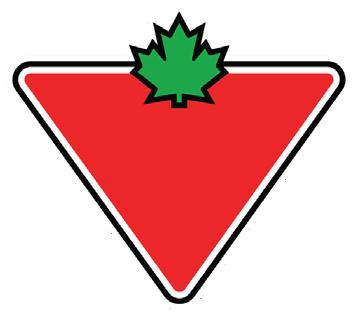
Caring for our community
